Introduction to Serverless PHP Rob Allen February 2019
A presentation at PHPSW in February 2019 in Bristol, UK by Rob Allen

Introduction to Serverless PHP Rob Allen February 2019

Platform options Rob Allen ~ @akrabat

Platform options Rob Allen ~ @akrabat

Platform options Rob Allen ~ @akrabat

Platform options Rob Allen ~ @akrabat
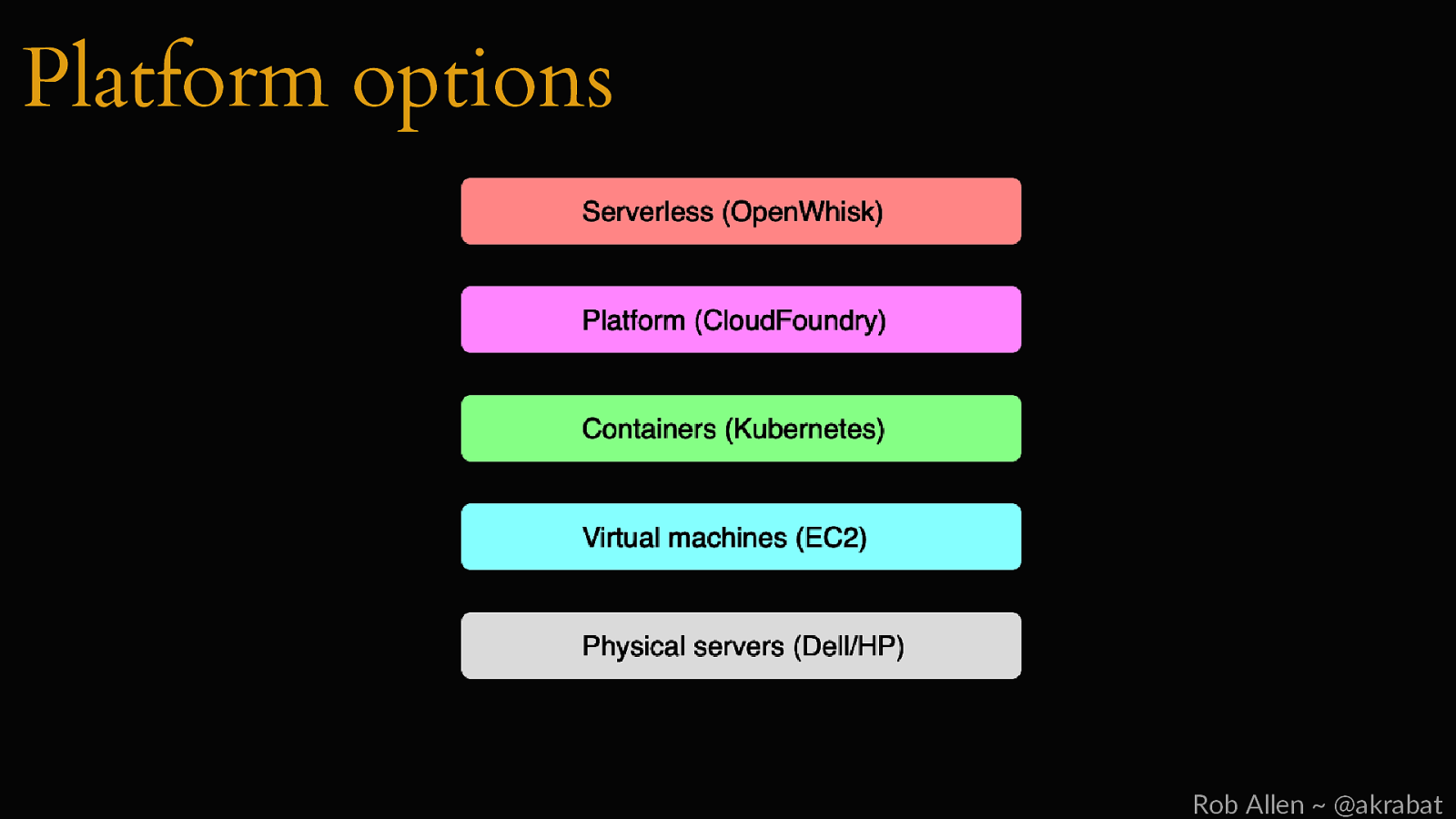
Platform options Rob Allen ~ @akrabat

Platform options Rob Allen ~ @akrabat

Platform options Rob Allen ~ @akrabat
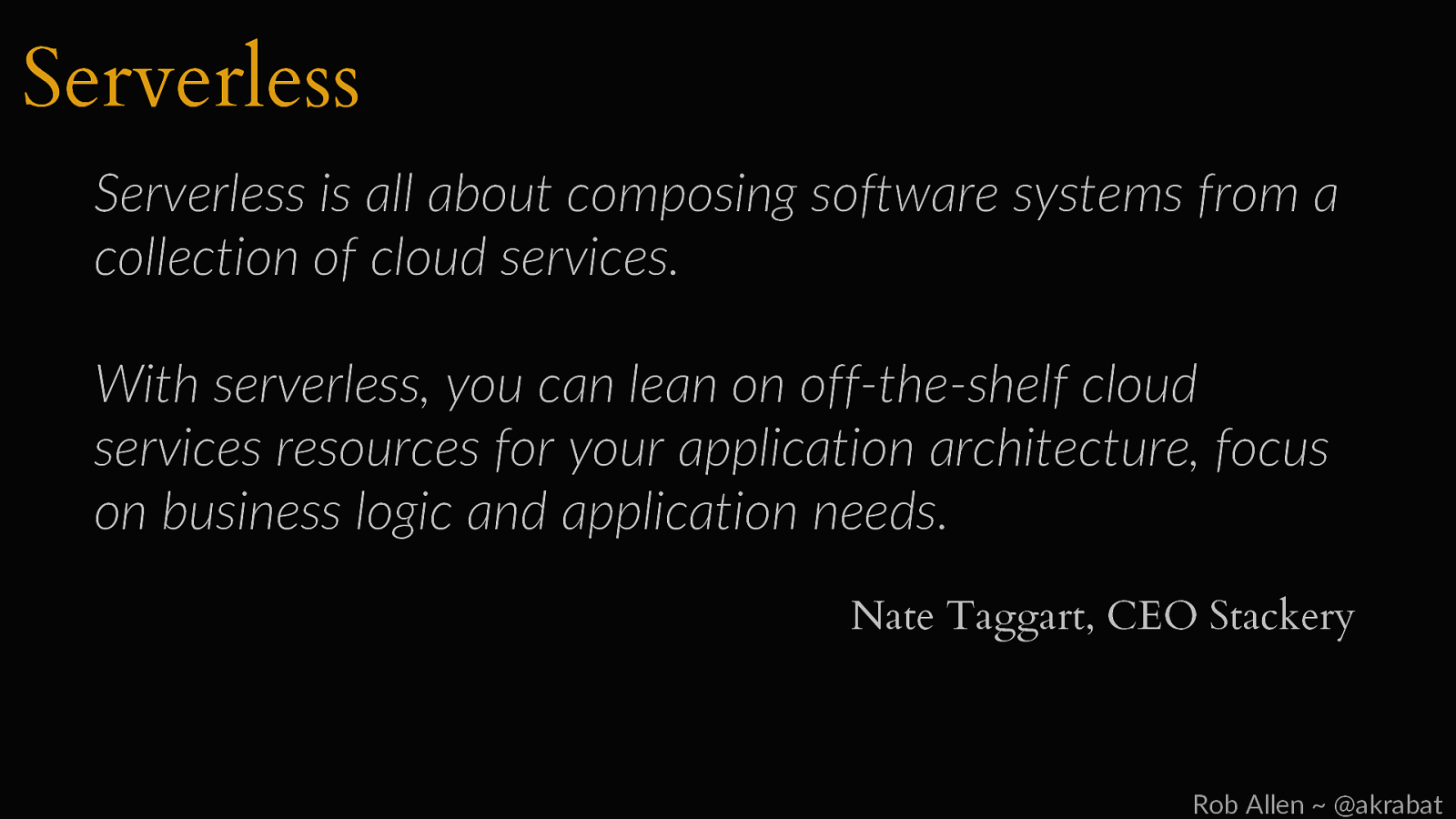
Serverless Serverless is all about composing software systems from a collection of cloud services. With serverless, you can lean on off-the-shelf cloud services resources for your application architecture, focus on business logic and application needs. Nate Taggart, CEO Stackery Rob Allen ~ @akrabat
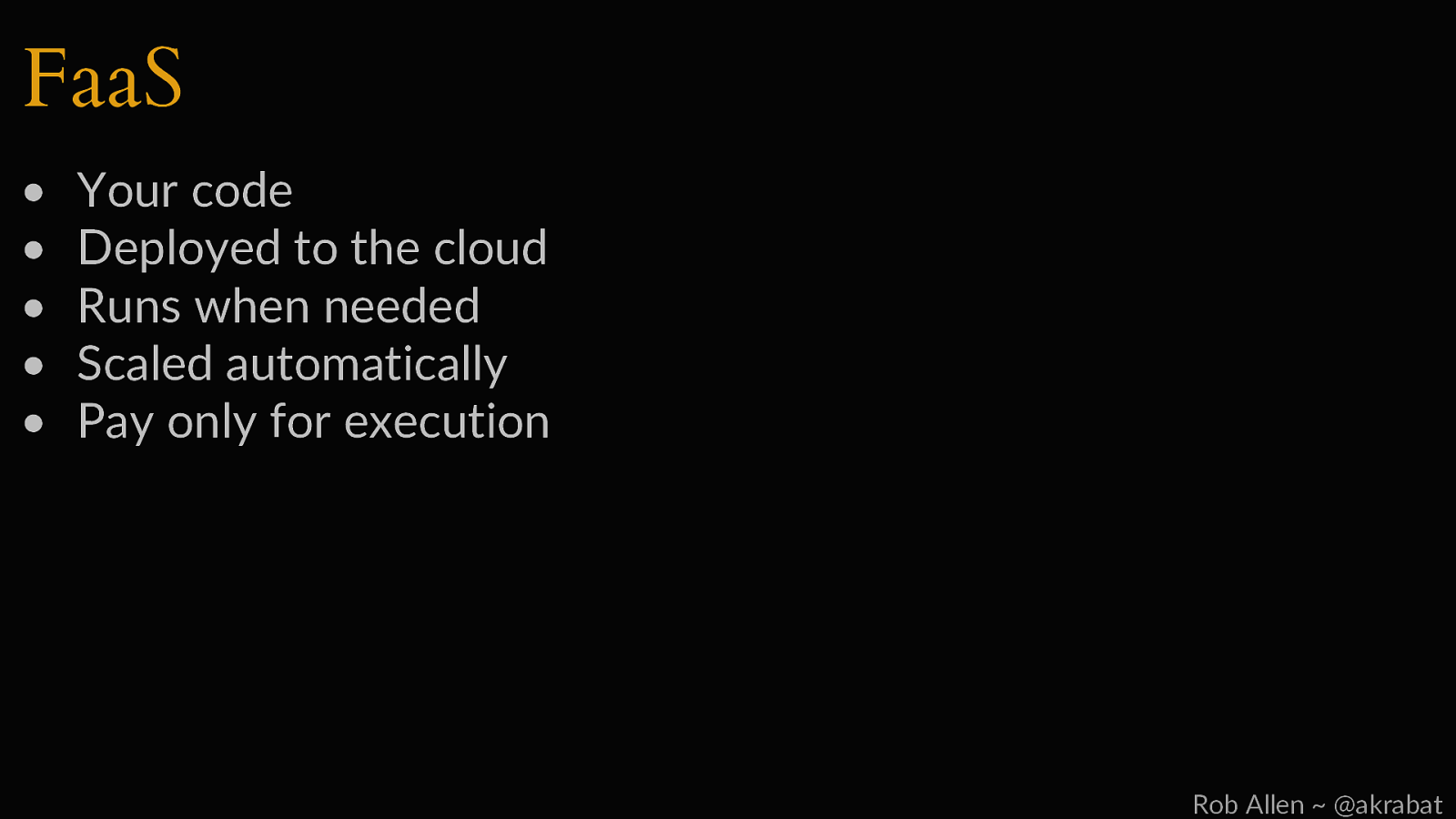
FaaS • • • • • Your code Deployed to the cloud Runs when needed Scaled automatically Pay only for execution Rob Allen ~ @akrabat
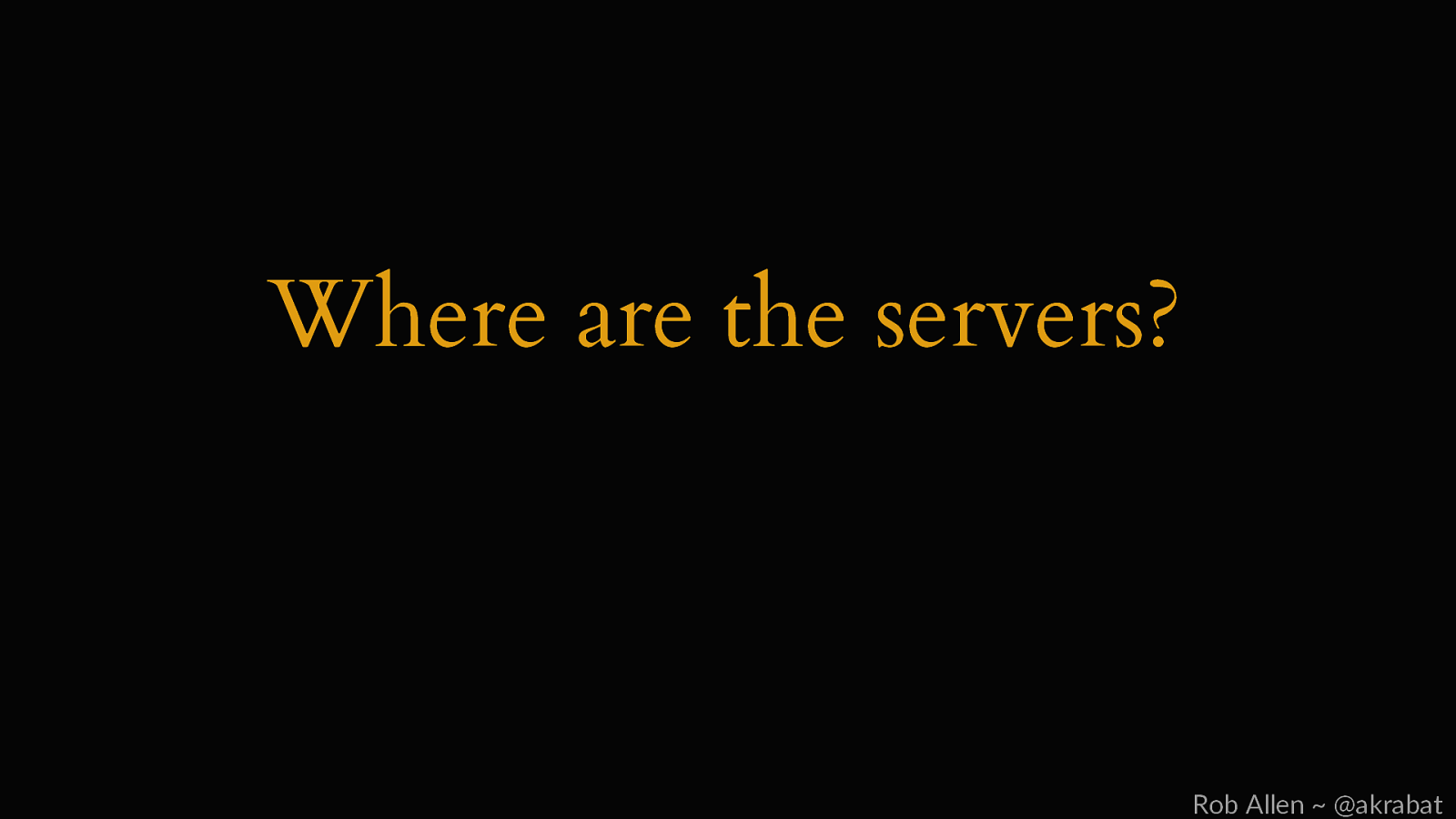
Where are the servers? Rob Allen ~ @akrabat

Rob Allen ~ @akrabat

Rob Allen ~ @akrabat
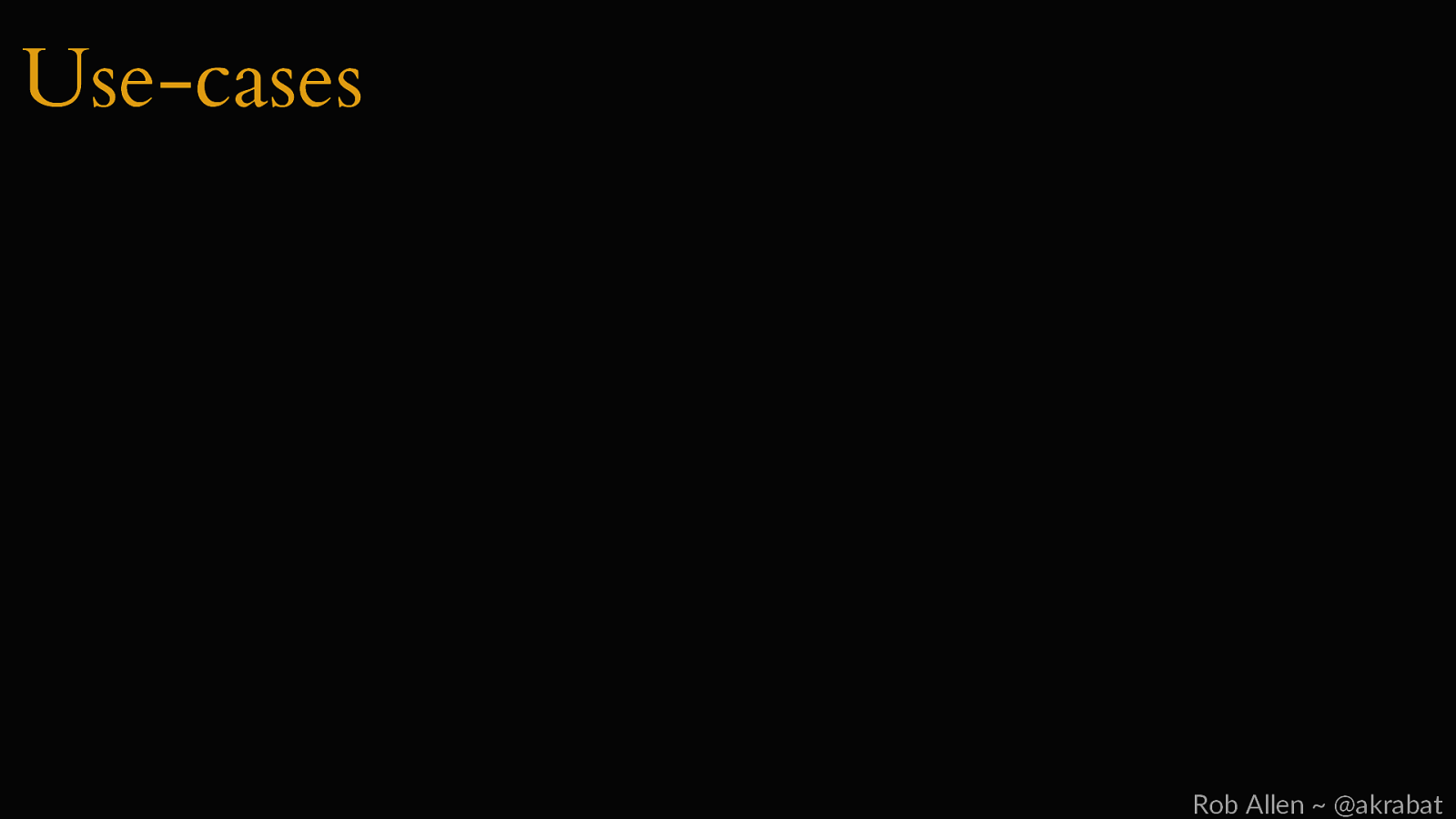
Use-cases Rob Allen ~ @akrabat

Use-cases Synchronous Service is invoked and provides immediate response (HTTP requests: APIs, chat bots) Rob Allen ~ @akrabat
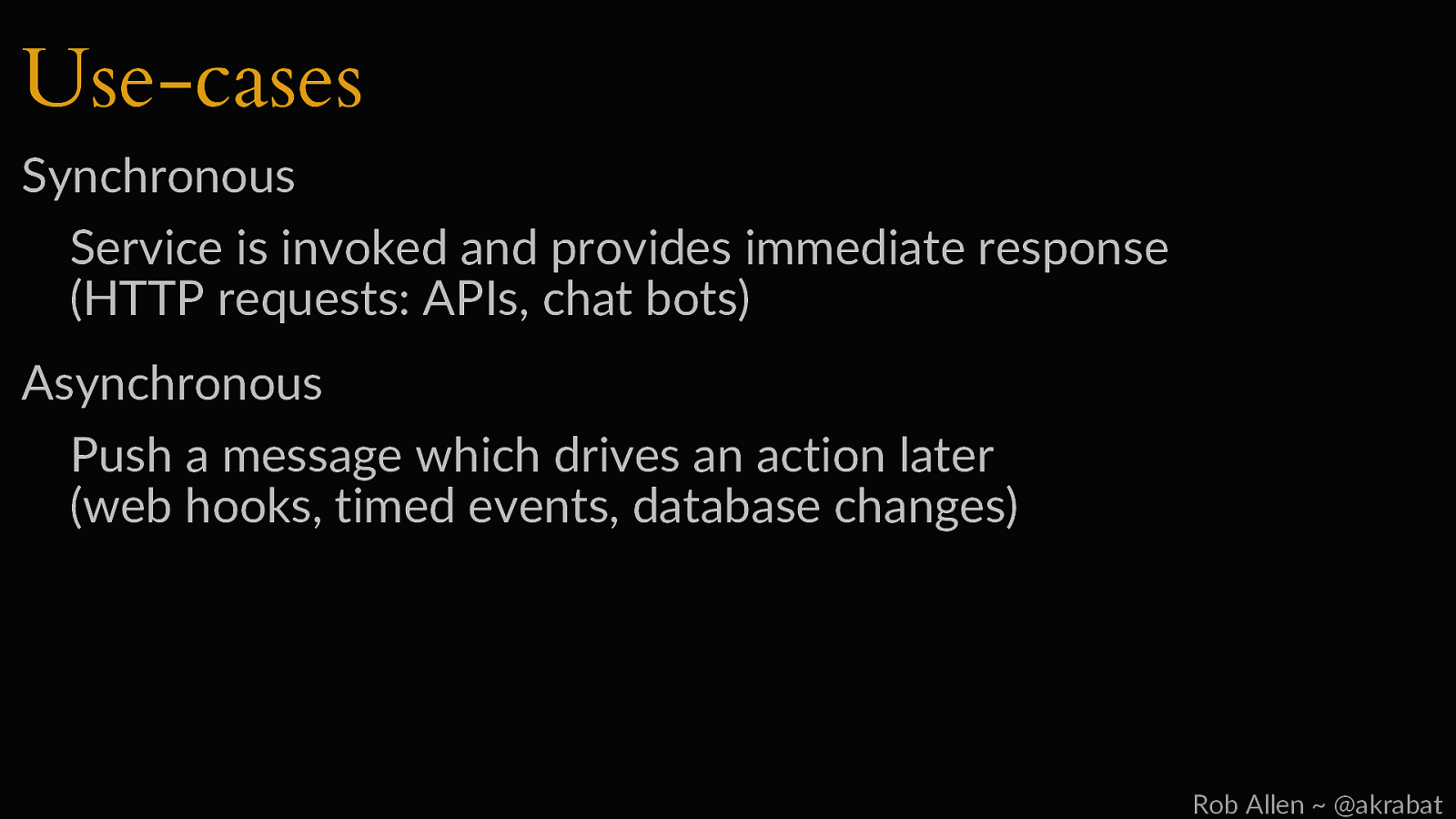
Use-cases Synchronous Service is invoked and provides immediate response (HTTP requests: APIs, chat bots) Asynchronous Push a message which drives an action later (web hooks, timed events, database changes) Rob Allen ~ @akrabat

Benefits Rob Allen ~ @akrabat
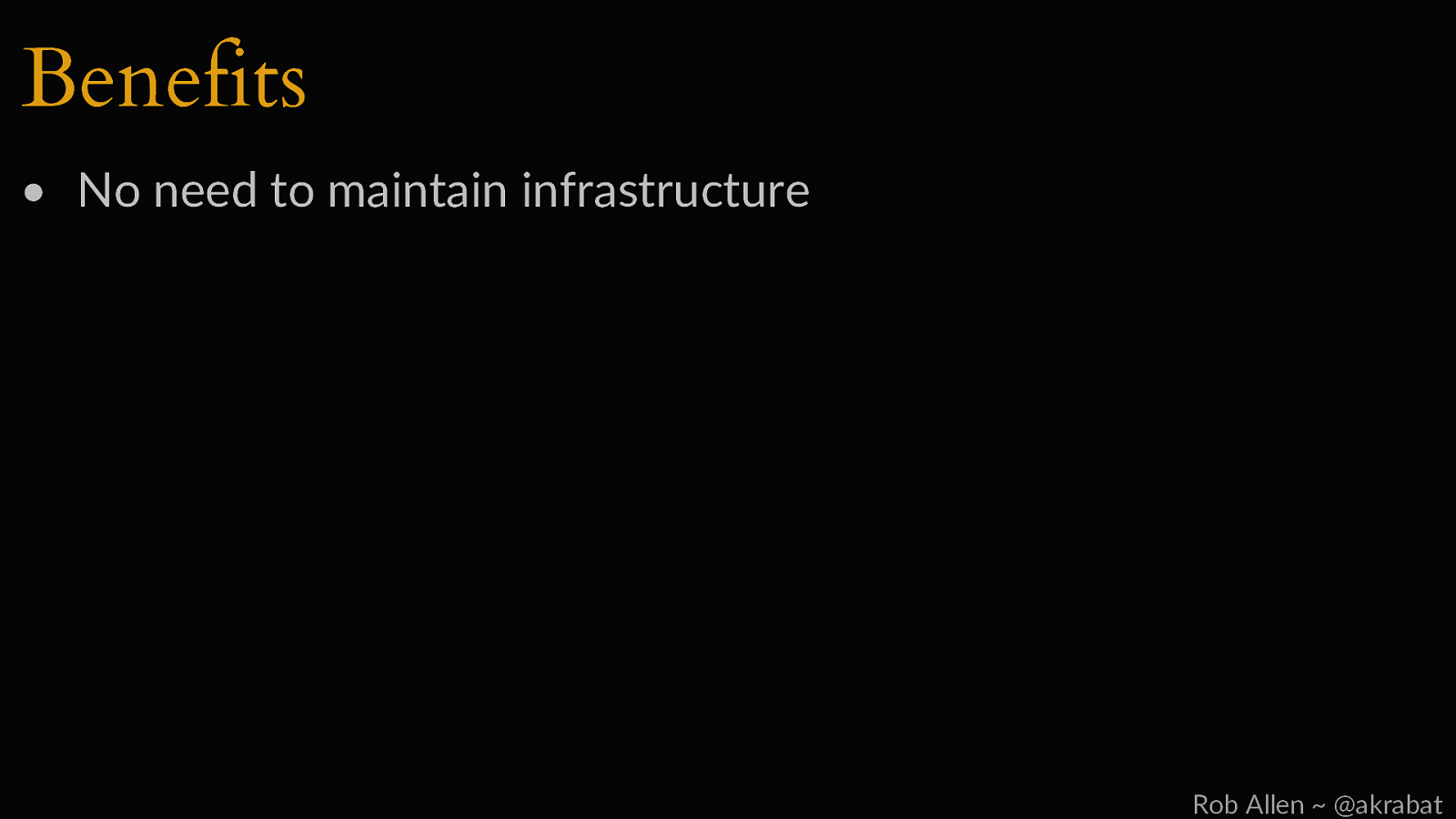
Benefits • No need to maintain infrastructure Rob Allen ~ @akrabat
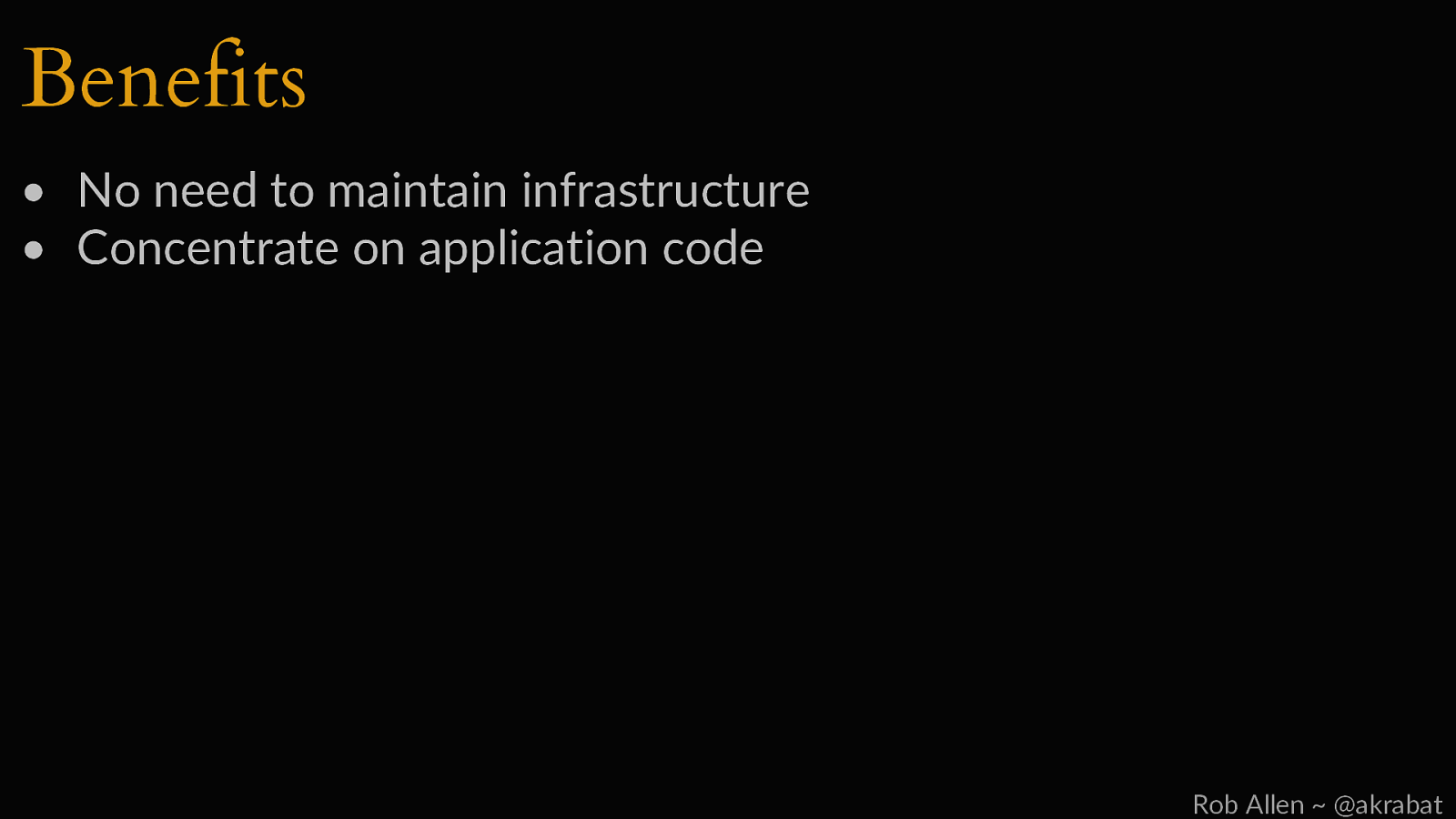
Benefits • No need to maintain infrastructure • Concentrate on application code Rob Allen ~ @akrabat
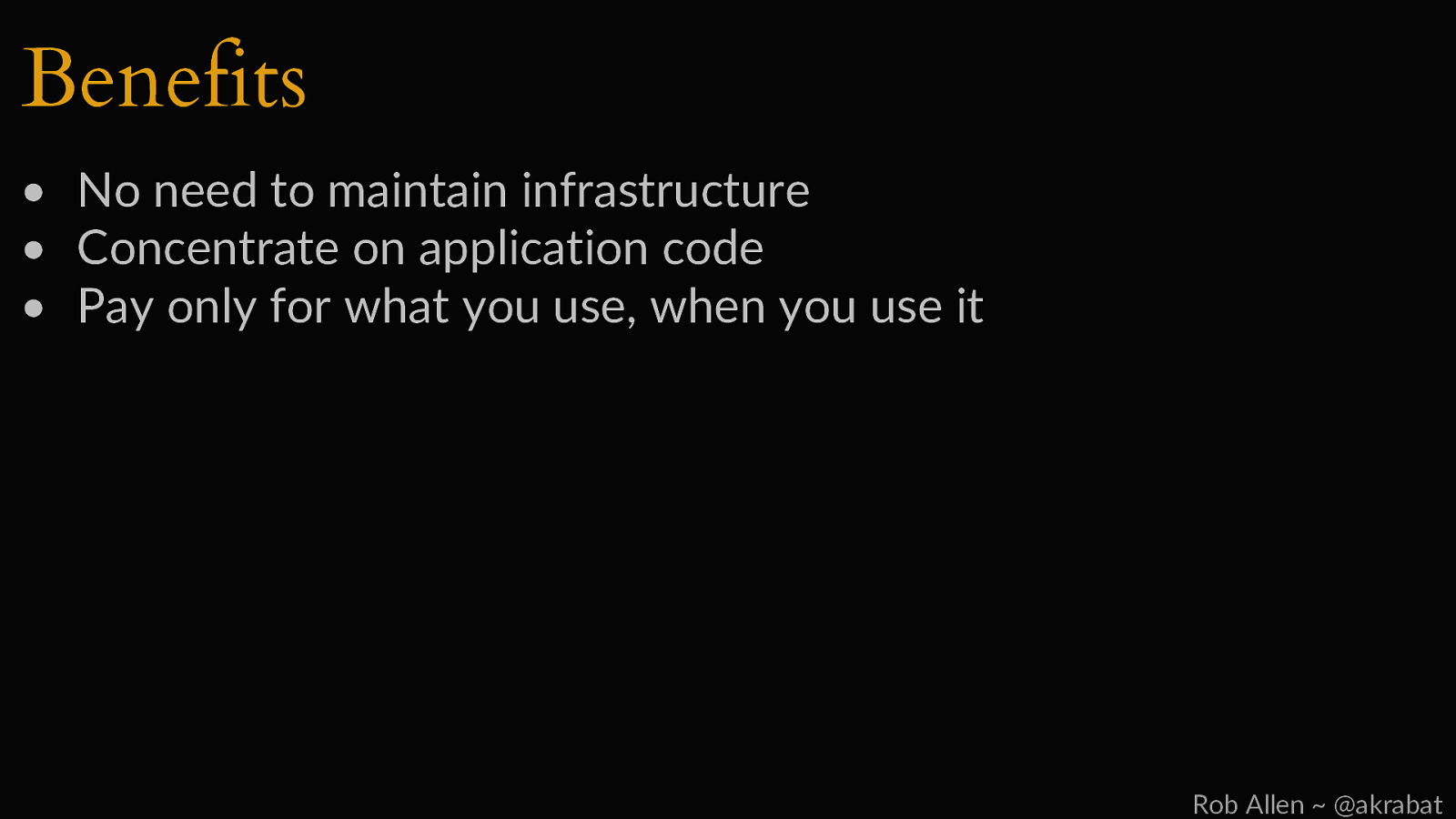
Benefits • No need to maintain infrastructure • Concentrate on application code • Pay only for what you use, when you use it Rob Allen ~ @akrabat
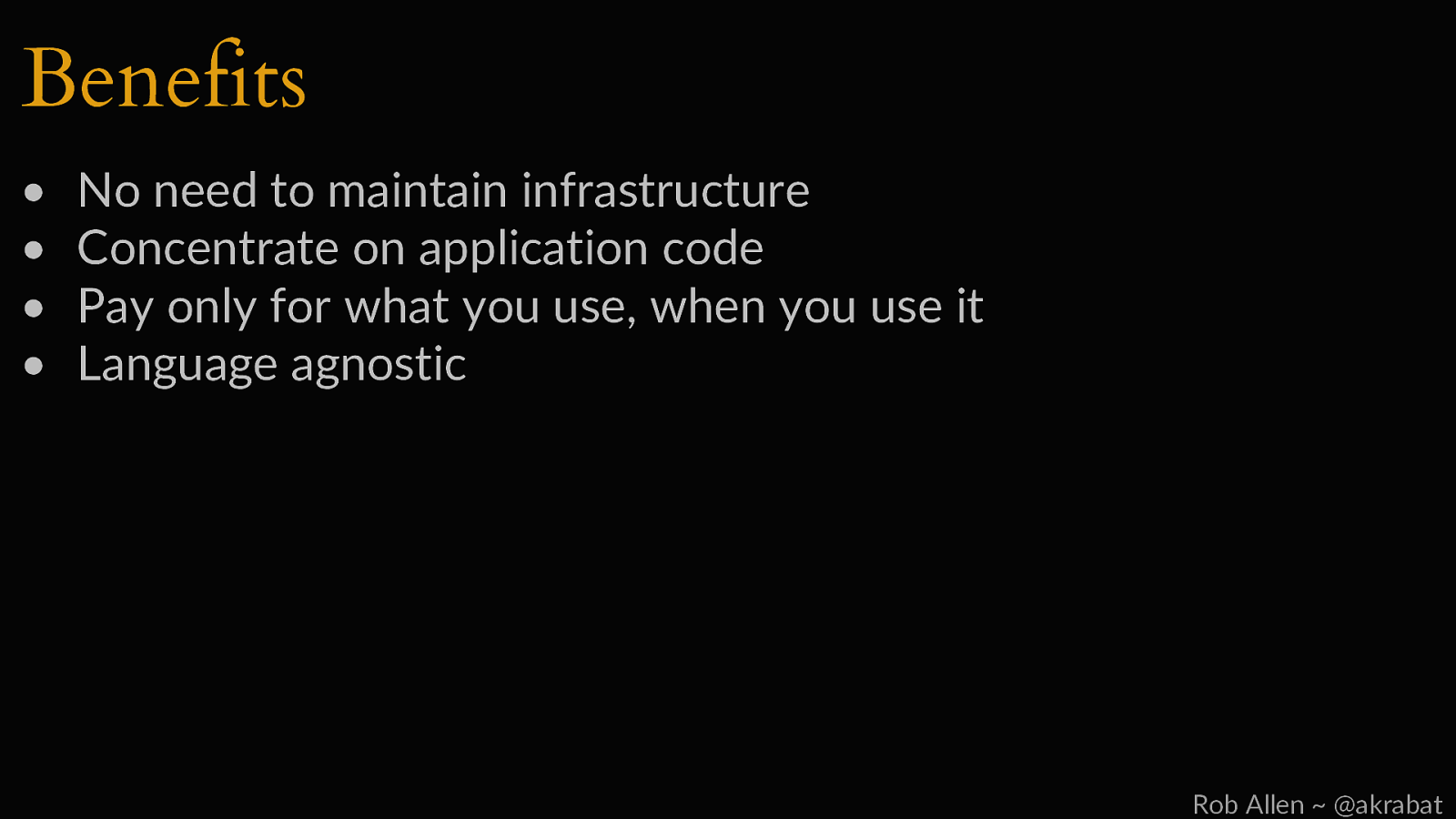
Benefits • • • • No need to maintain infrastructure Concentrate on application code Pay only for what you use, when you use it Language agnostic Rob Allen ~ @akrabat

Challenges Rob Allen ~ @akrabat
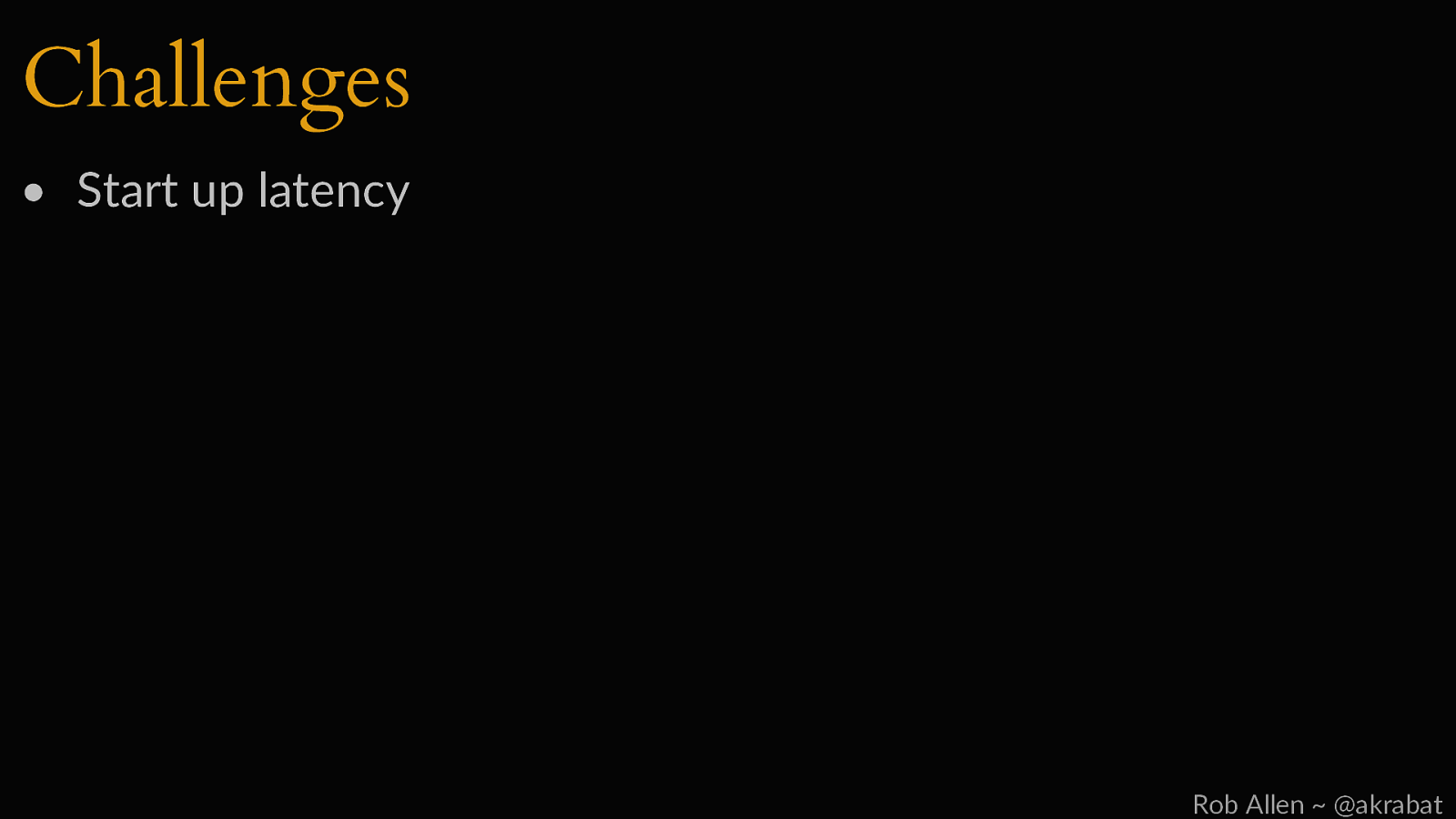
Challenges • Start up latency Rob Allen ~ @akrabat
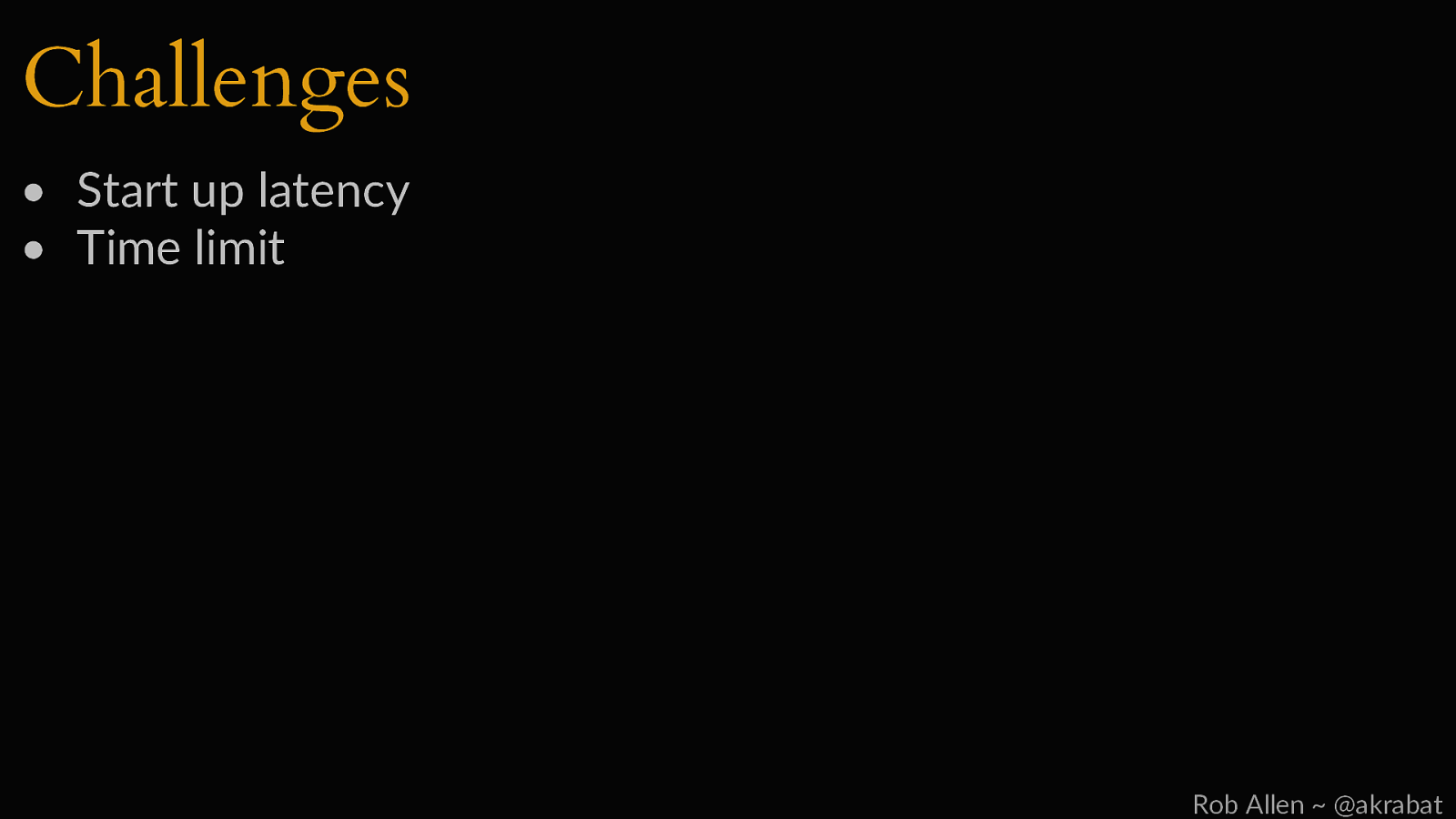
Challenges • Start up latency • Time limit Rob Allen ~ @akrabat
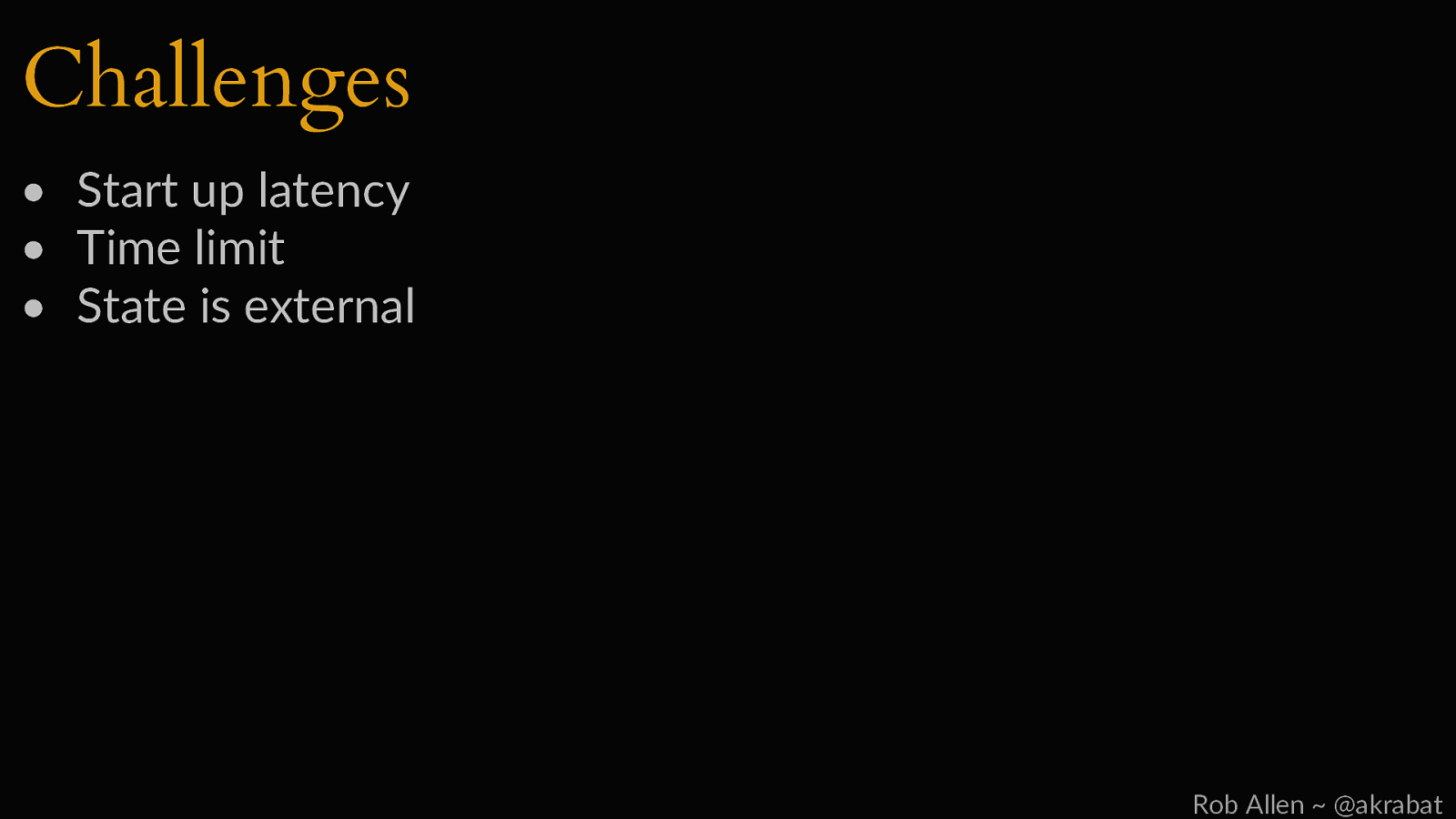
Challenges • Start up latency • Time limit • State is external Rob Allen ~ @akrabat
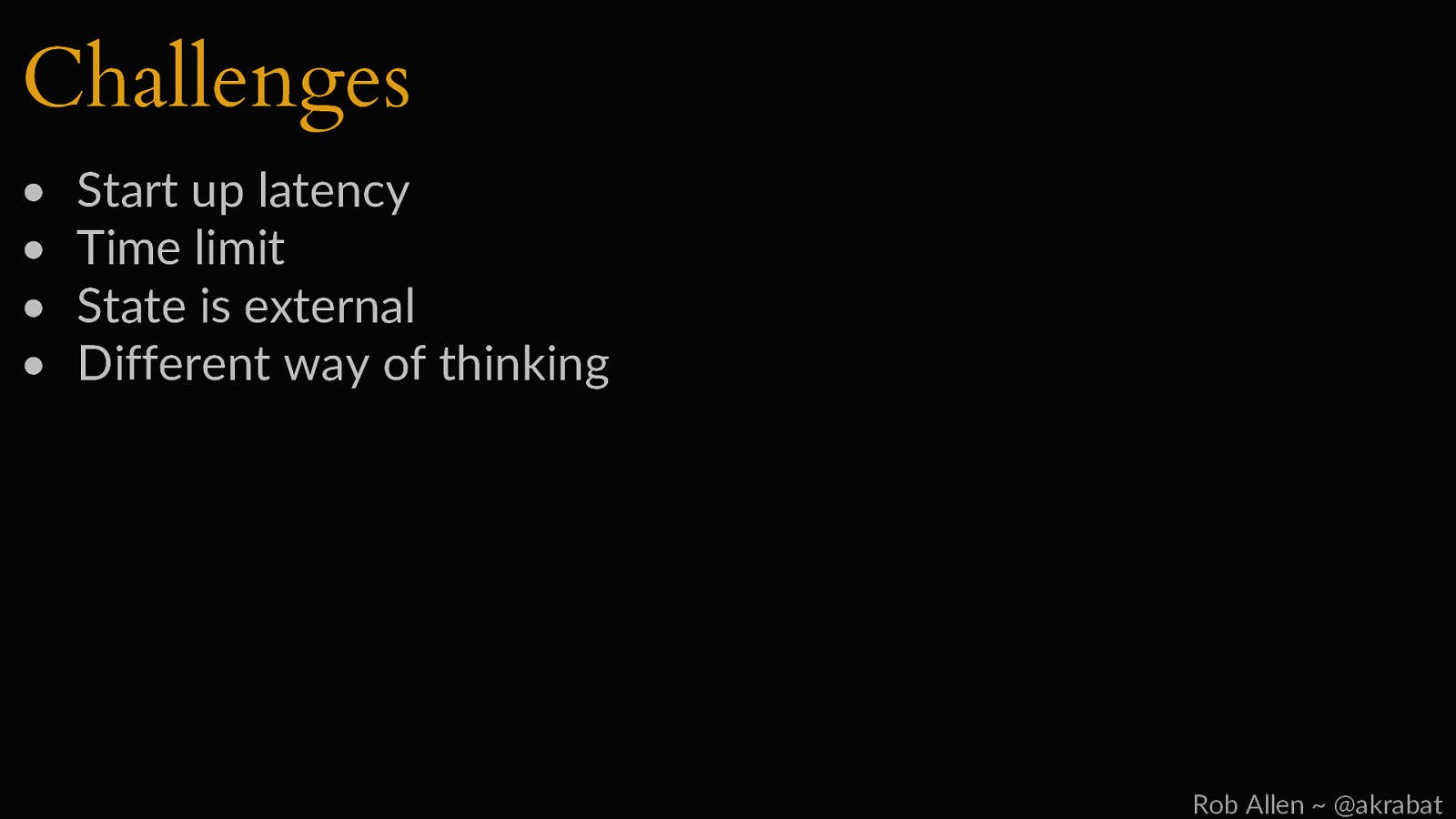
Challenges • • • • Start up latency Time limit State is external Different way of thinking Rob Allen ~ @akrabat
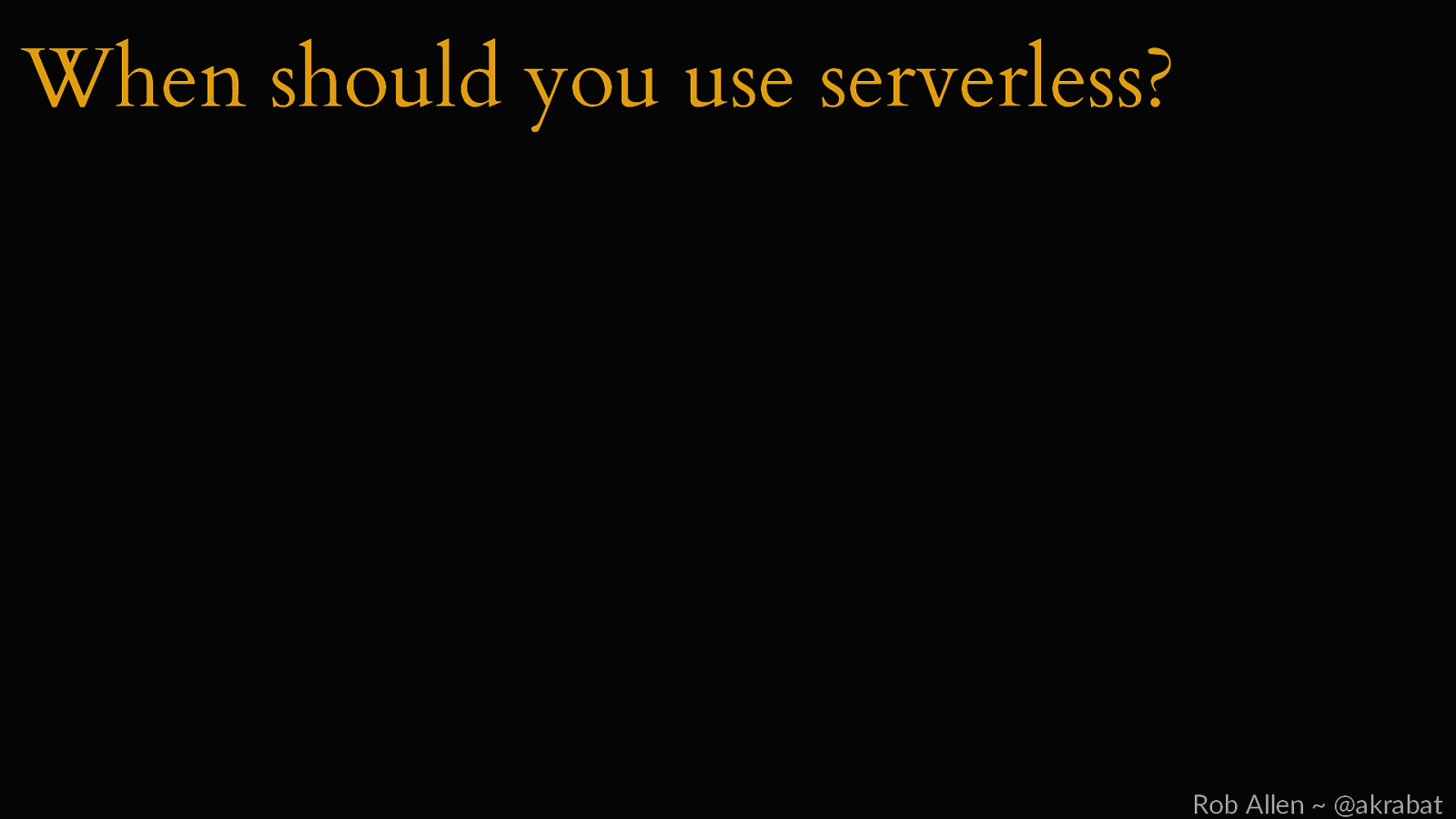
When should you use serverless? Rob Allen ~ @akrabat
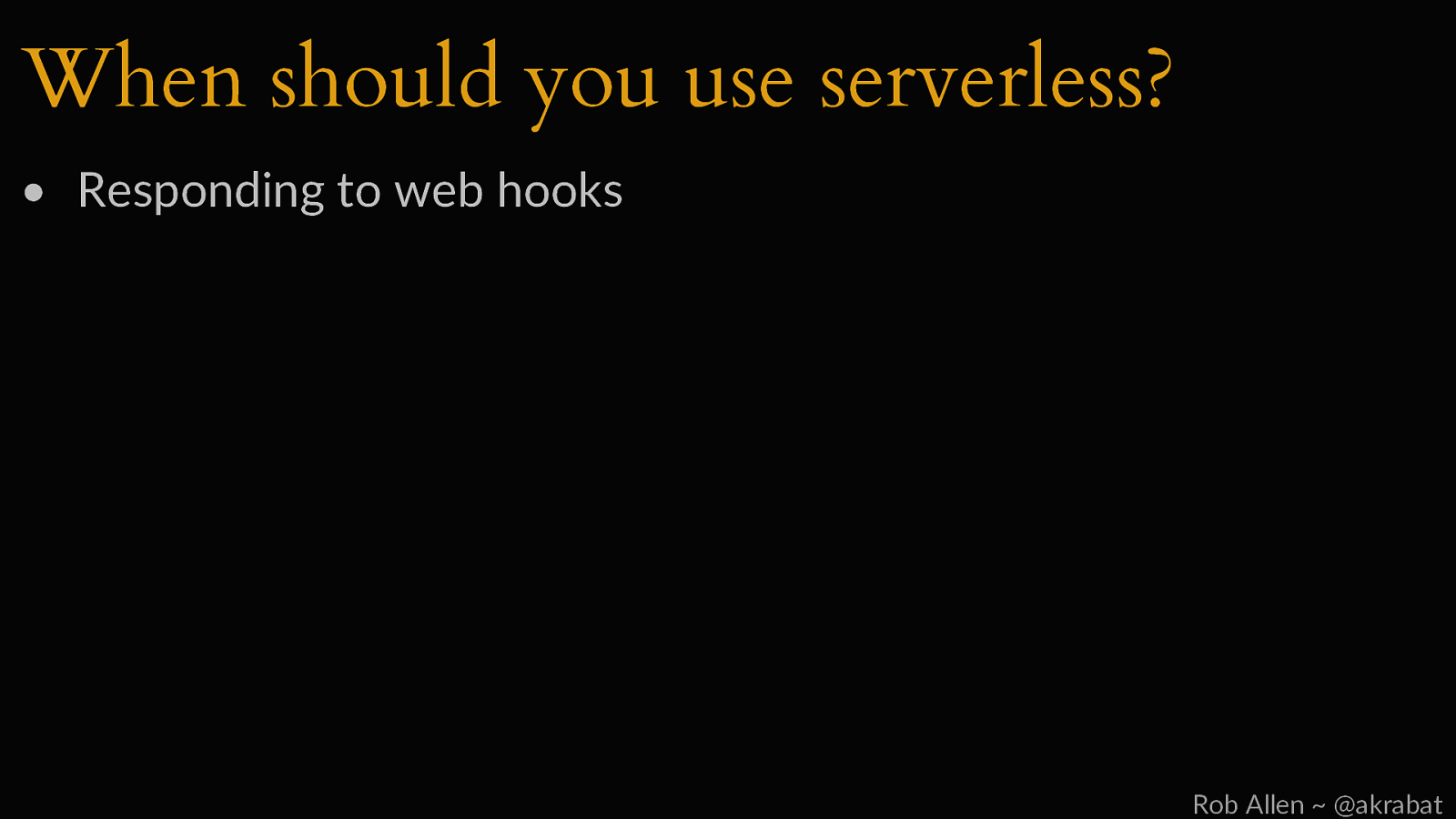
When should you use serverless? • Responding to web hooks Rob Allen ~ @akrabat
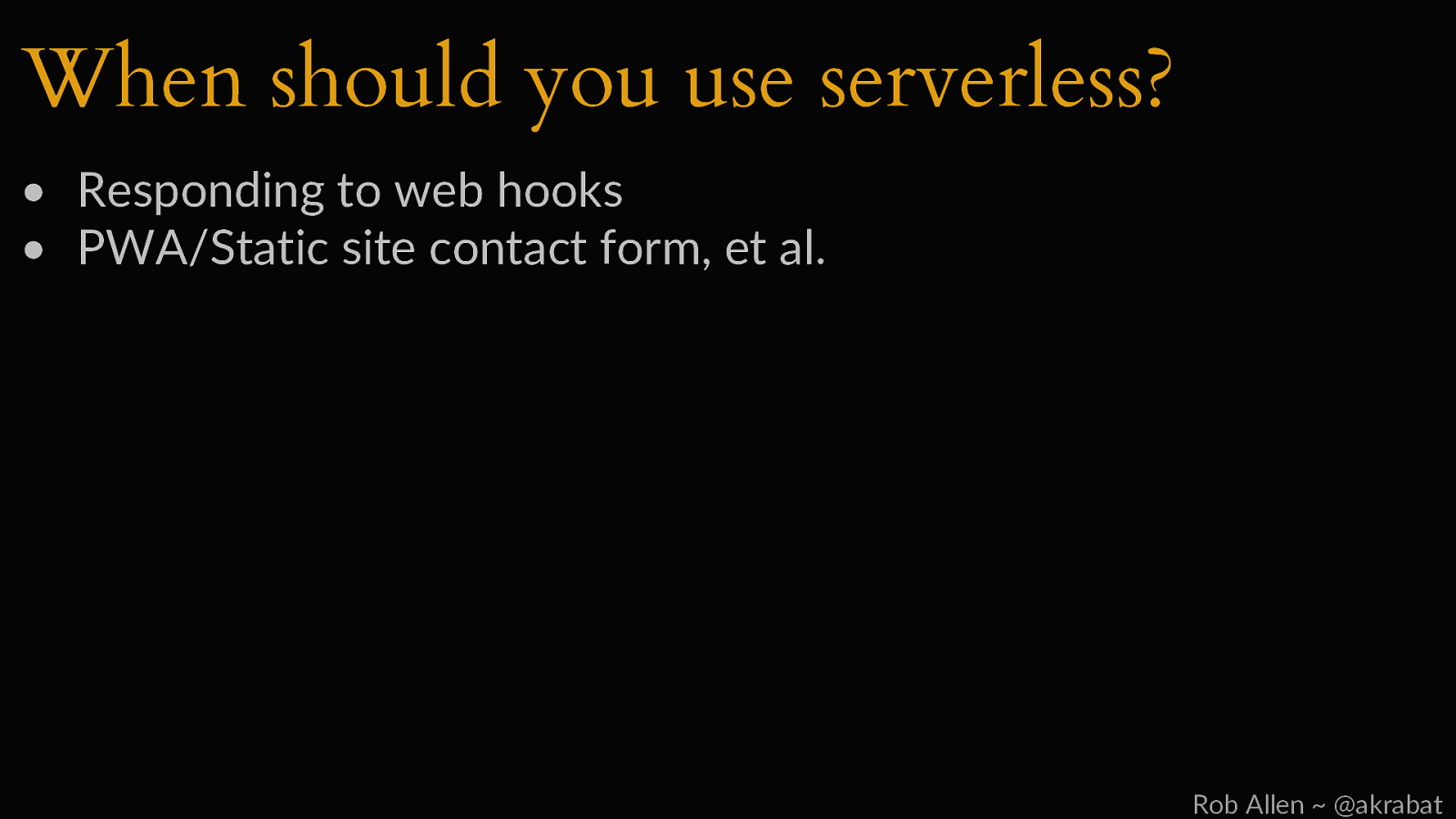
When should you use serverless? • Responding to web hooks • PWA/Static site contact form, et al. Rob Allen ~ @akrabat
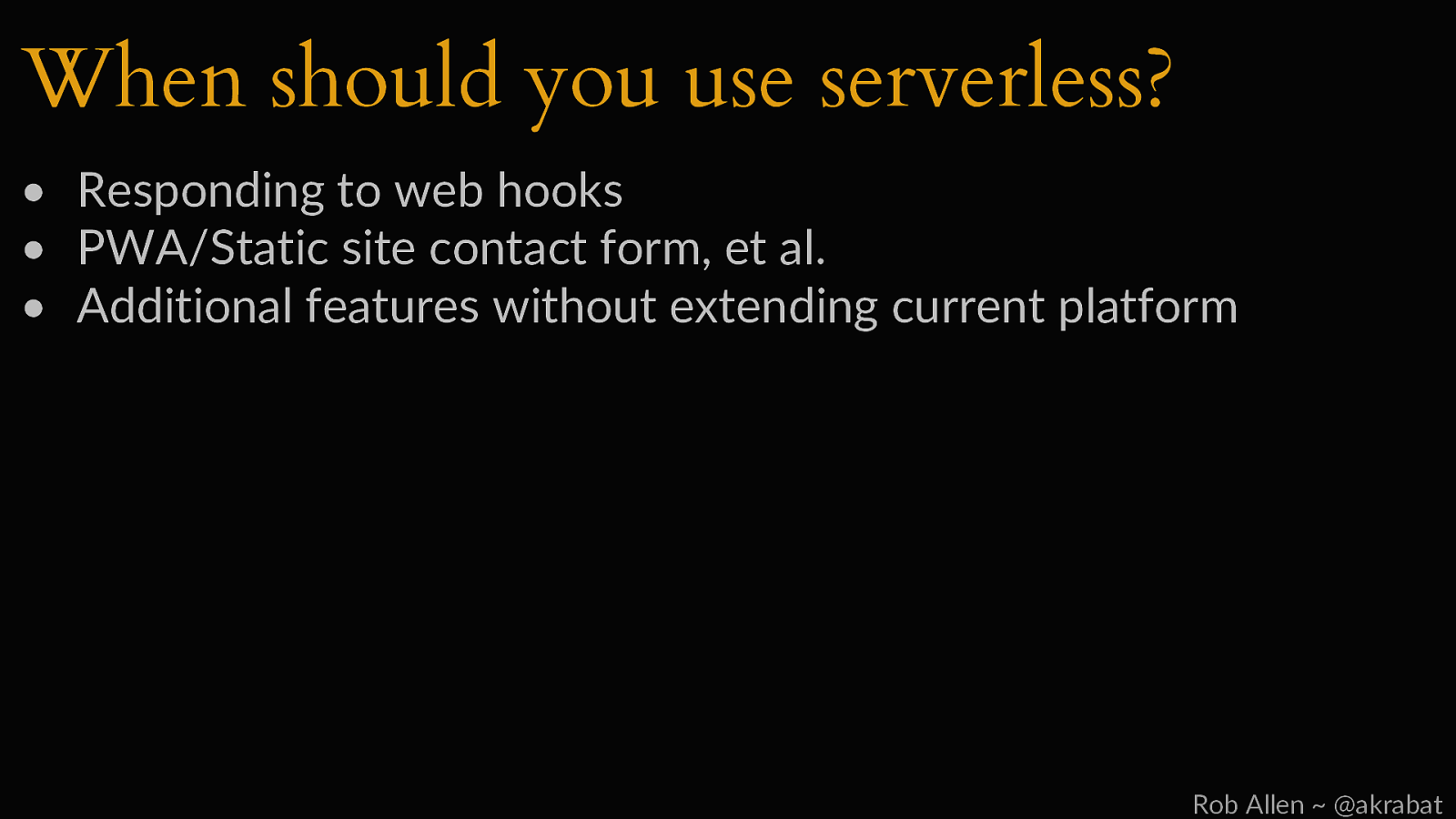
When should you use serverless? • Responding to web hooks • PWA/Static site contact form, et al. • Additional features without extending current platform Rob Allen ~ @akrabat
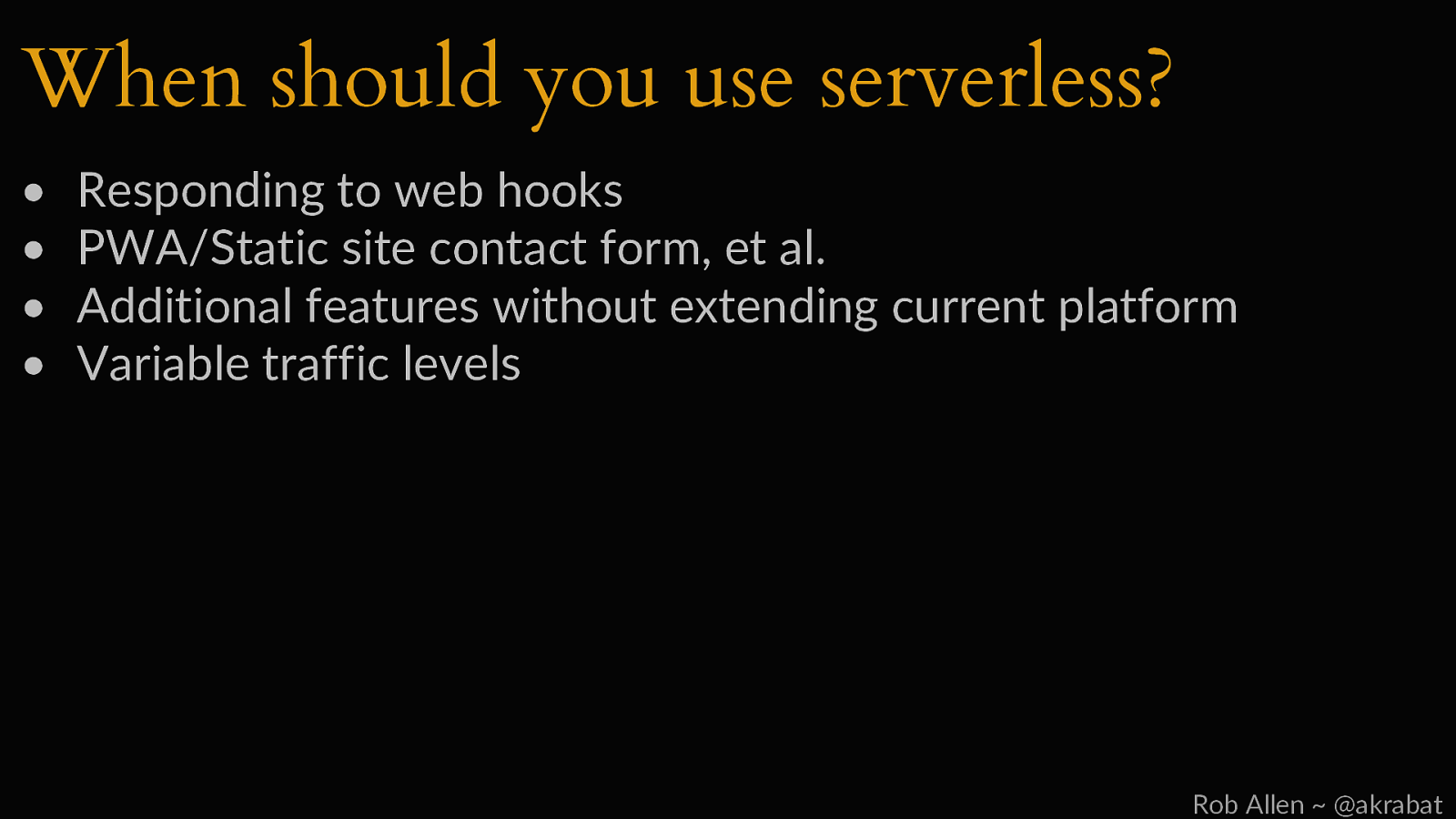
When should you use serverless? • • • • Responding to web hooks PWA/Static site contact form, et al. Additional features without extending current platform Variable traffic levels Rob Allen ~ @akrabat
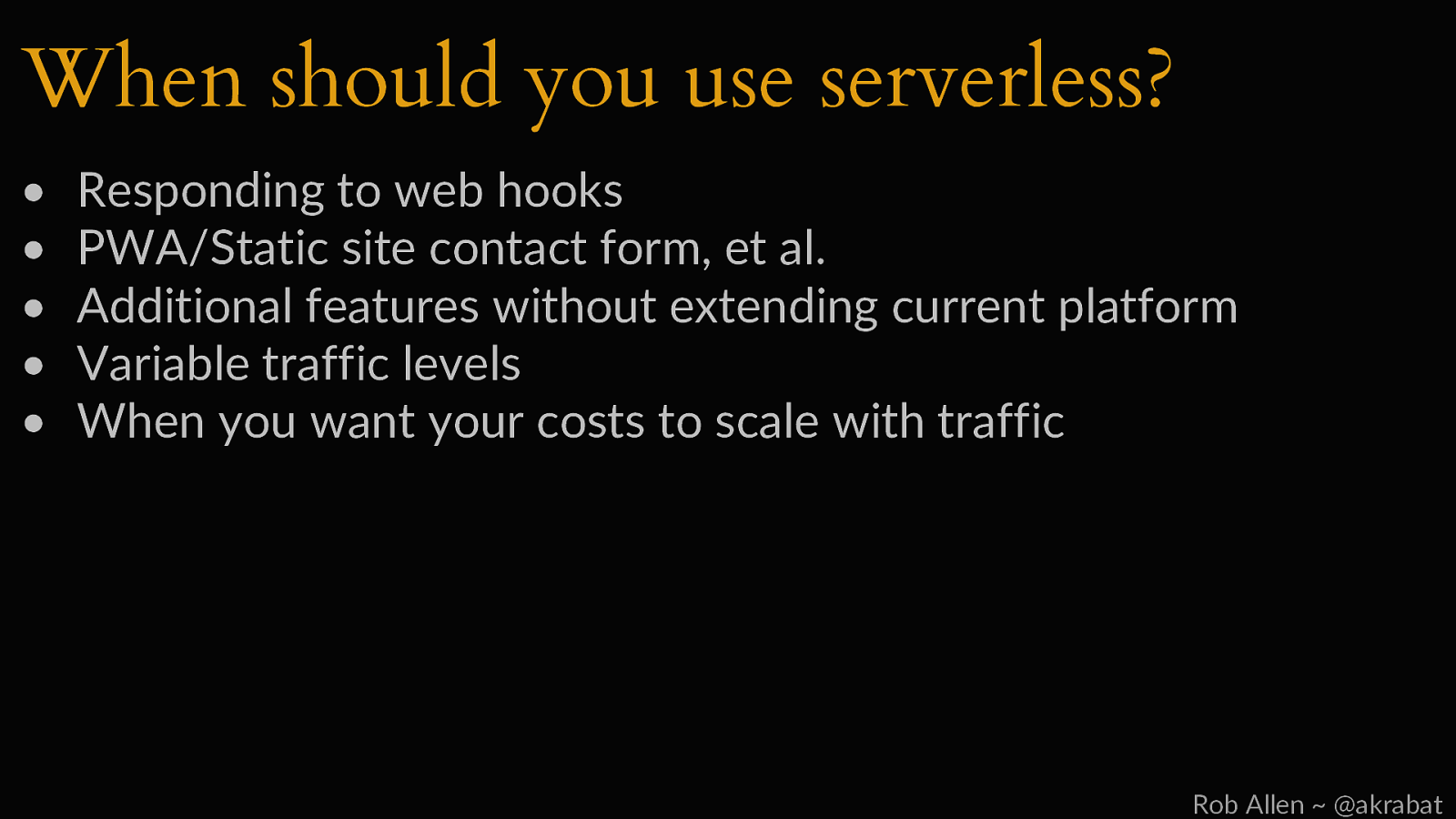
When should you use serverless? • • • • • Responding to web hooks PWA/Static site contact form, et al. Additional features without extending current platform Variable traffic levels When you want your costs to scale with traffic Rob Allen ~ @akrabat
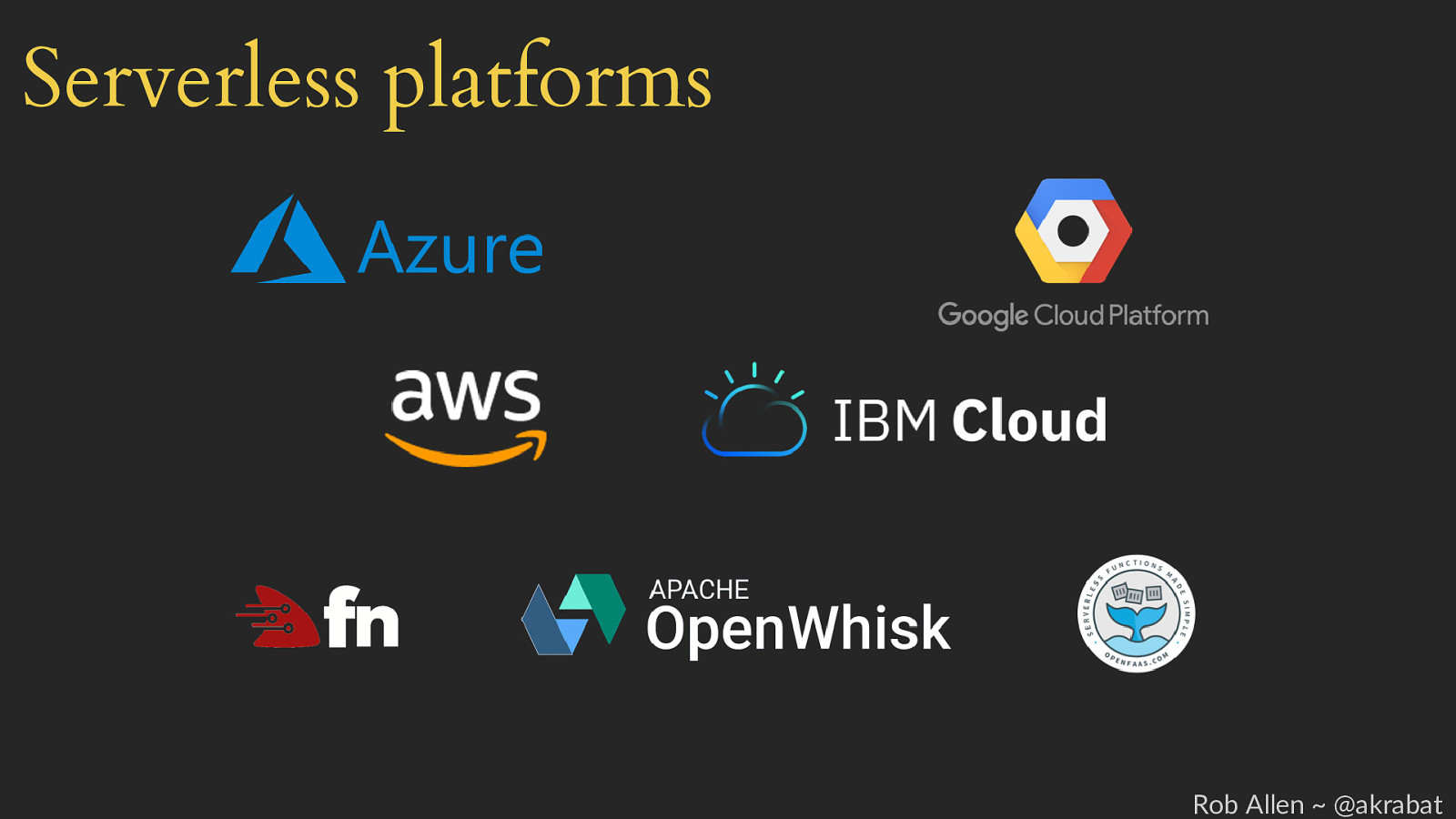
Serverless platforms Rob Allen ~ @akrabat
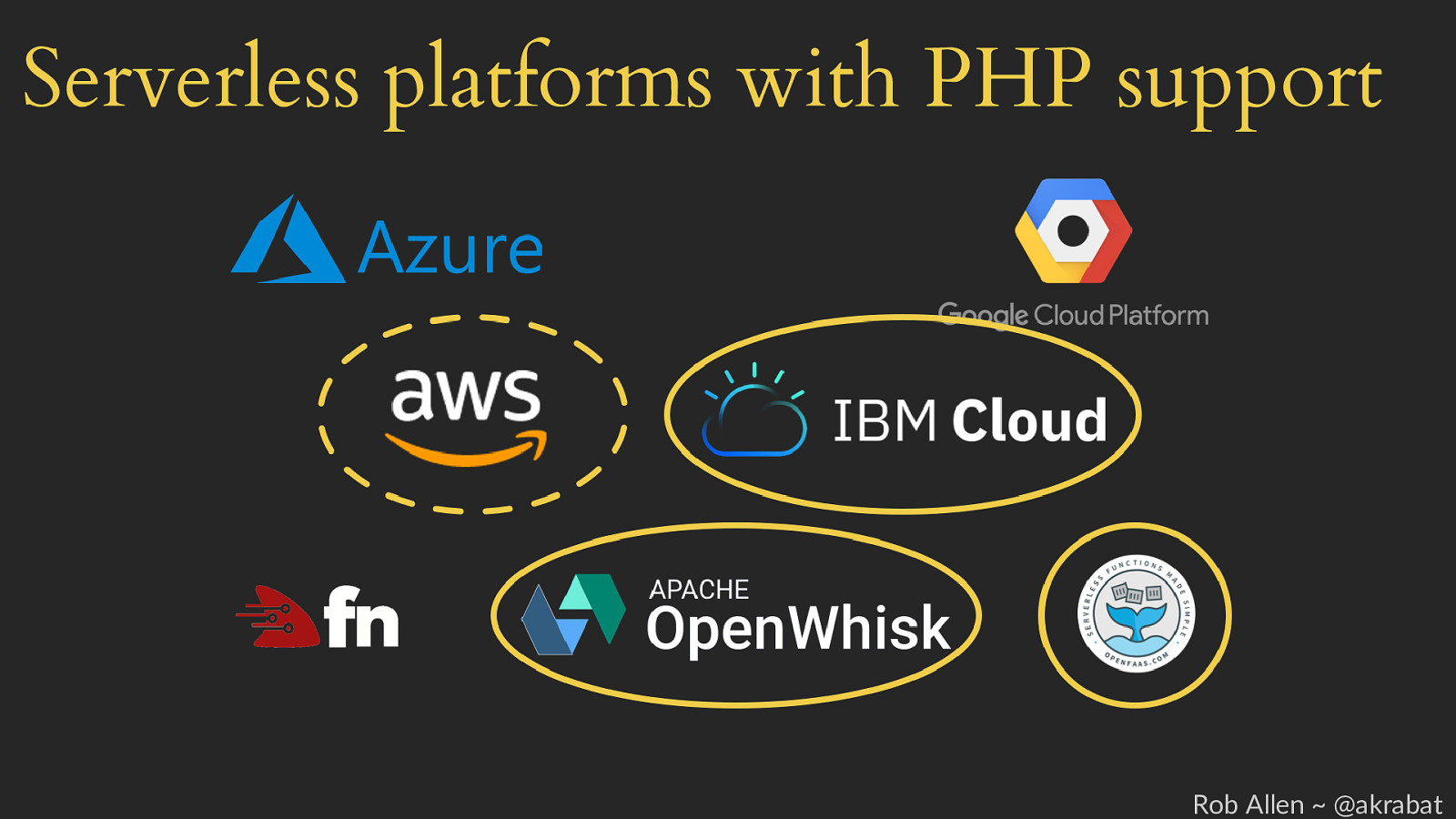
Serverless platforms with PHP support Rob Allen ~ @akrabat
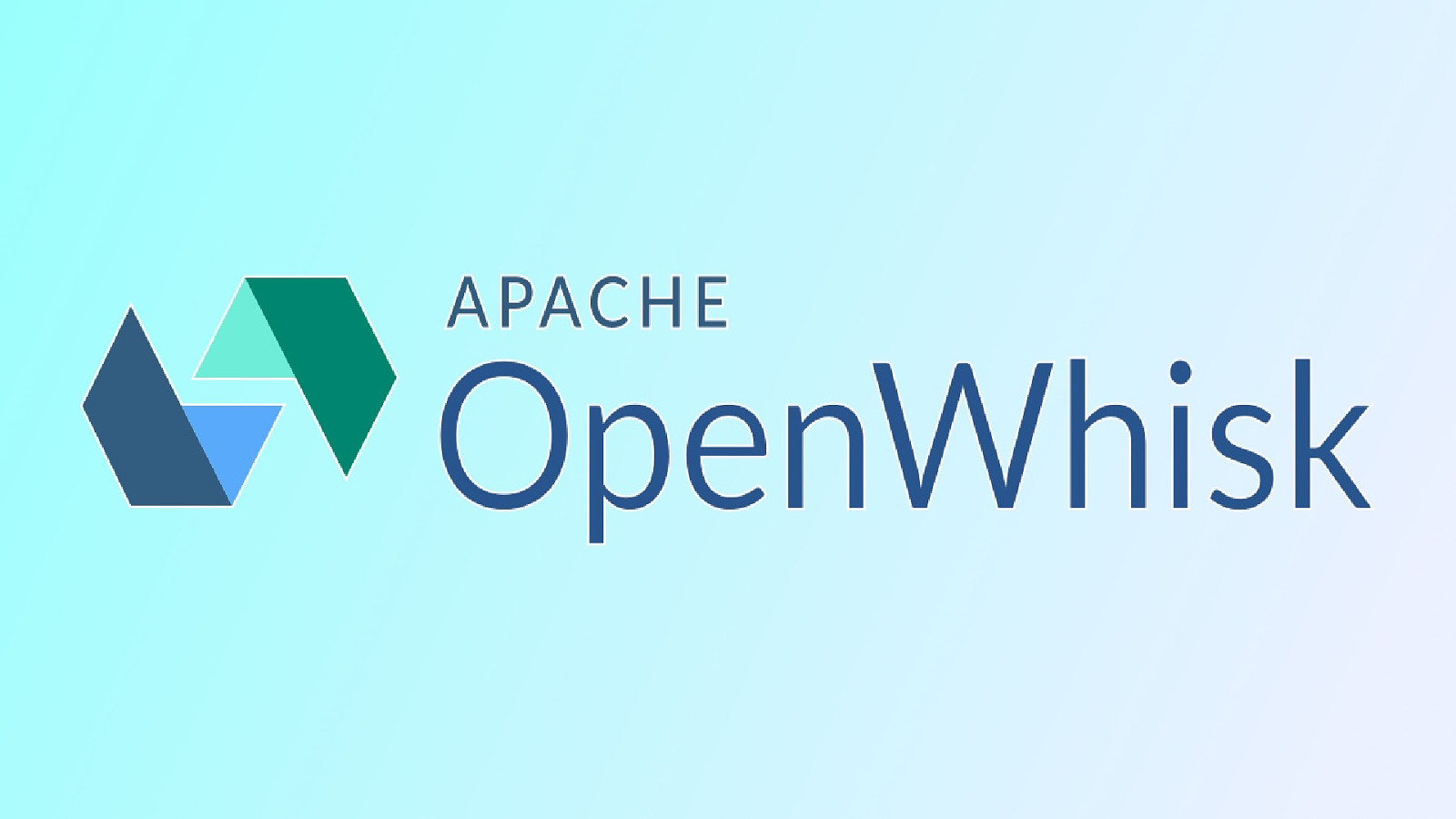
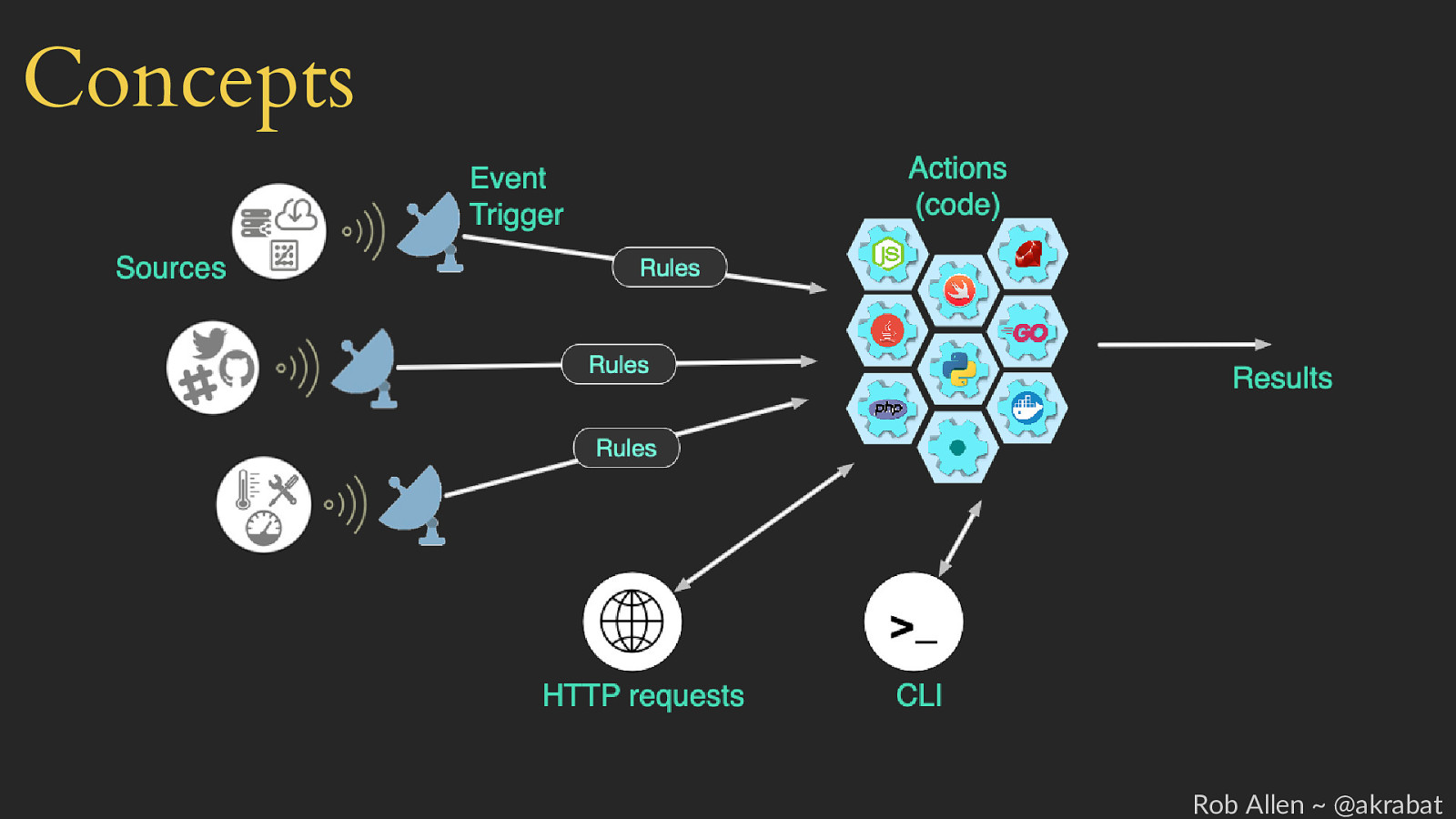
Concepts Rob Allen ~ @akrabat
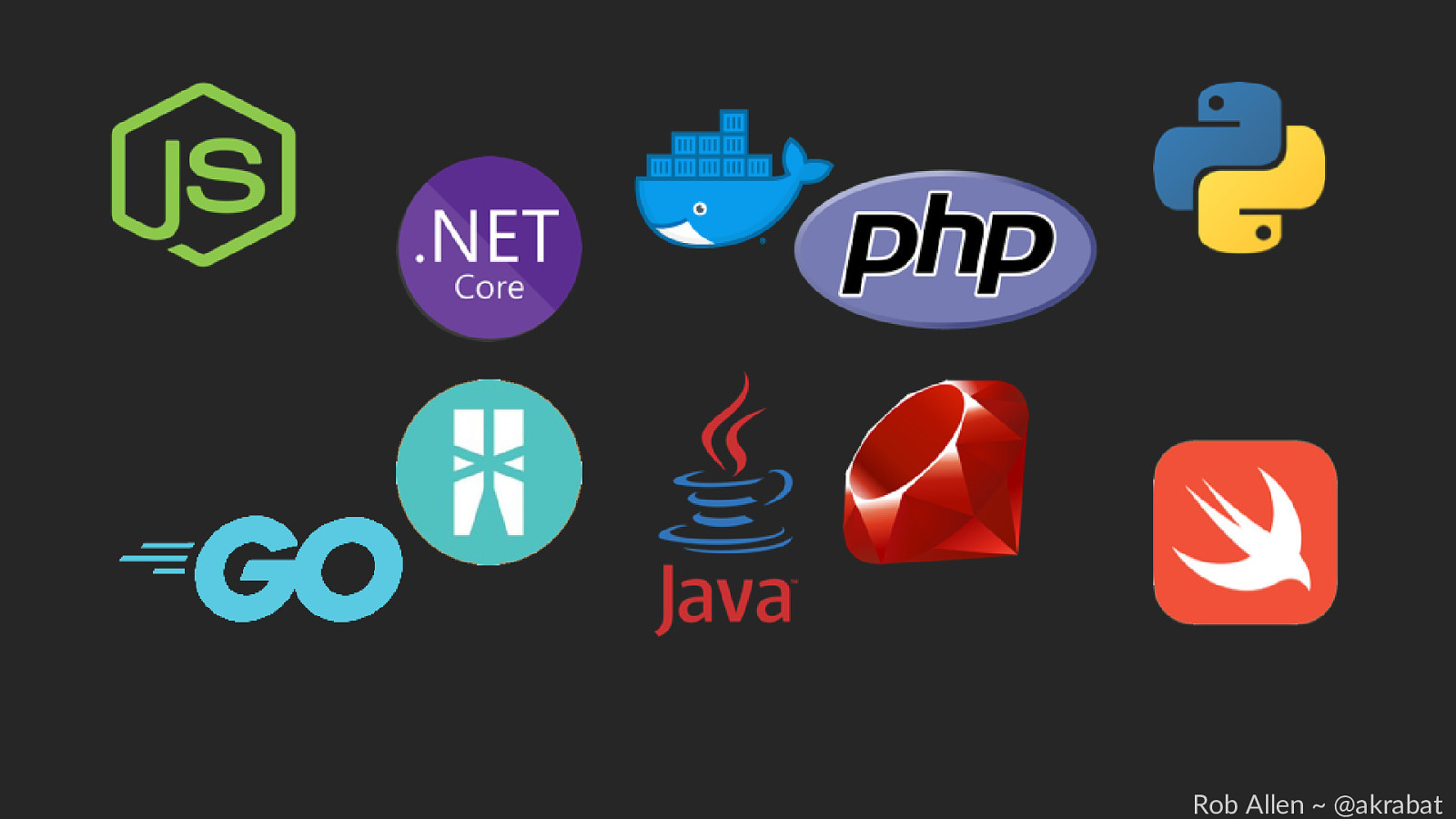
Rob Allen ~ @akrabat
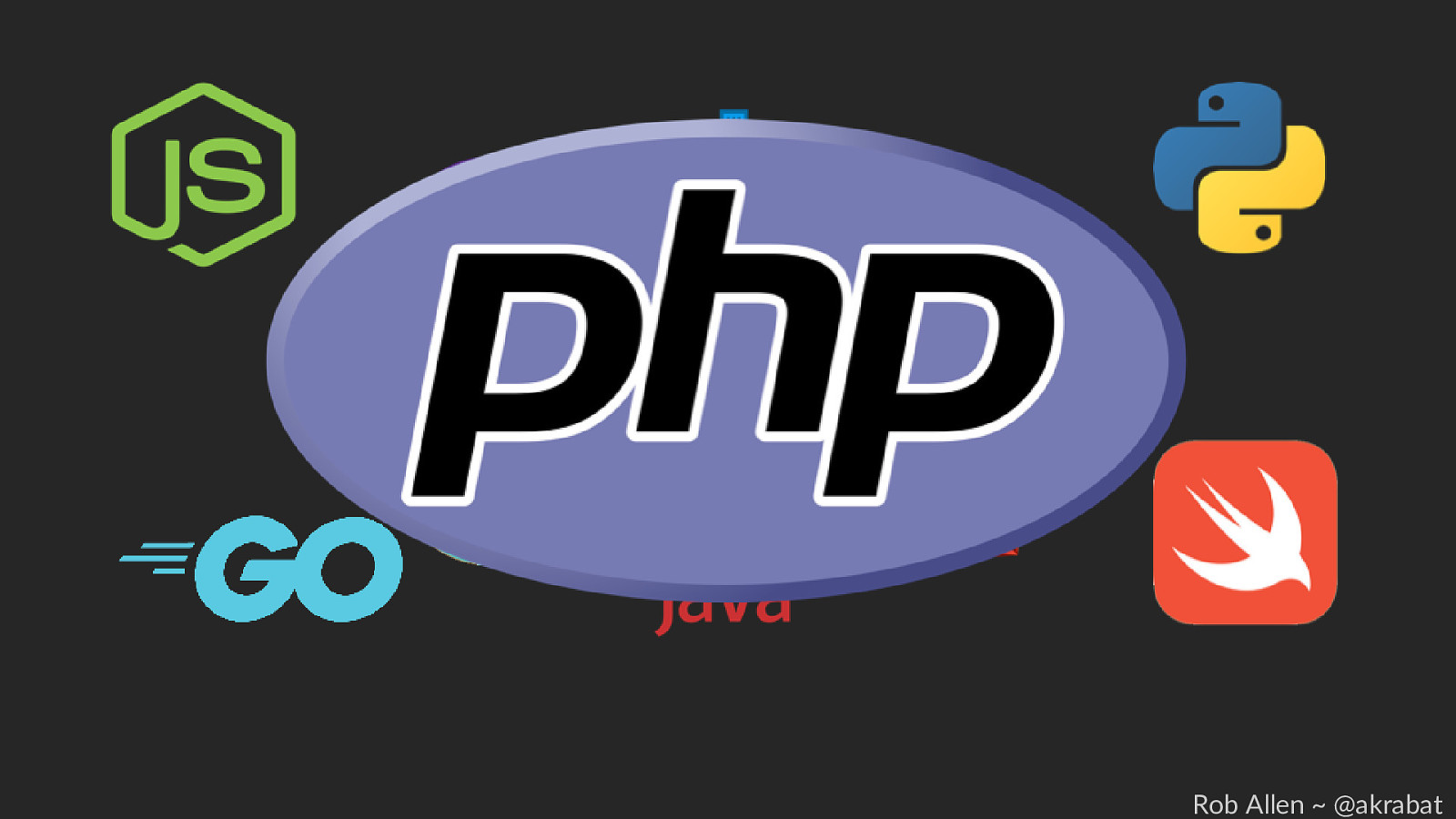
Rob Allen ~ @akrabat
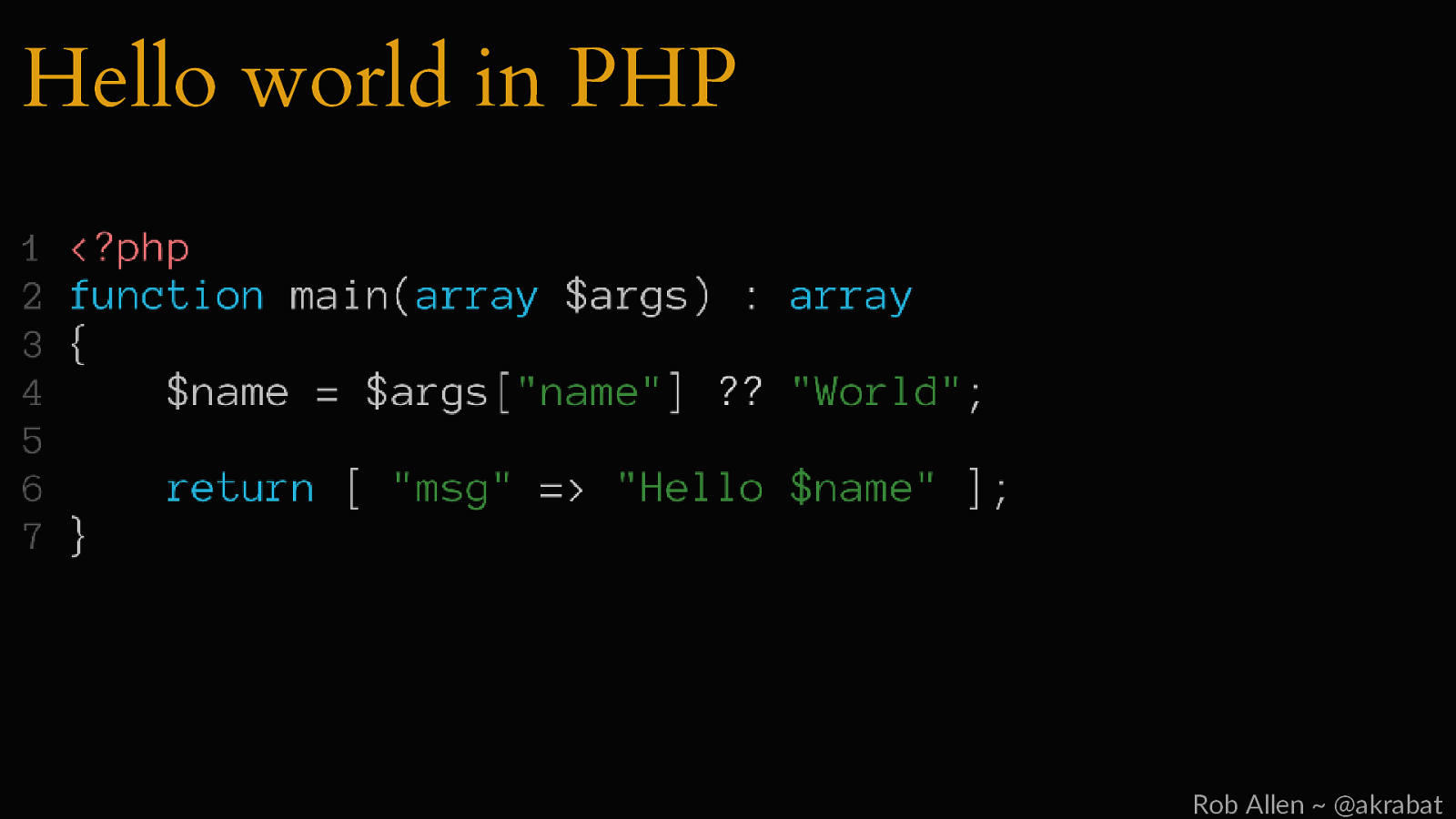
Hello world in PHP Rob Allen ~ @akrabat
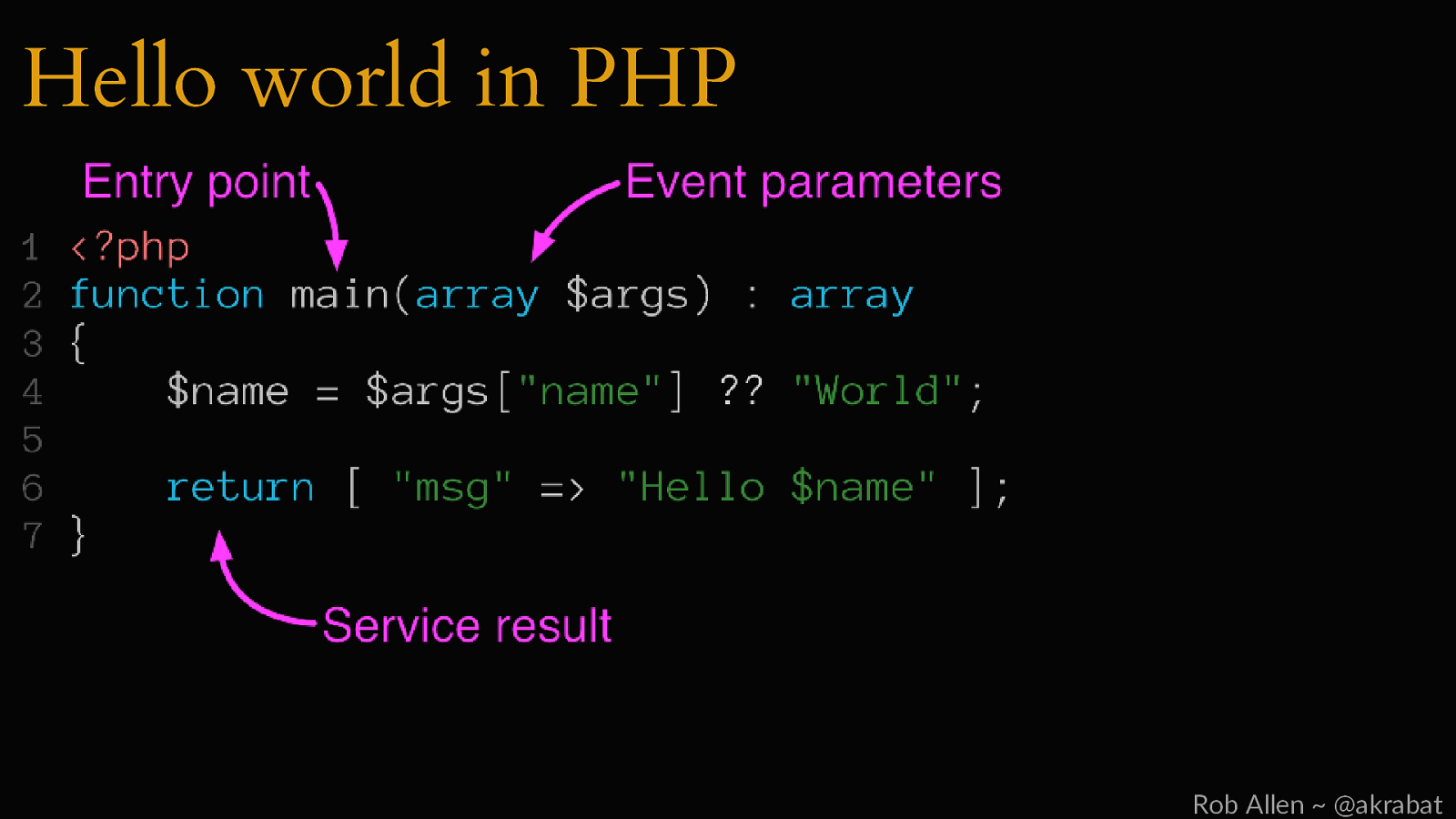
Hello world in PHP Rob Allen ~ @akrabat
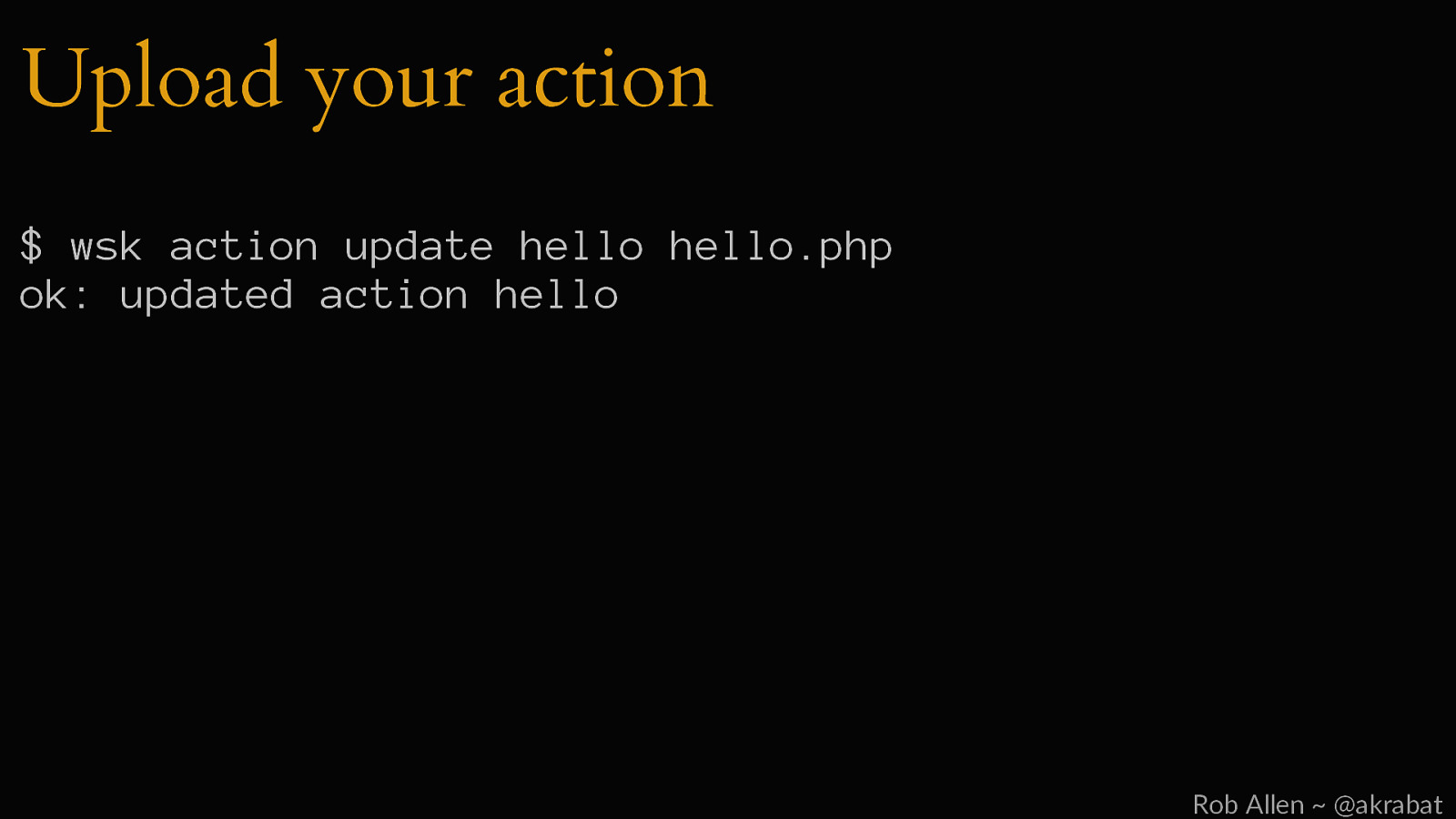
Upload your action $ wsk action update hello hello.php ok: updated action hello Rob Allen ~ @akrabat
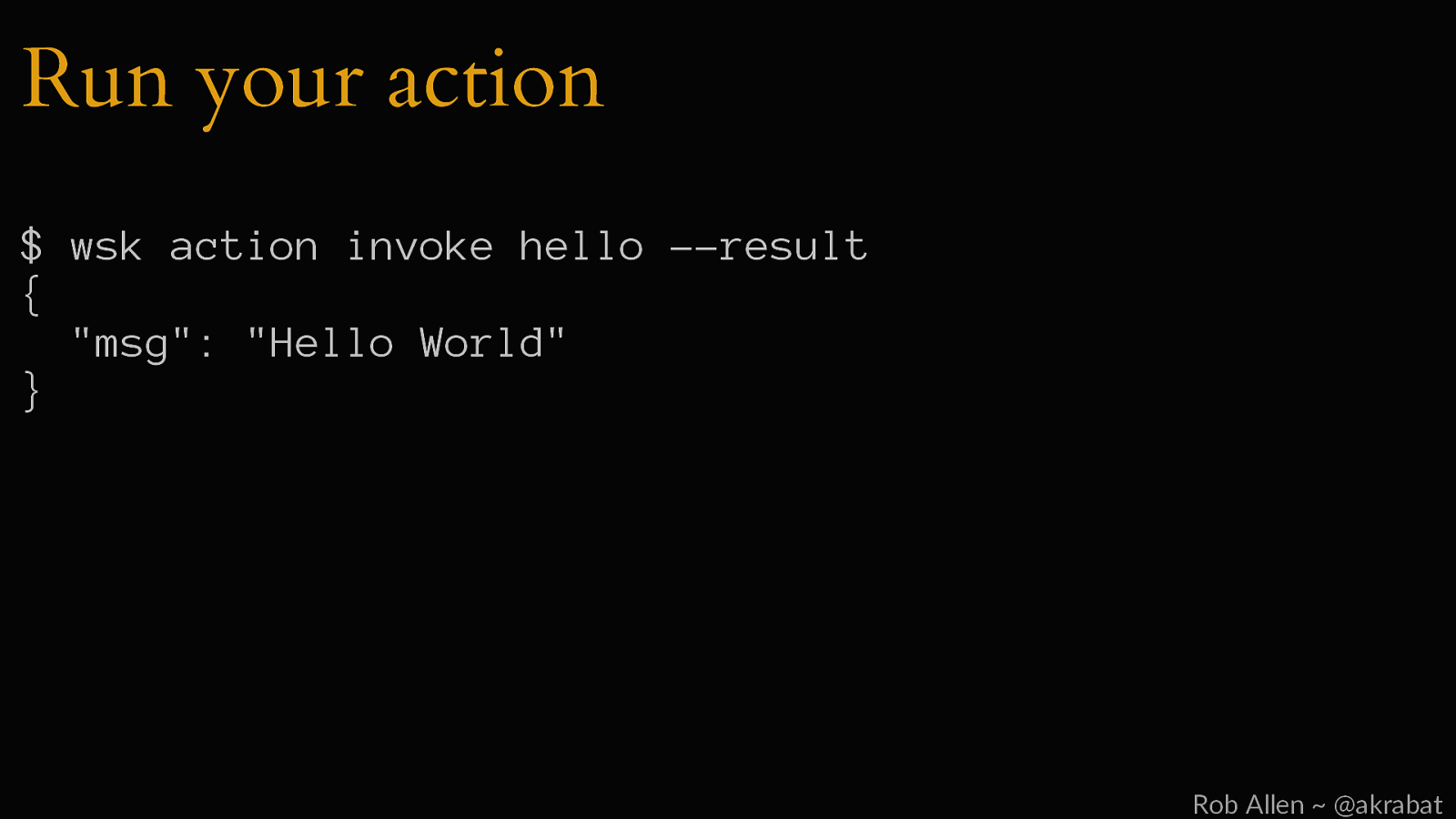
Run your action $ wsk action invoke hello —result { “msg”: “Hello World” } Rob Allen ~ @akrabat
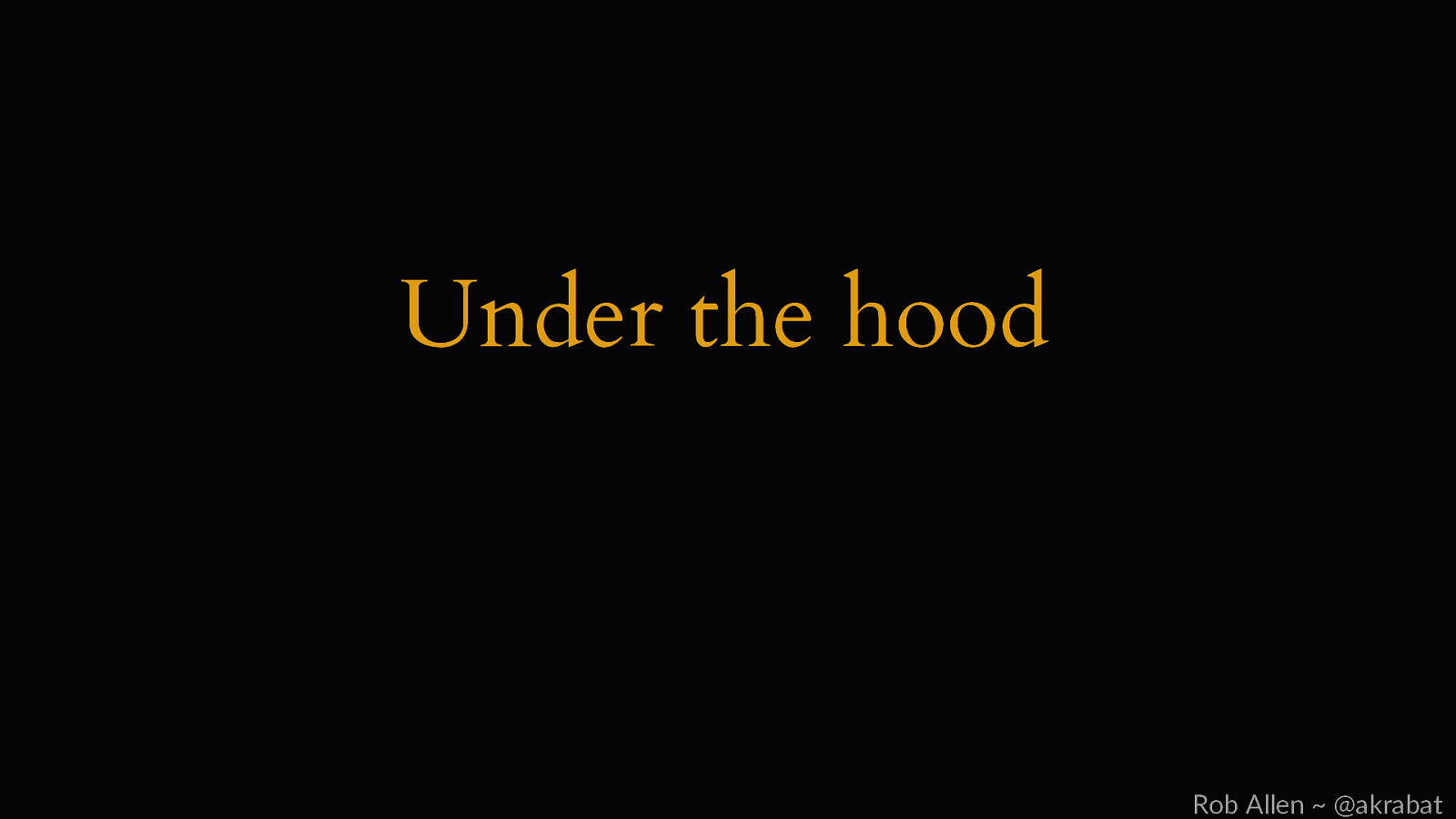
Under the hood Rob Allen ~ @akrabat
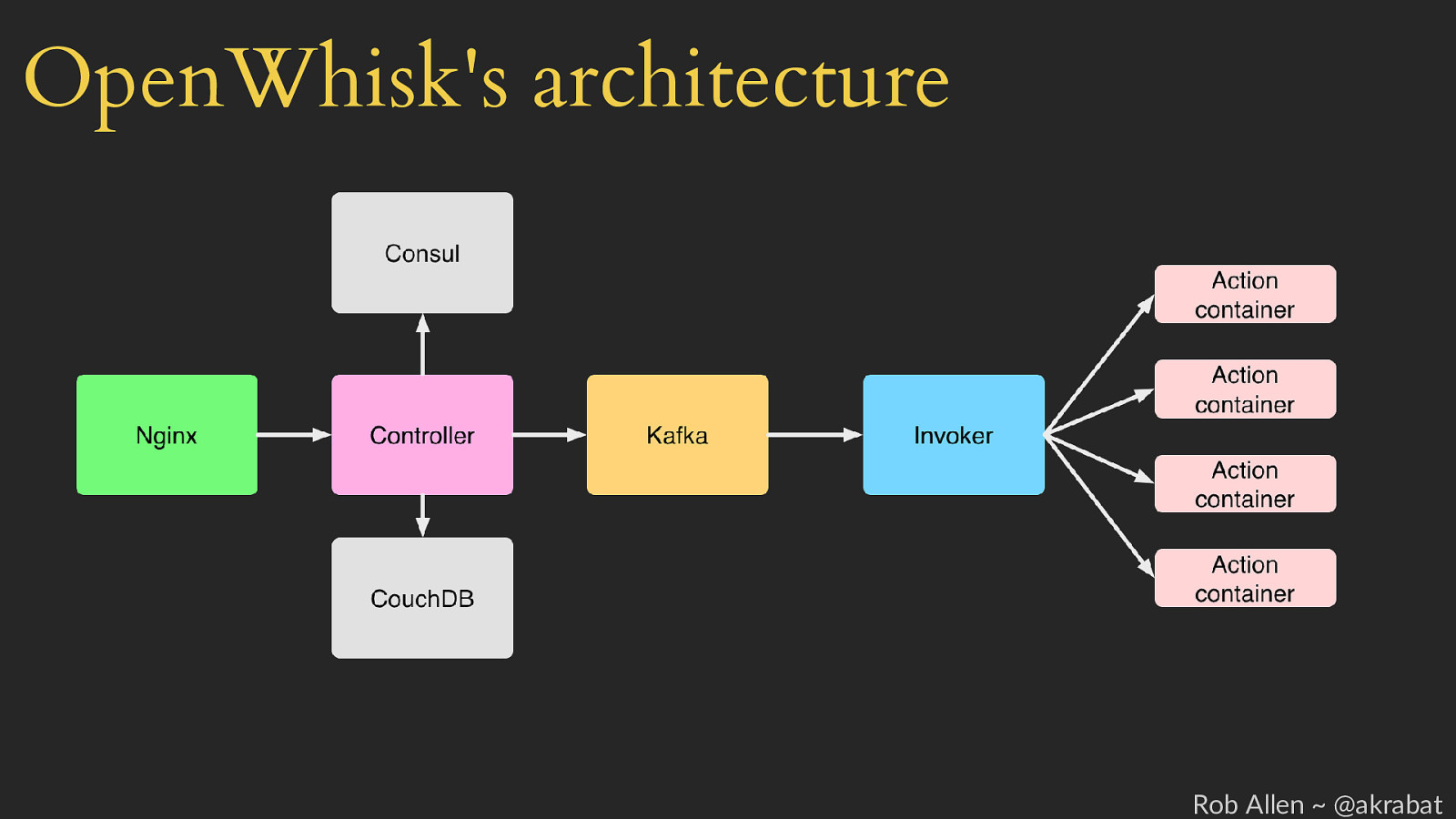
OpenWhisk’s architecture Rob Allen ~ @akrabat
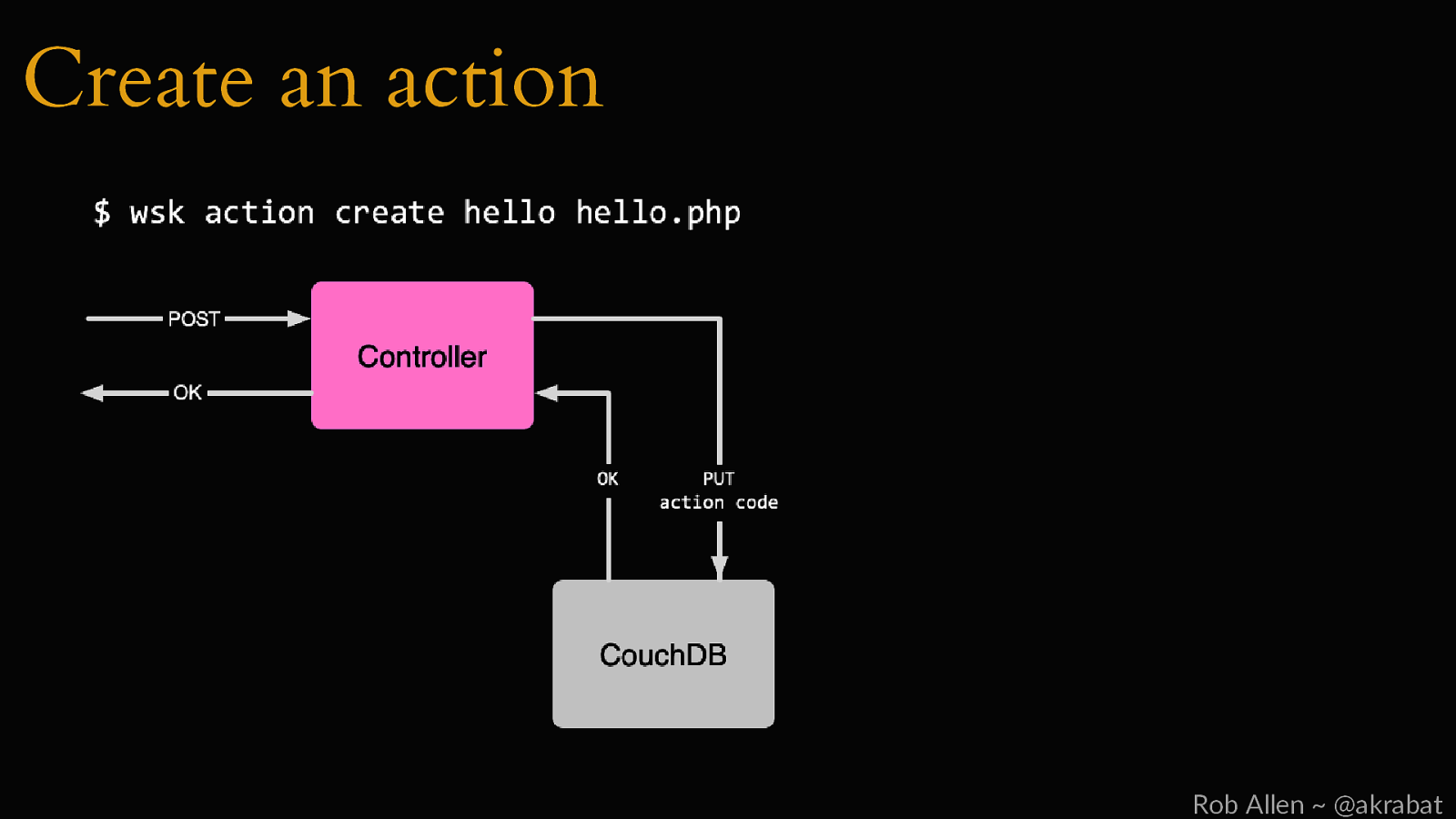
Create an action Rob Allen ~ @akrabat
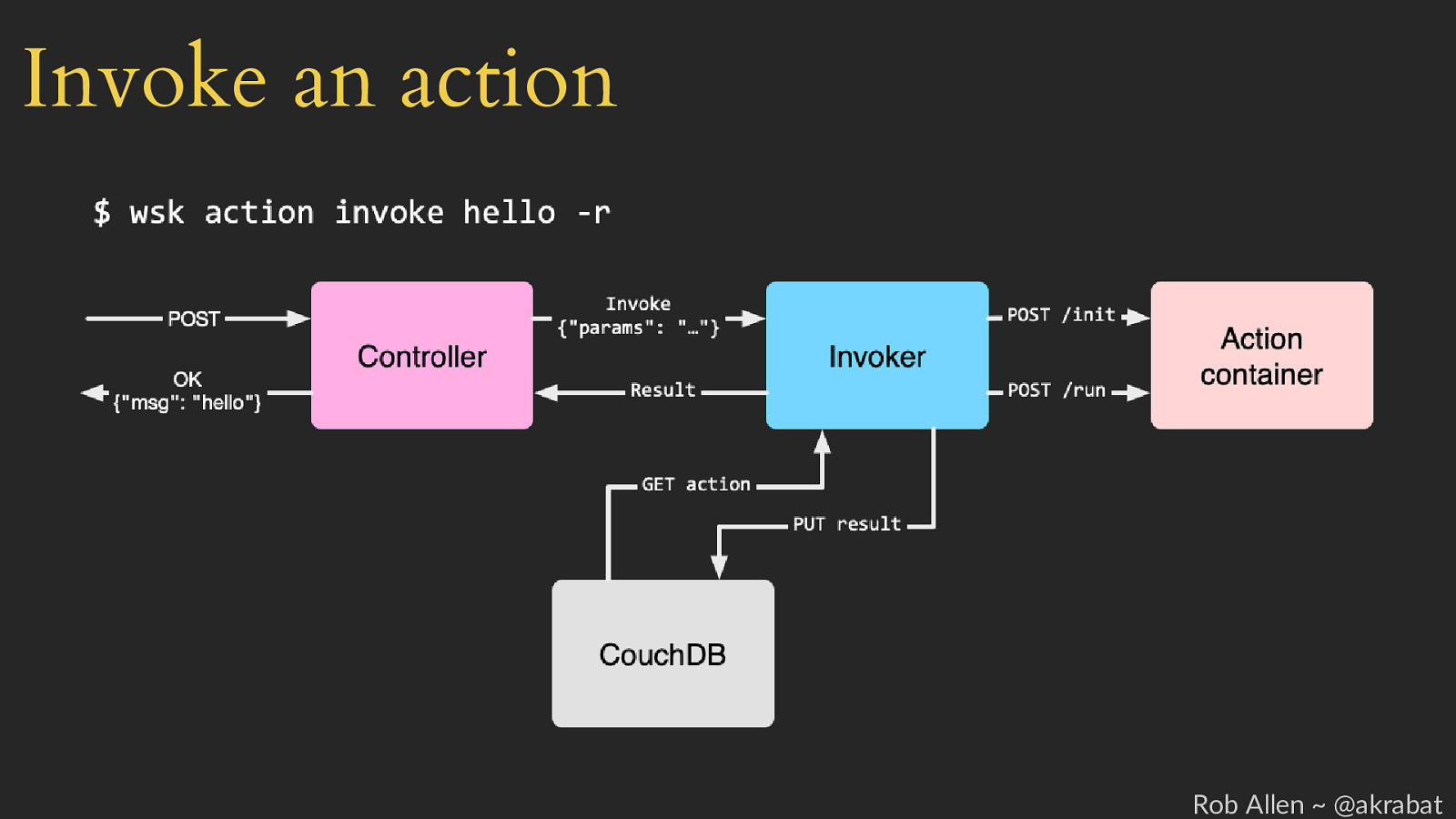
Invoke an action Rob Allen ~ @akrabat
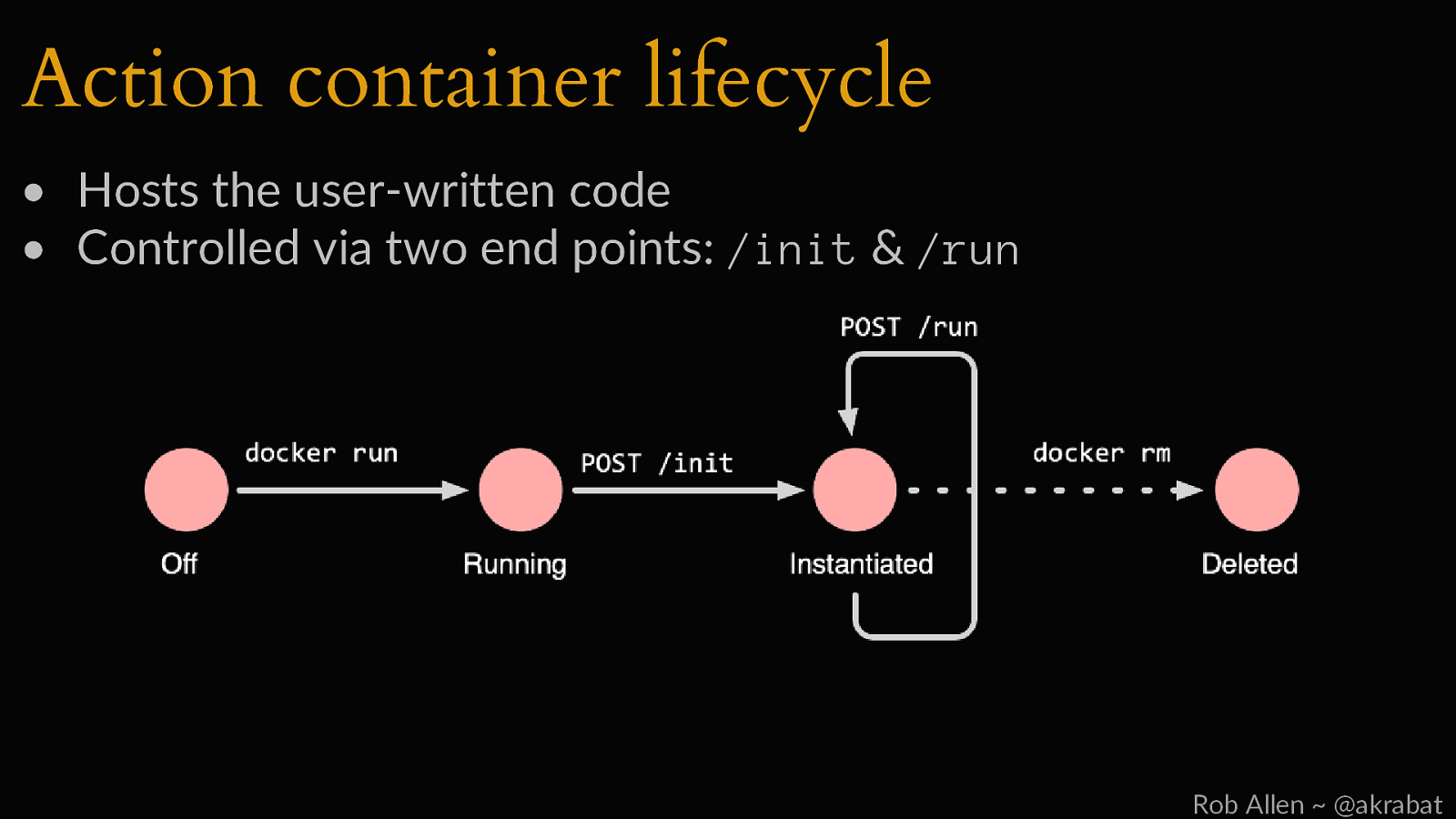
Action container lifecycle • Hosts the user-written code • Controlled via two end points: /init & /run Rob Allen ~ @akrabat
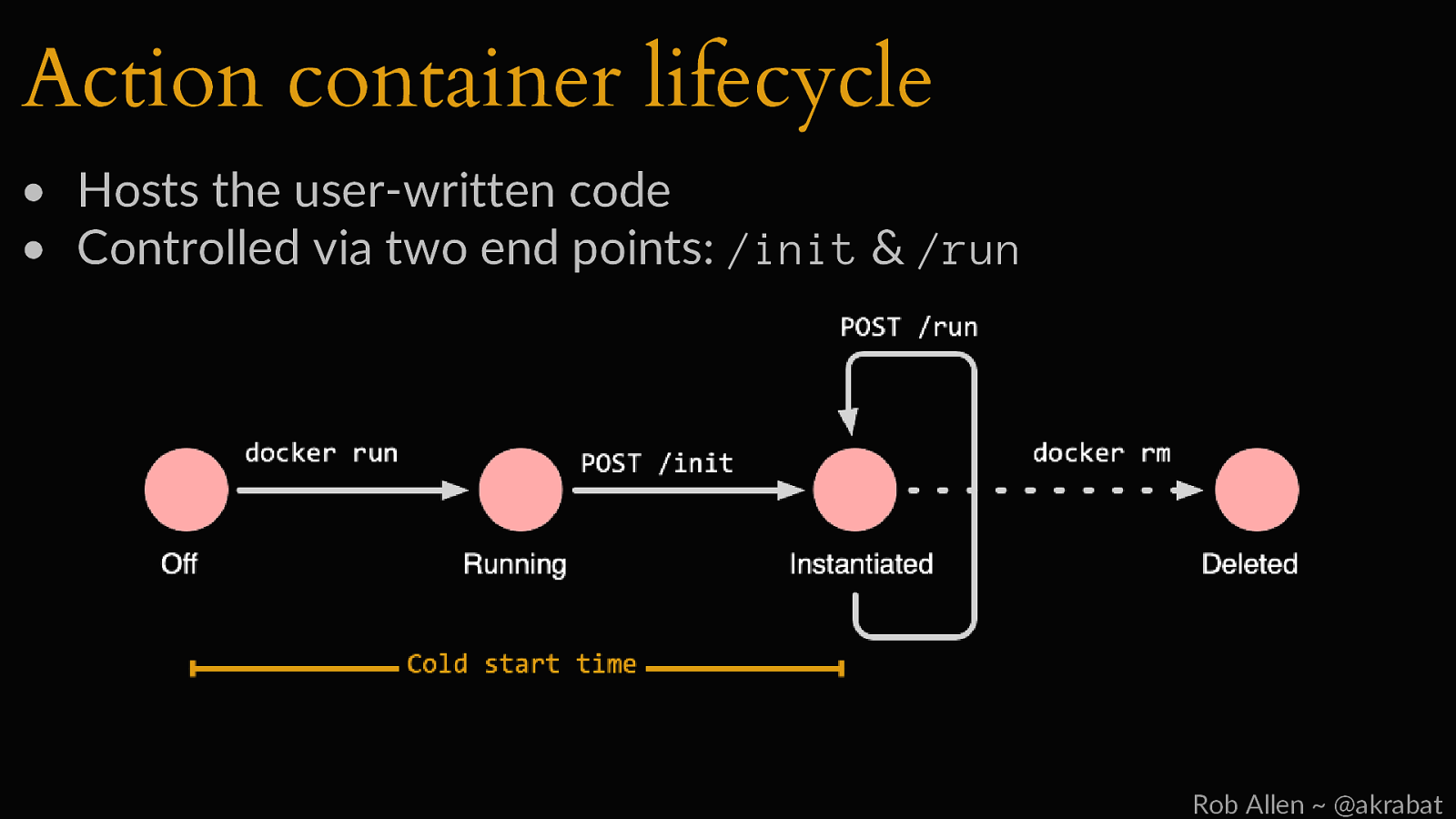
Action container lifecycle • Hosts the user-written code • Controlled via two end points: /init & /run Rob Allen ~ @akrabat
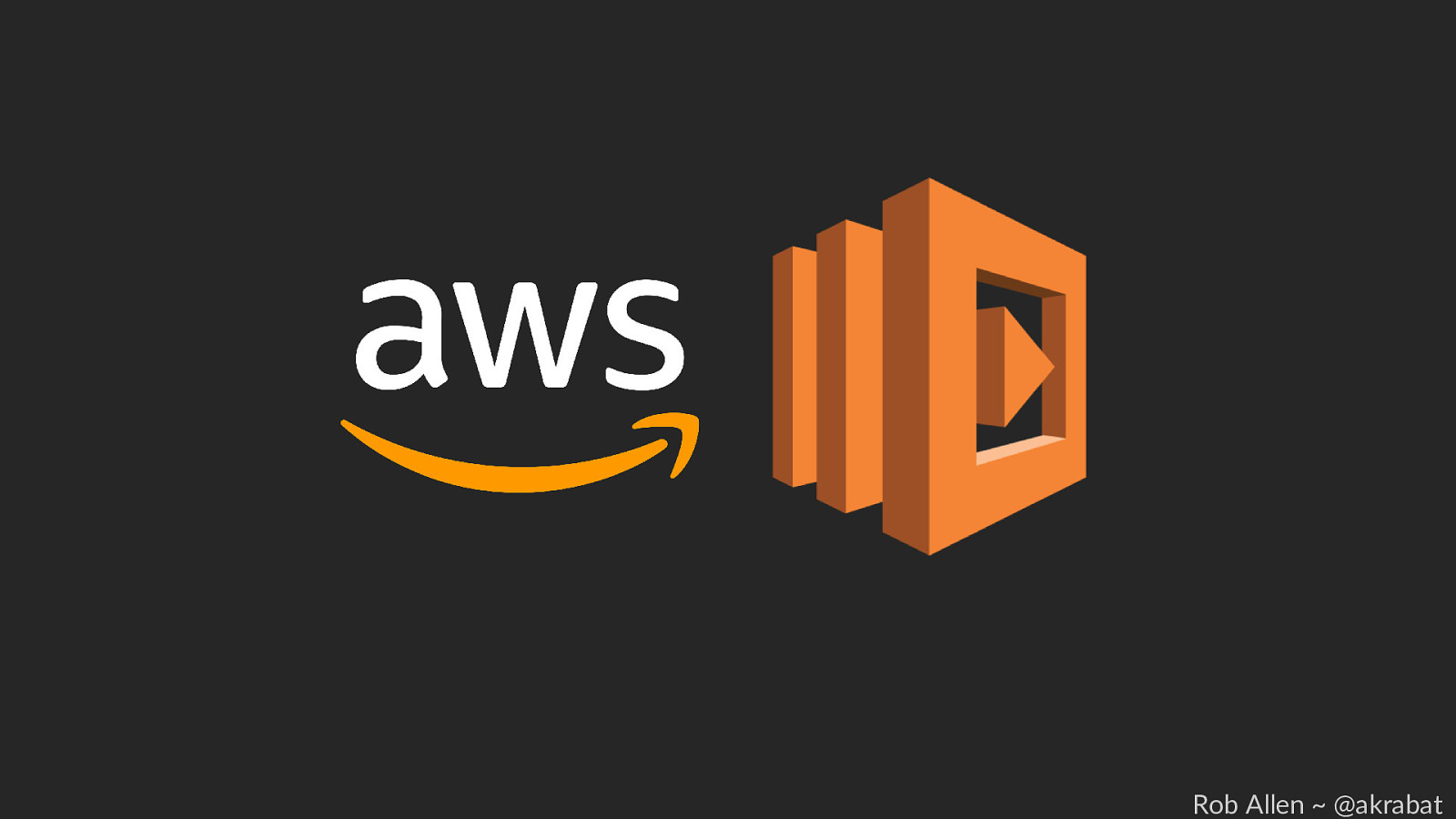
Rob Allen ~ @akrabat
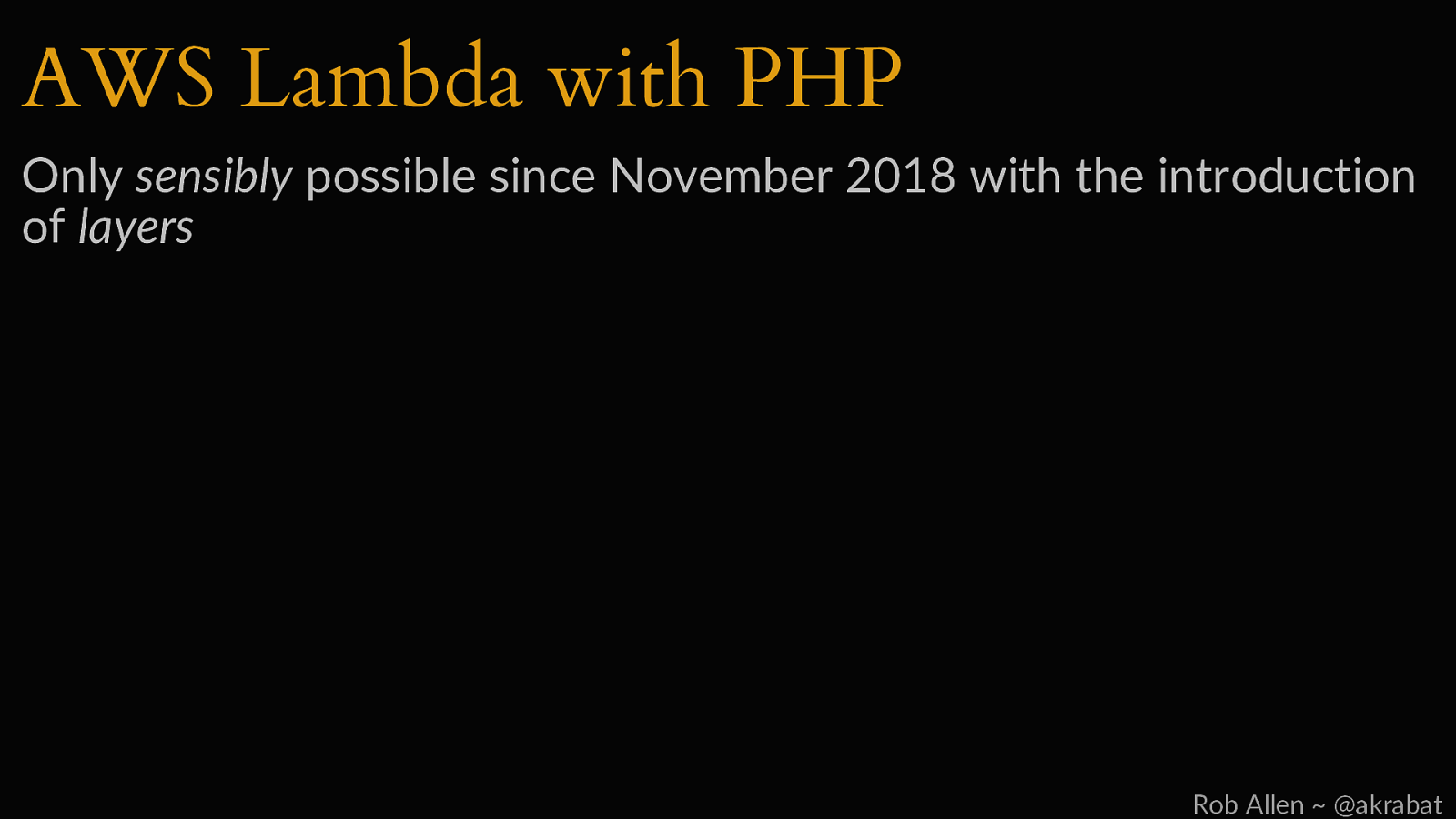
AWS Lambda with PHP Only sensibly possible since November 2018 with the introduction of layers Rob Allen ~ @akrabat
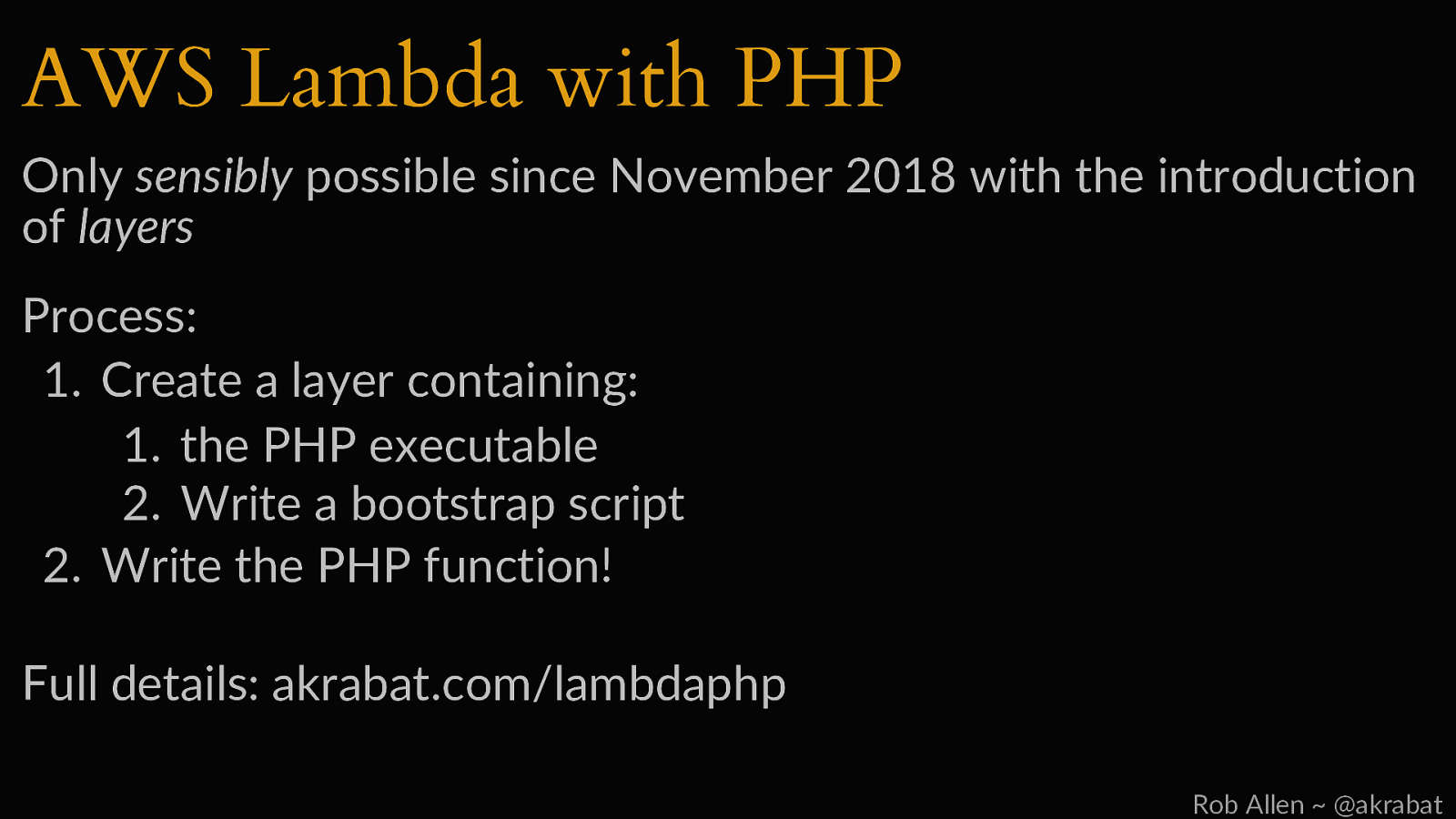
AWS Lambda with PHP Only sensibly possible since November 2018 with the introduction of layers Process: 1. Create a layer containing: 1. the PHP executable 2. Write a bootstrap script 2. Write the PHP function! Full details: akrabat.com/lambdaphp Rob Allen ~ @akrabat
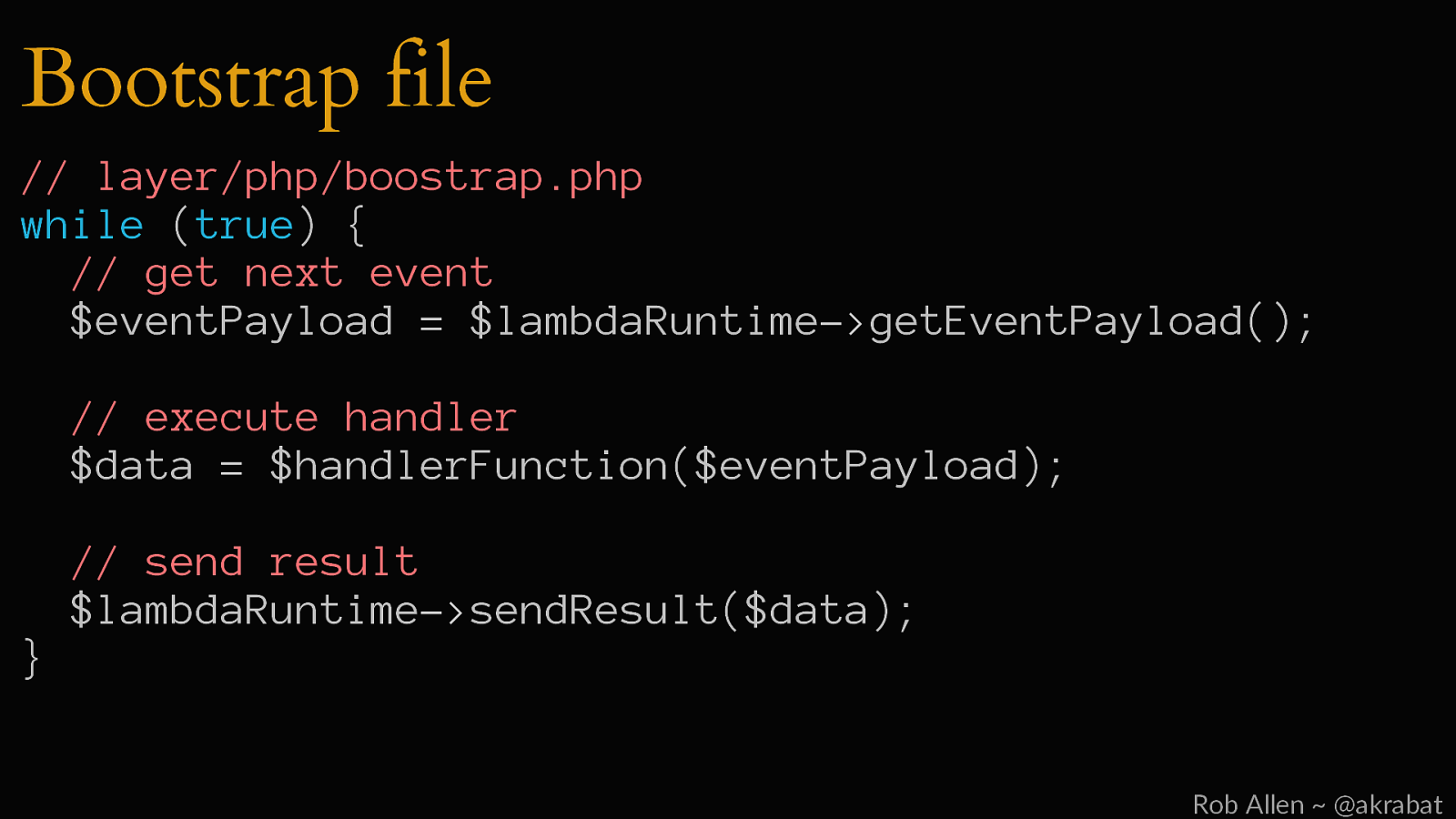
Bootstrap file // layer/php/boostrap.php while (true) { // get next event $eventPayload = $lambdaRuntime->getEventPayload(); // execute handler $data = $handlerFunction($eventPayload); // send result $lambdaRuntime->sendResult($data); } Rob Allen ~ @akrabat
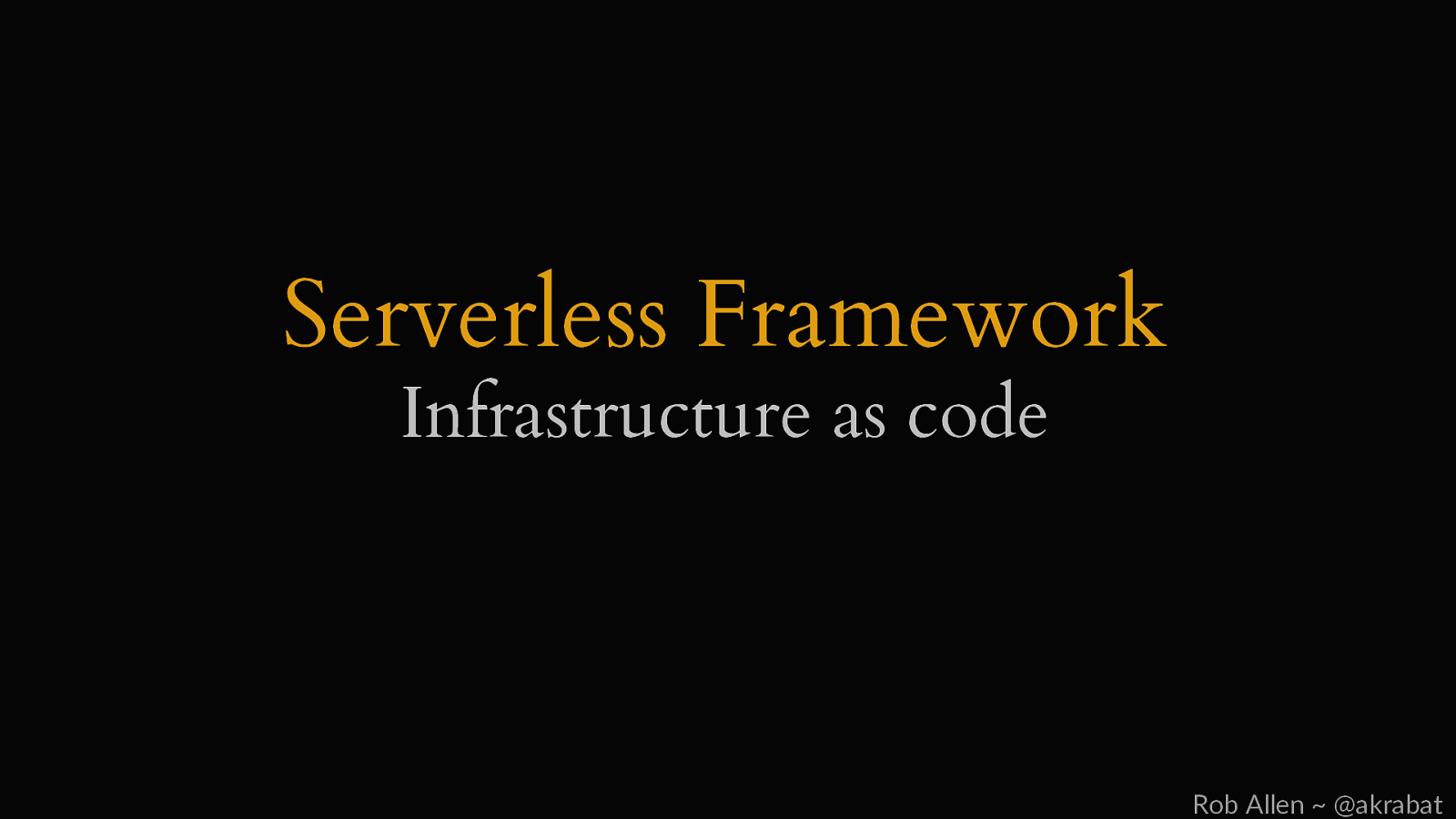
Serverless Framework Infrastructure as code Rob Allen ~ @akrabat
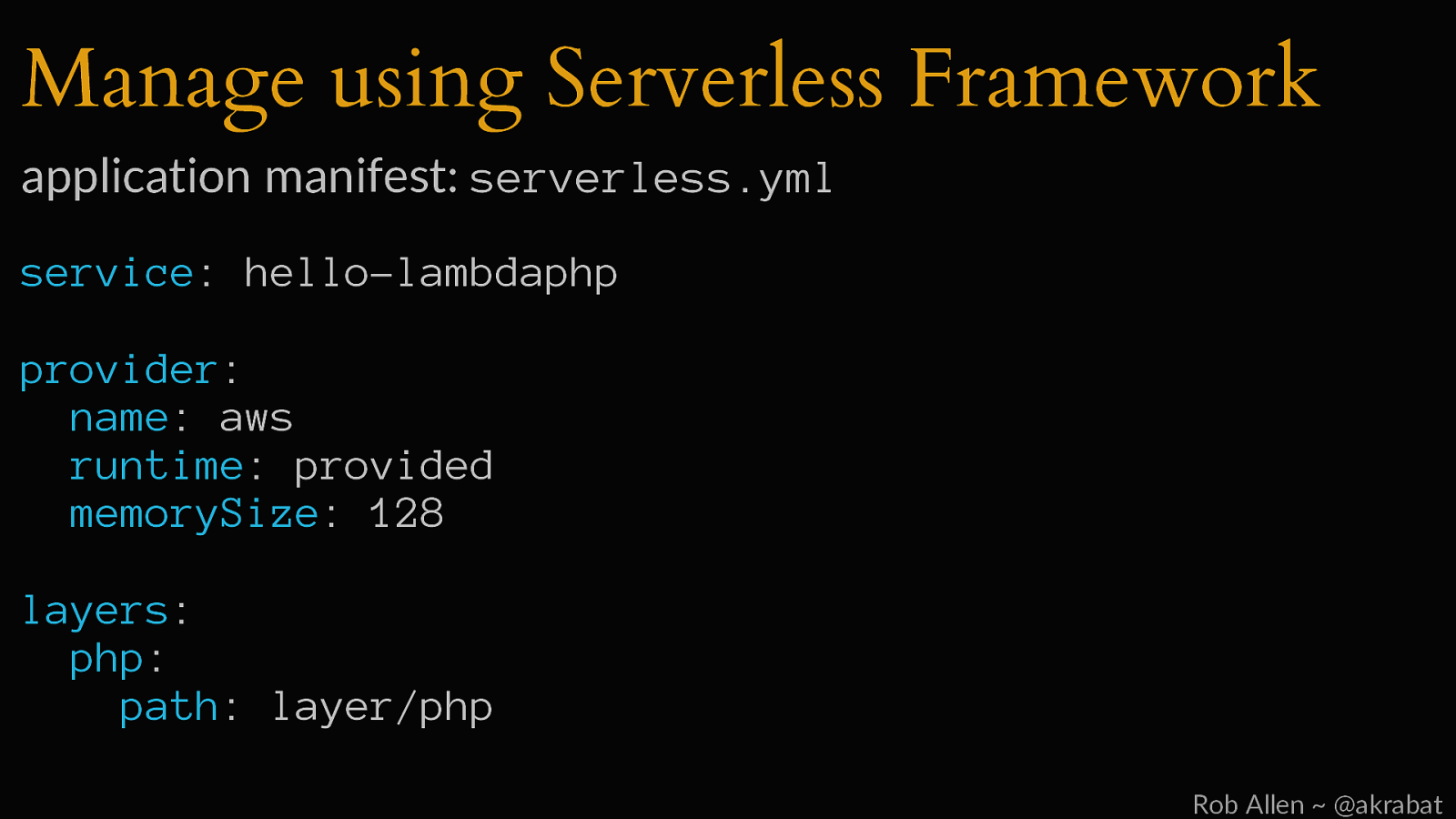
Manage using Serverless Framework application manifest: serverless.yml service: hello-lambdaphp provider: name: aws runtime: provided memorySize: 128 layers: php: path: layer/php Rob Allen ~ @akrabat
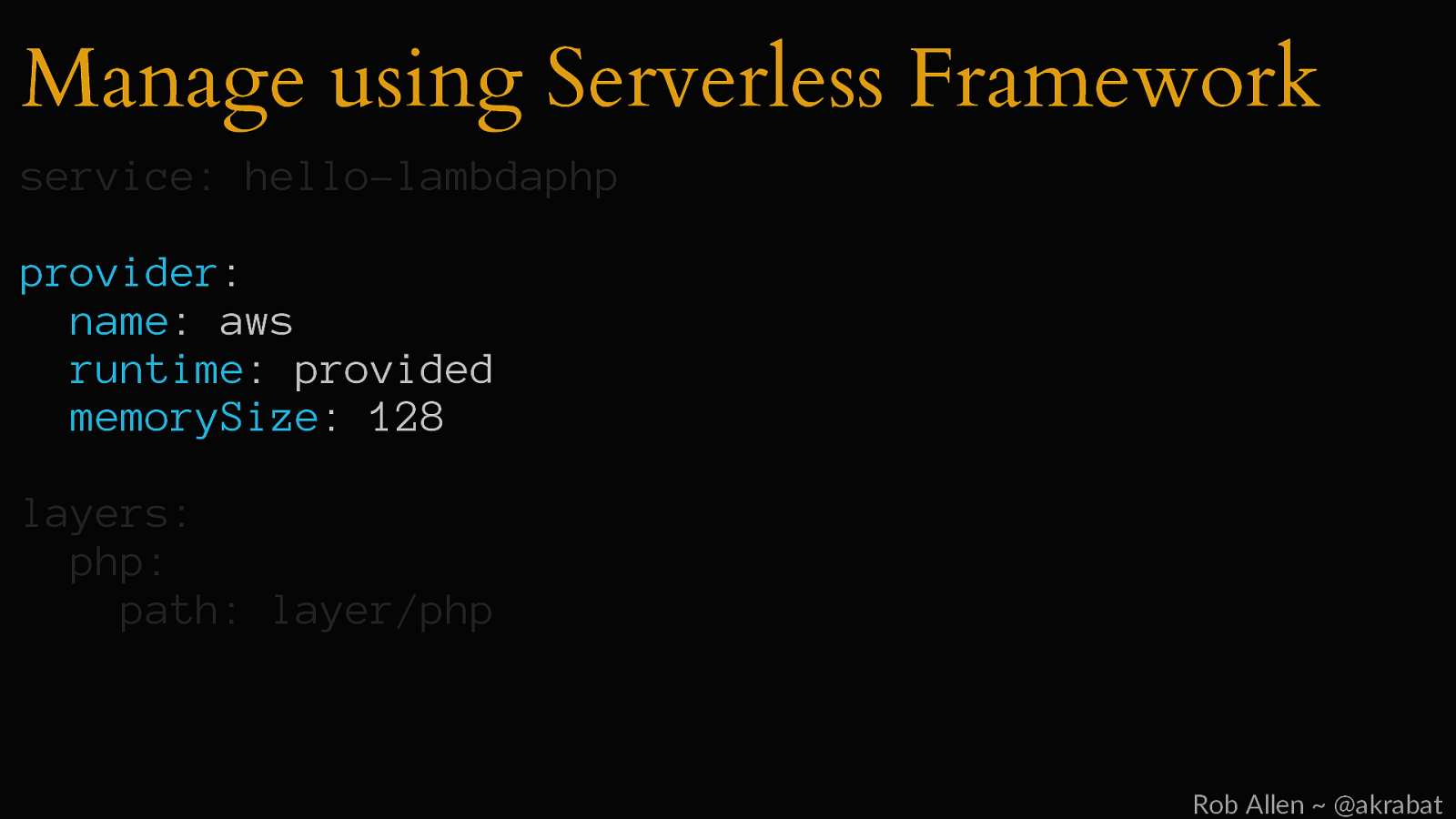
Manage using Serverless Framework service: hello-lambdaphp provider: name: aws runtime: provided memorySize: 128 layers: php: path: layer/php Rob Allen ~ @akrabat
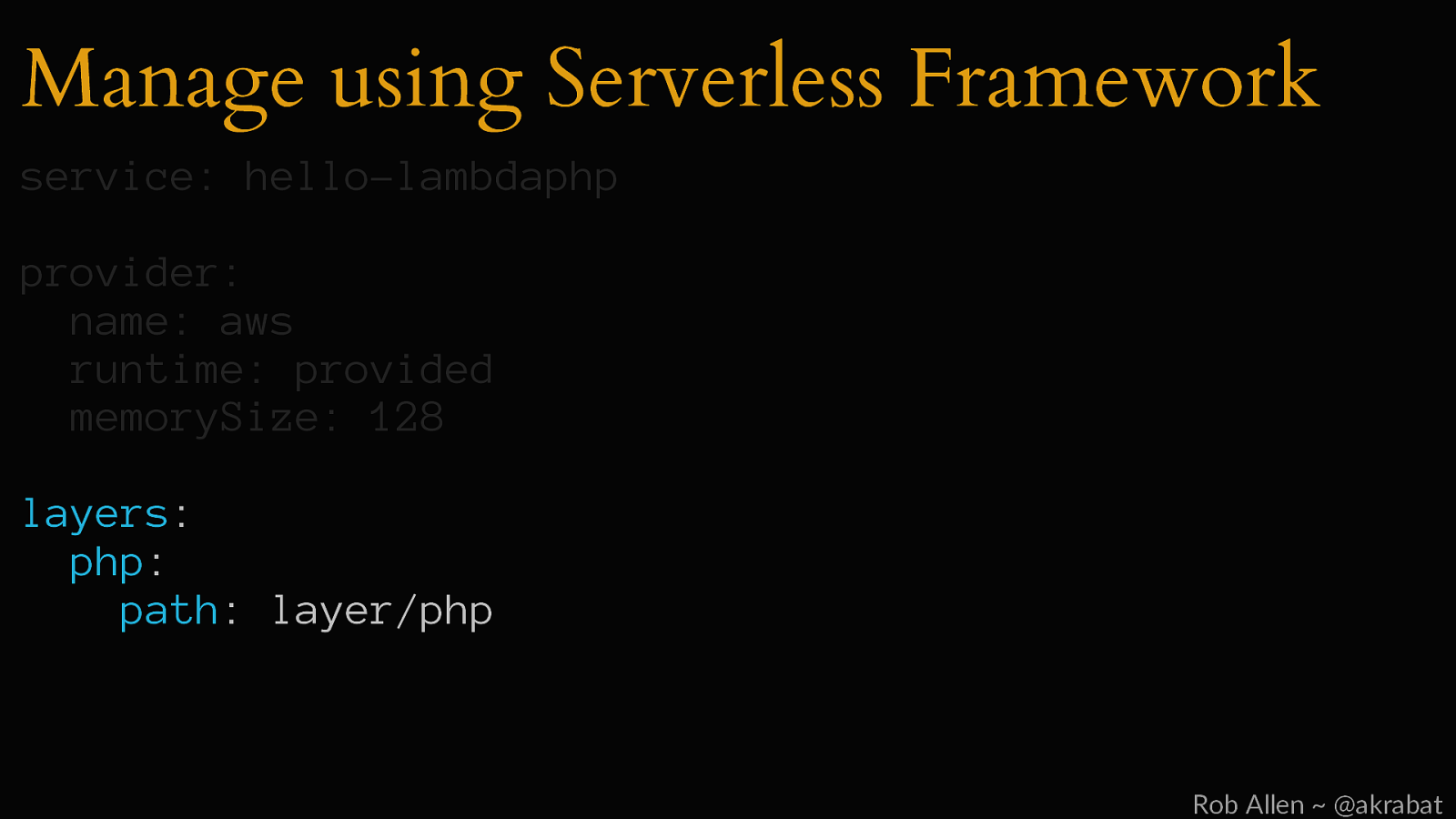
Manage using Serverless Framework service: hello-lambdaphp provider: name: aws runtime: provided memorySize: 128 layers: php: path: layer/php Rob Allen ~ @akrabat
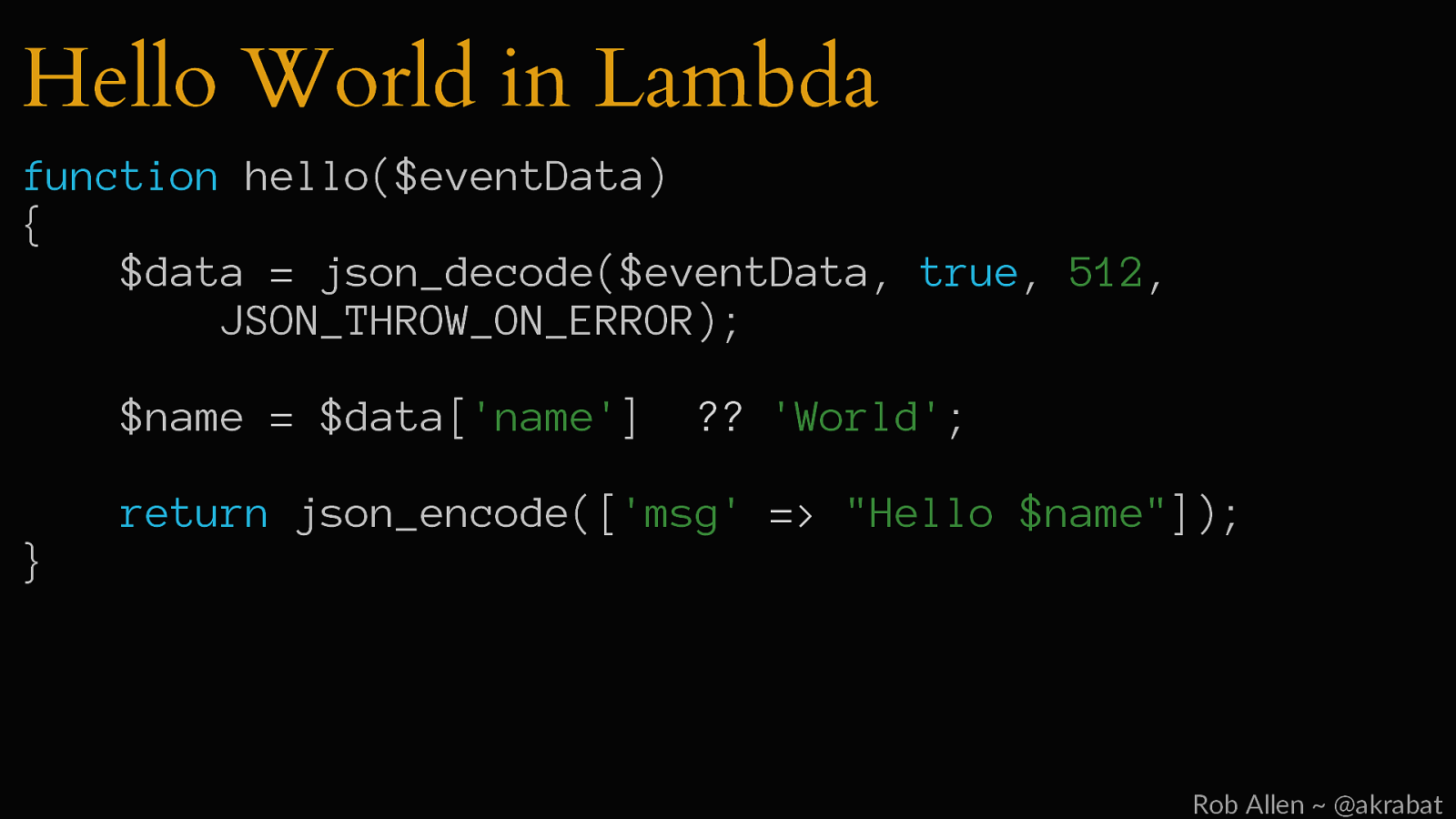
Hello World in Lambda function hello($eventData) { $data = json_decode($eventData, true, 512, JSON_THROW_ON_ERROR); $name = $data[‘name’] ?? ‘World’; return json_encode([‘msg’ => “Hello $name”]); } Rob Allen ~ @akrabat
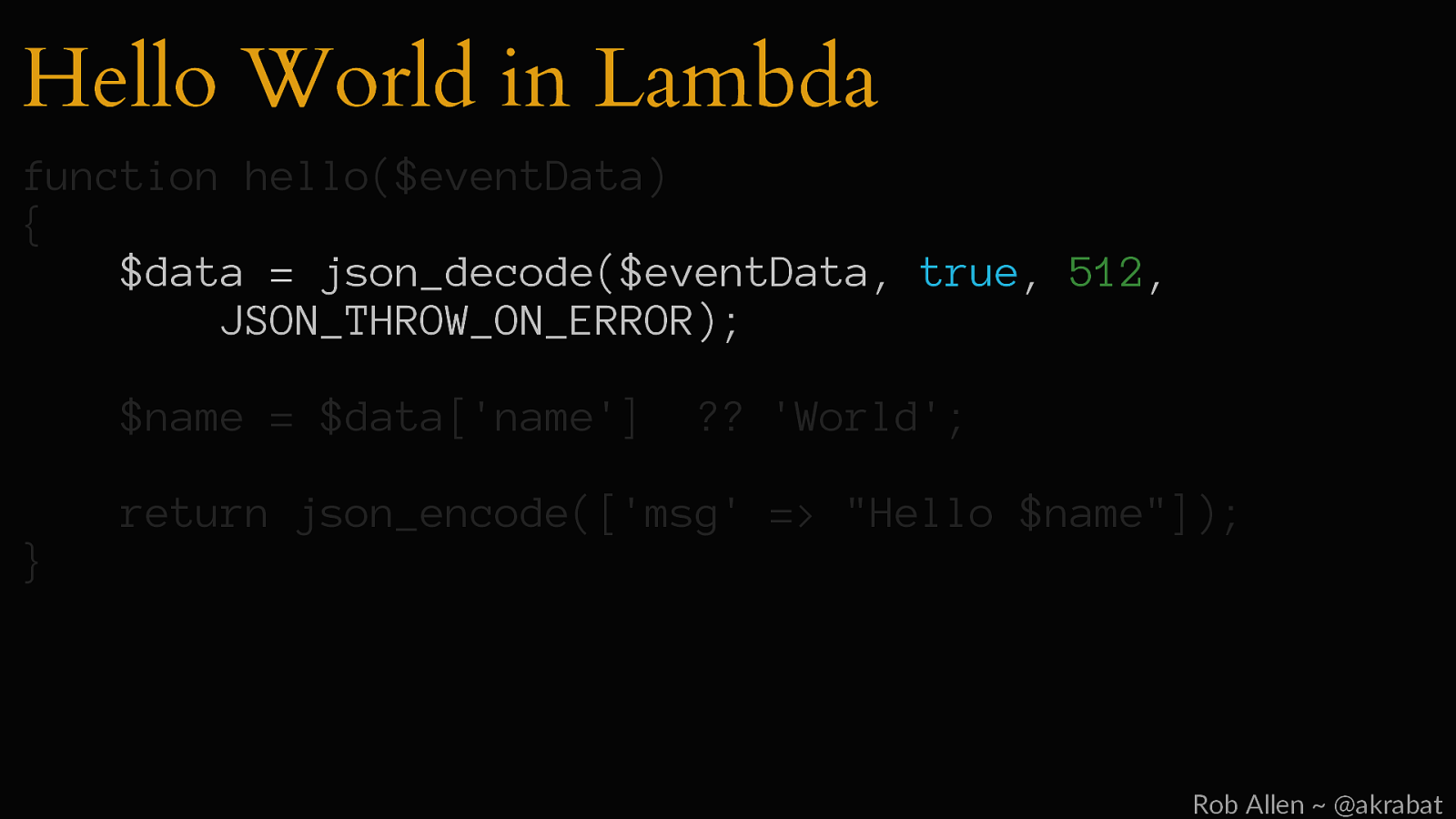
Hello World in Lambda function hello($eventData) { $data = json_decode($eventData, true, 512, JSON_THROW_ON_ERROR); $name = $data[‘name’] ?? ‘World’; return json_encode([‘msg’ => “Hello $name”]); } Rob Allen ~ @akrabat
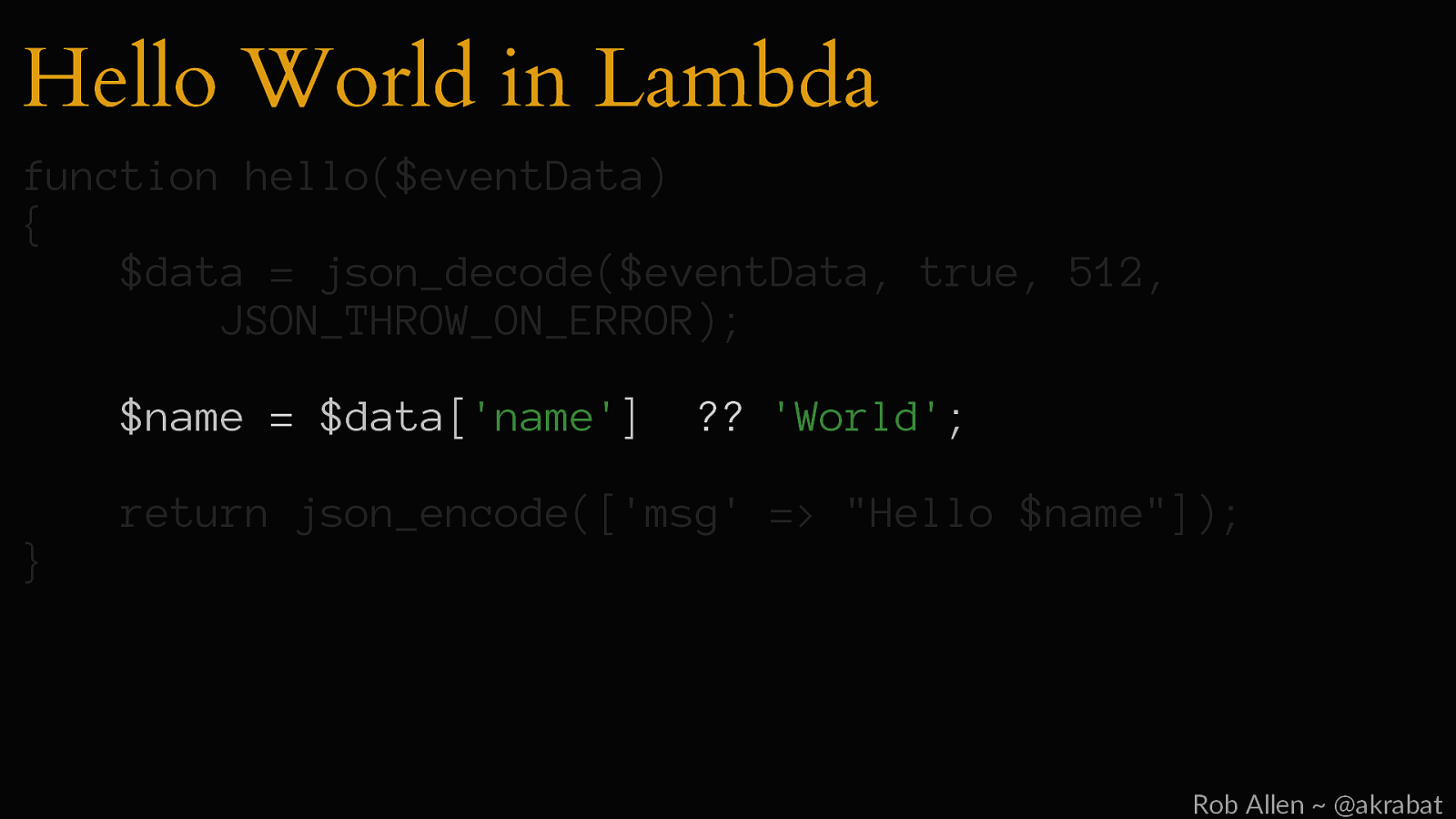
Hello World in Lambda function hello($eventData) { $data = json_decode($eventData, true, 512, JSON_THROW_ON_ERROR); $name = $data[‘name’] ?? ‘World’; return json_encode([‘msg’ => “Hello $name”]); } Rob Allen ~ @akrabat
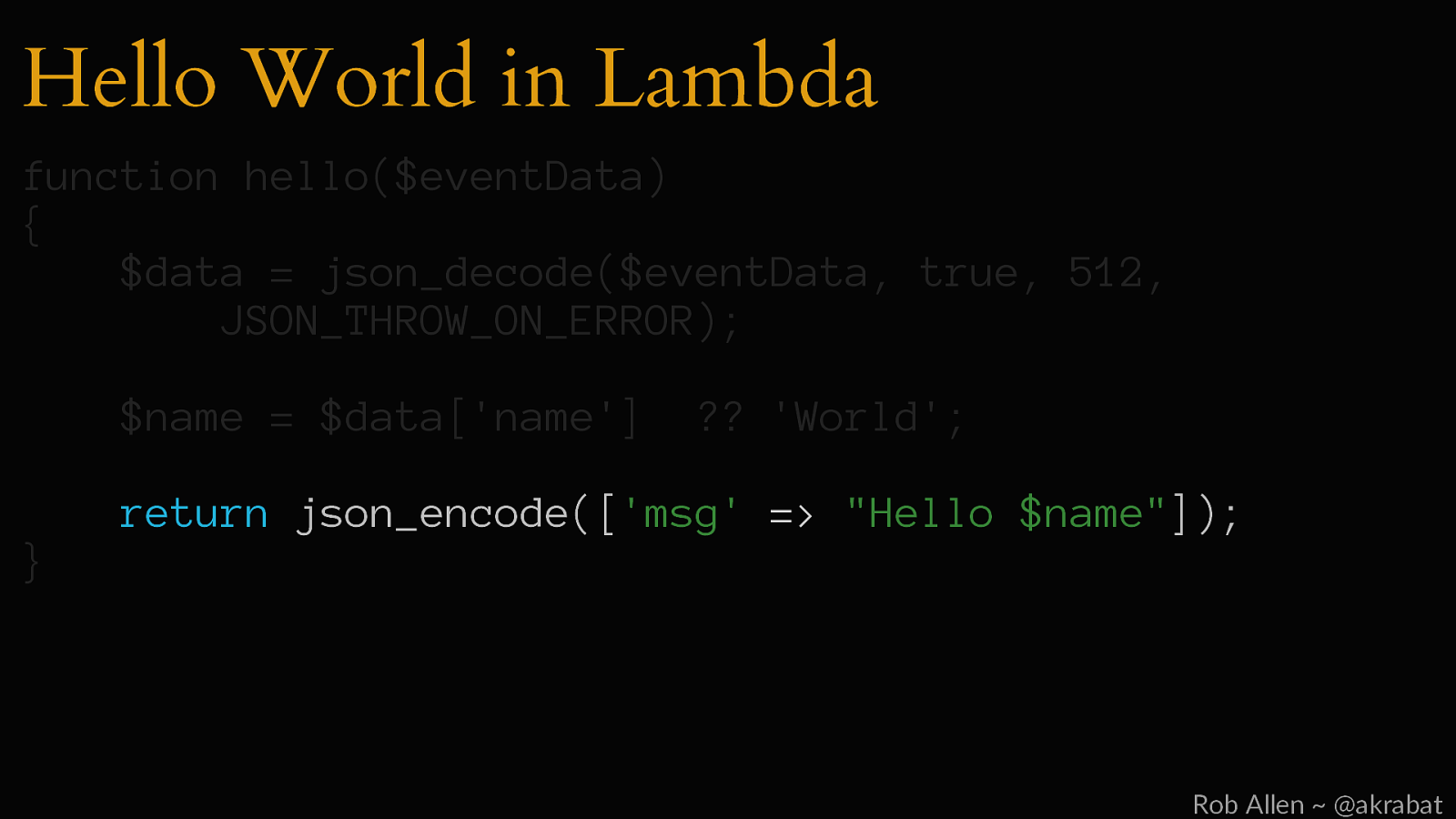
Hello World in Lambda function hello($eventData) { $data = json_decode($eventData, true, 512, JSON_THROW_ON_ERROR); $name = $data[‘name’] ?? ‘World’; return json_encode([‘msg’ => “Hello $name”]); } Rob Allen ~ @akrabat
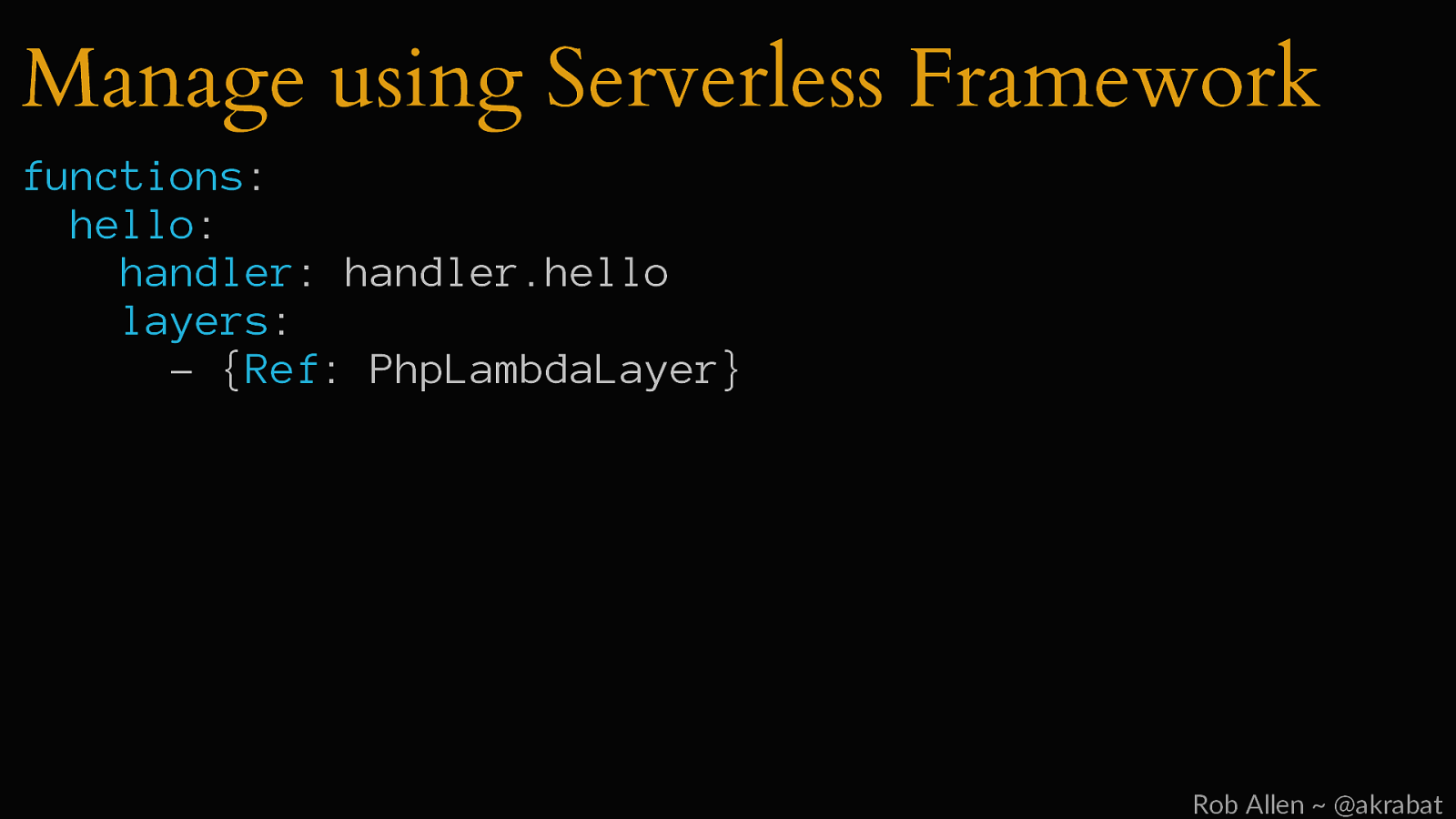
Manage using Serverless Framework functions: hello: handler: handler.hello layers: - {Ref: PhpLambdaLayer} Rob Allen ~ @akrabat
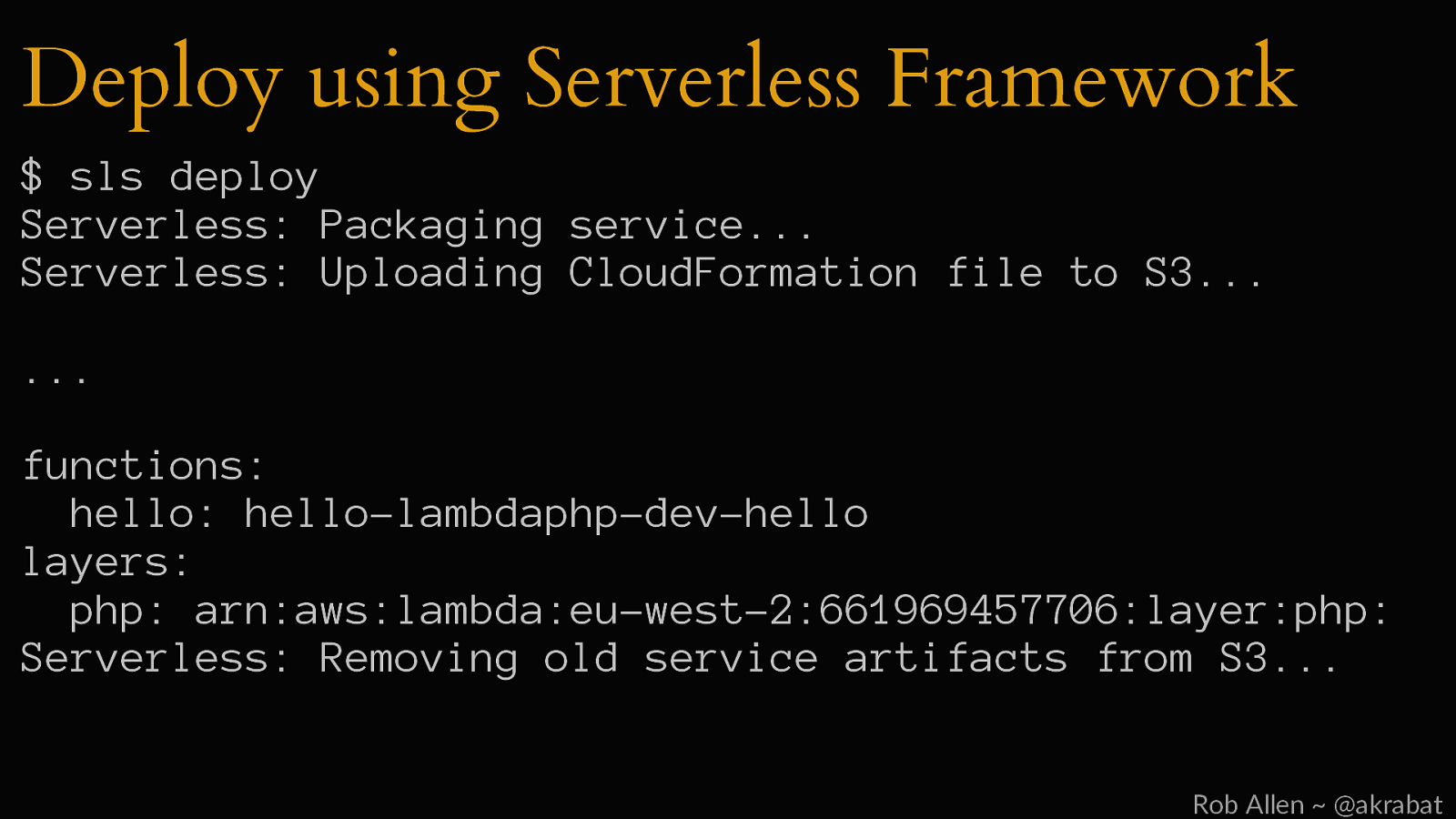
Deploy using Serverless Framework $ sls deploy Serverless: Packaging service… Serverless: Uploading CloudFormation file to S3… … functions: hello: hello-lambdaphp-dev-hello layers: php: arn:aws:lambda:eu-west-2:661969457706:layer:php: Serverless: Removing old service artifacts from S3… Rob Allen ~ @akrabat
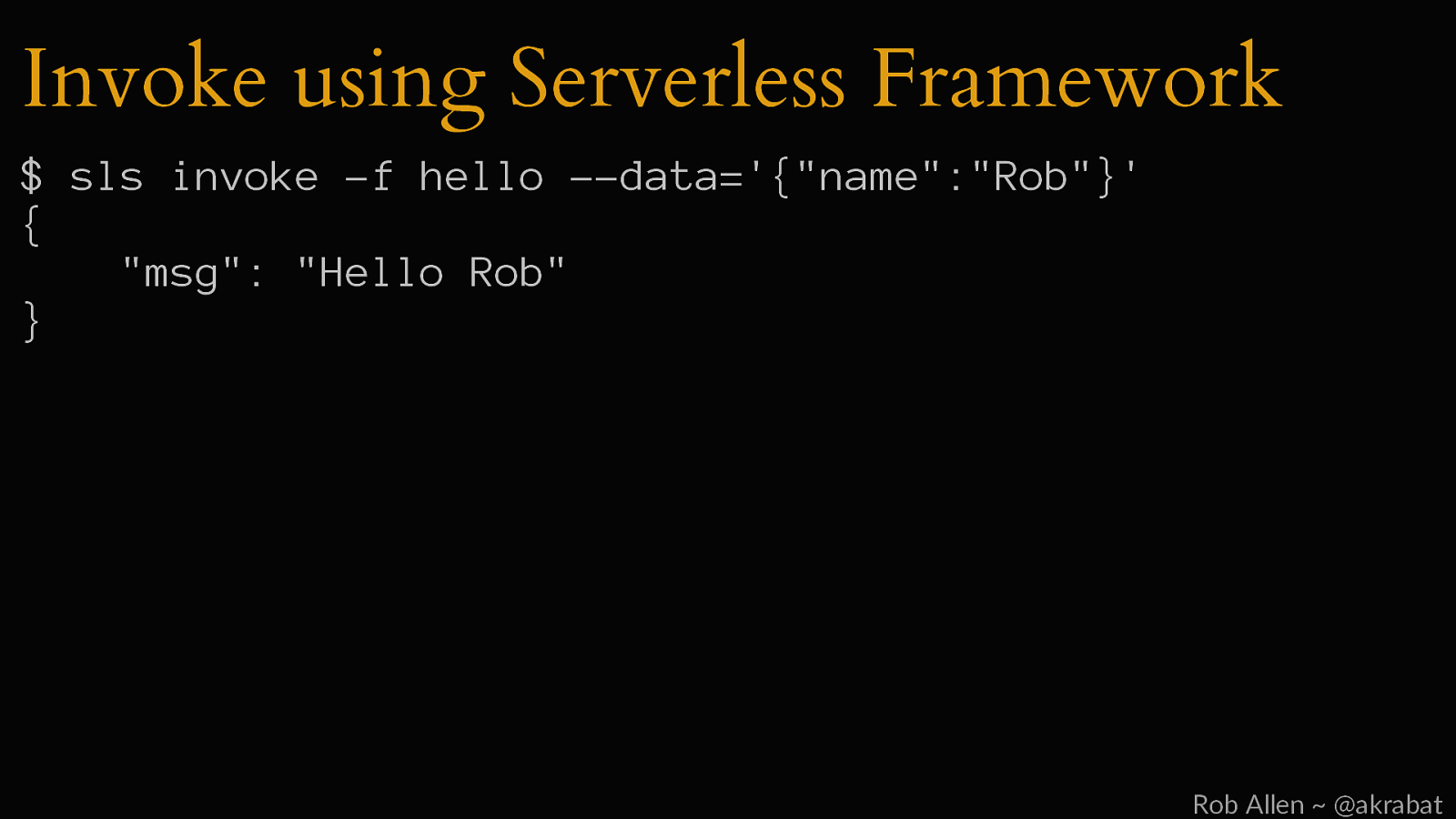
Invoke using Serverless Framework $ sls invoke -f hello —data=’{“name”:”Rob”}’ { “msg”: “Hello Rob” } Rob Allen ~ @akrabat
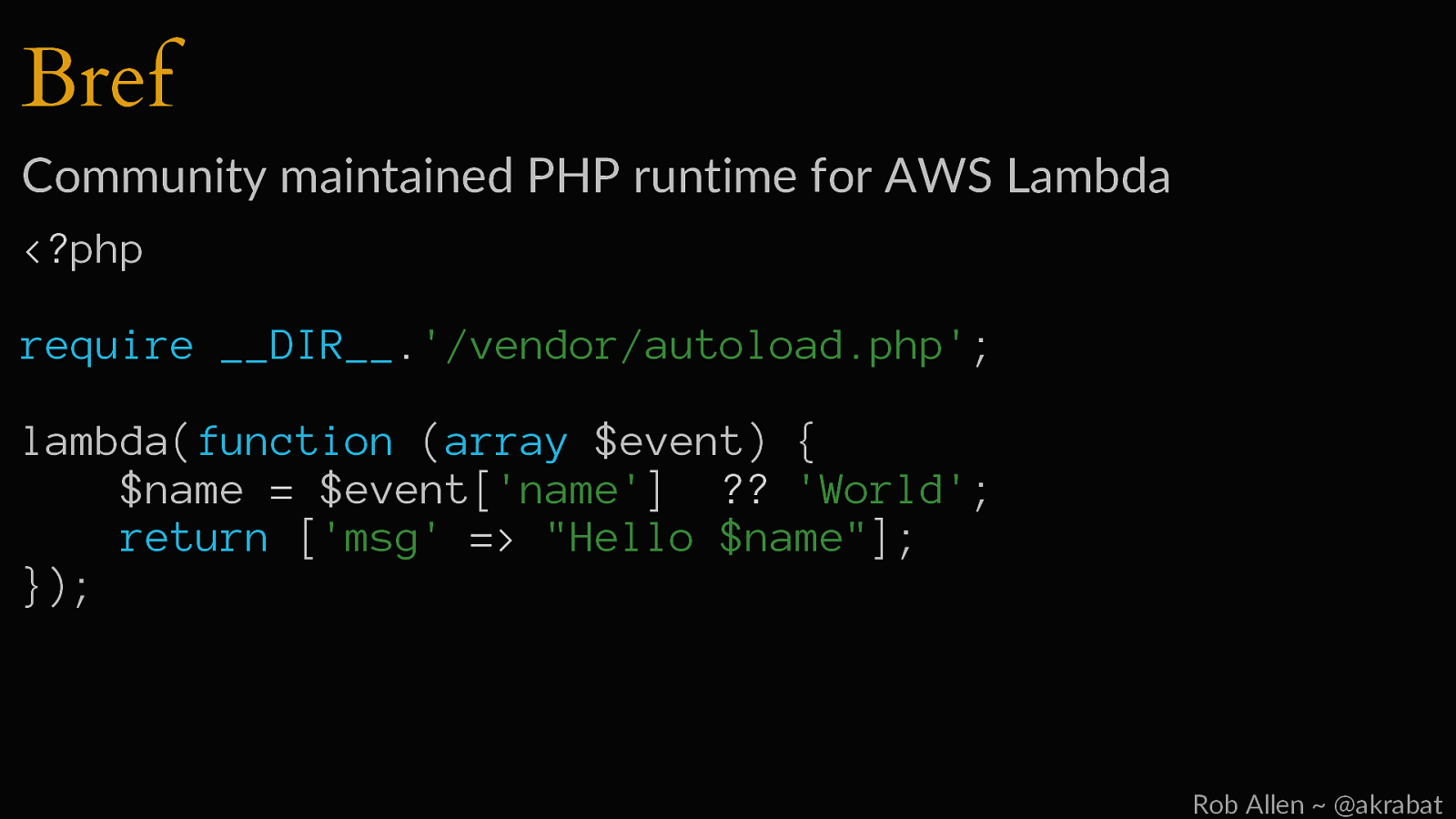
Bref Community maintained PHP runtime for AWS Lambda <?php require DIR.’/vendor/autoload.php’; lambda(function (array $event) { $name = $event[‘name’] ?? ‘World’; return [‘msg’ => “Hello $name”]; }); Rob Allen ~ @akrabat
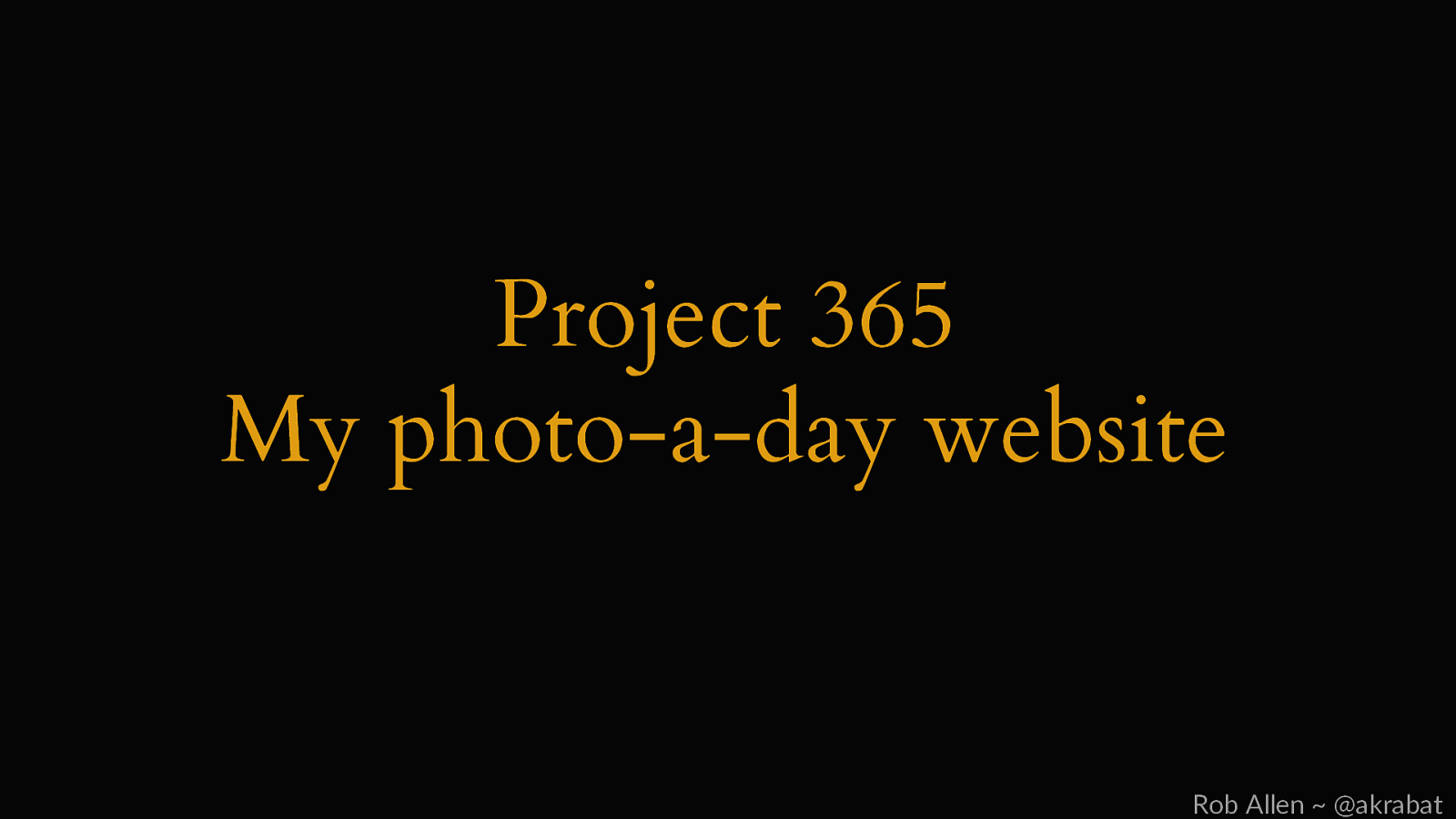
Project 365 My photo-a-day website Rob Allen ~ @akrabat
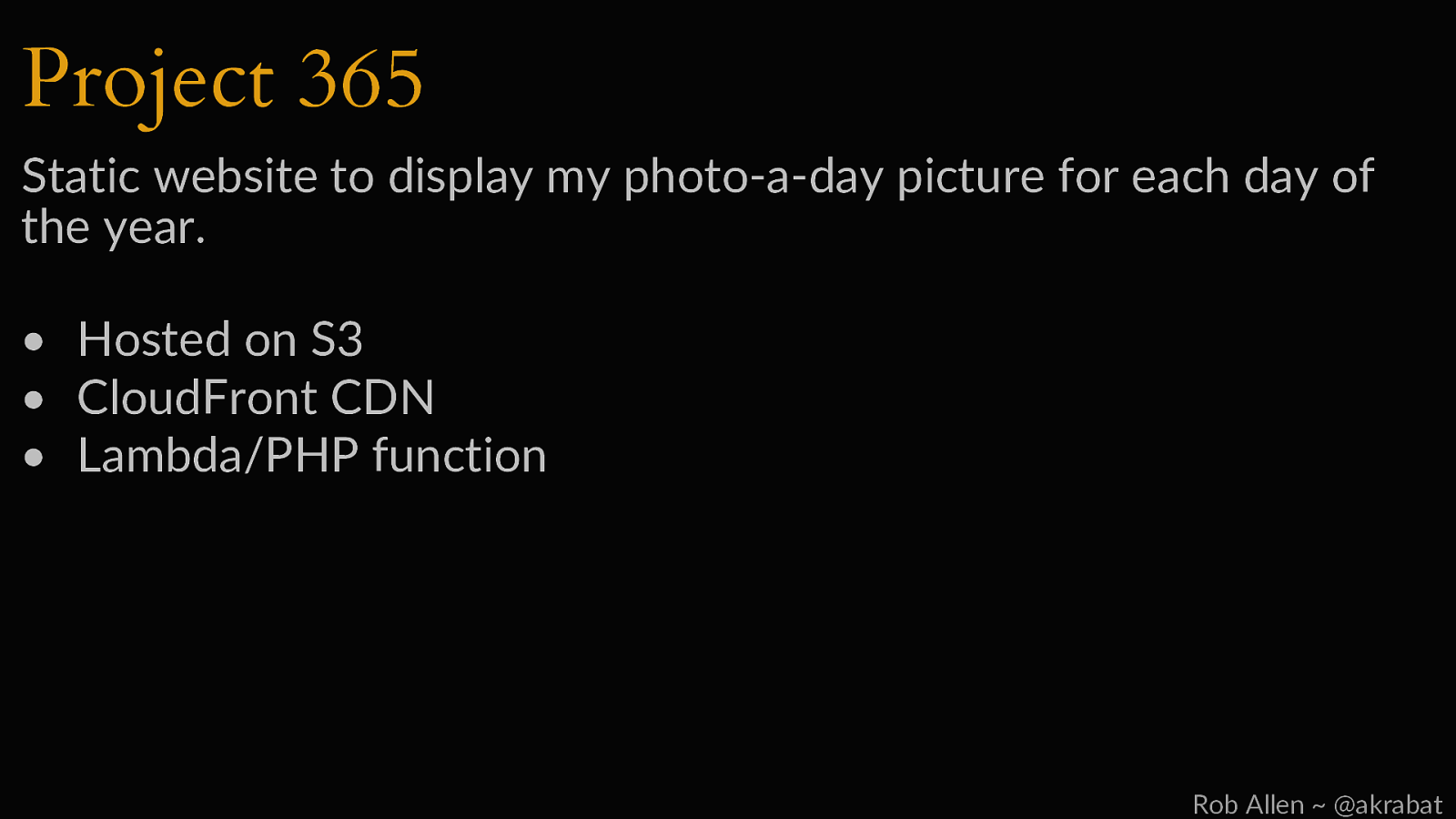
Project 365 Static website to display my photo-a-day picture for each day of the year. • Hosted on S3 • CloudFront CDN • Lambda/PHP function Rob Allen ~ @akrabat
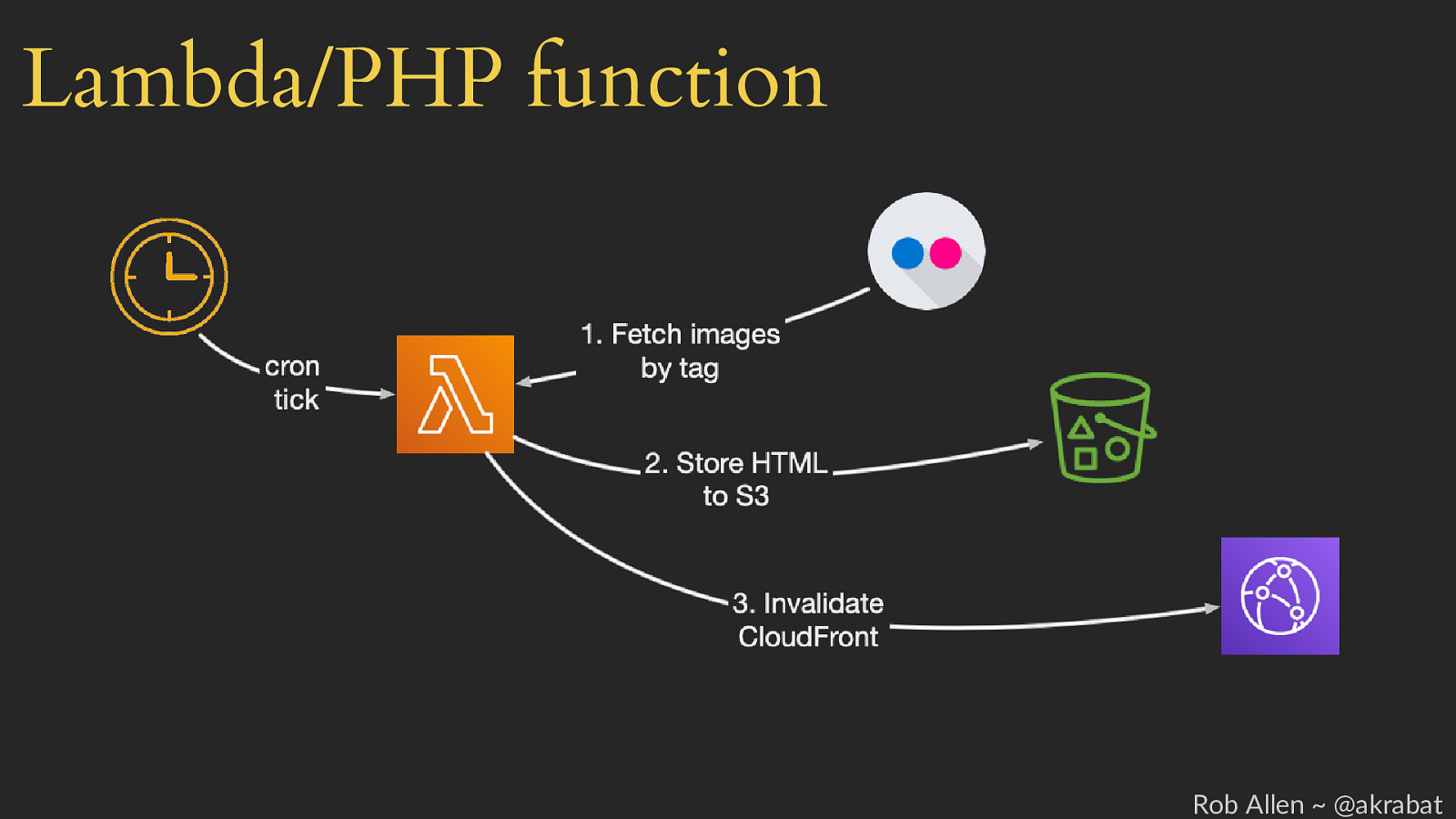
Lambda/PHP function Rob Allen ~ @akrabat
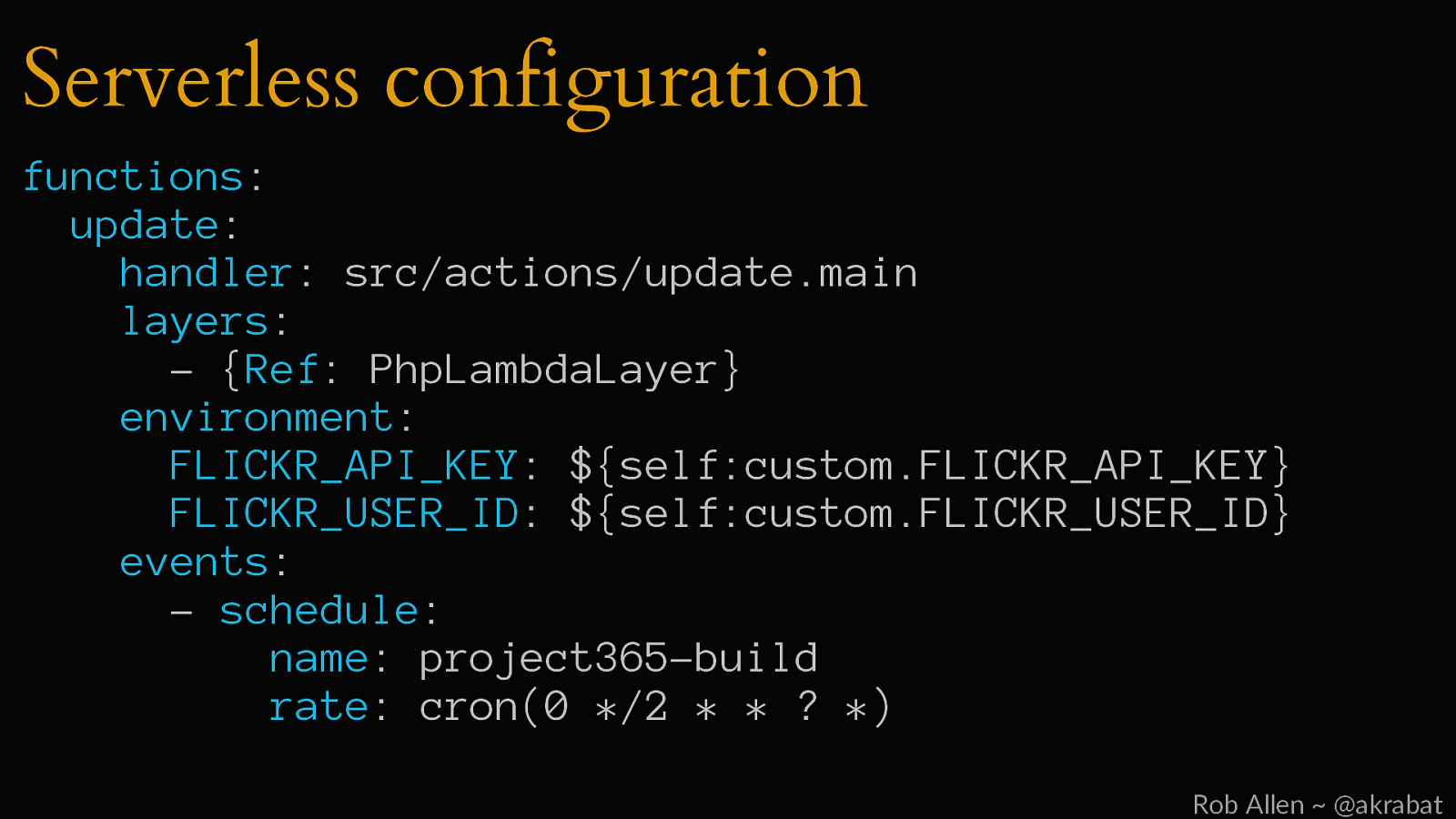
Serverless configuration functions: update: handler: src/actions/update.main layers: - {Ref: PhpLambdaLayer} environment: FLICKR_API_KEY: ${self:custom.FLICKR_API_KEY} FLICKR_USER_ID: ${self:custom.FLICKR_USER_ID} events: - schedule: name: project365-build rate: cron(0 */2 * * ? *) Rob Allen ~ @akrabat
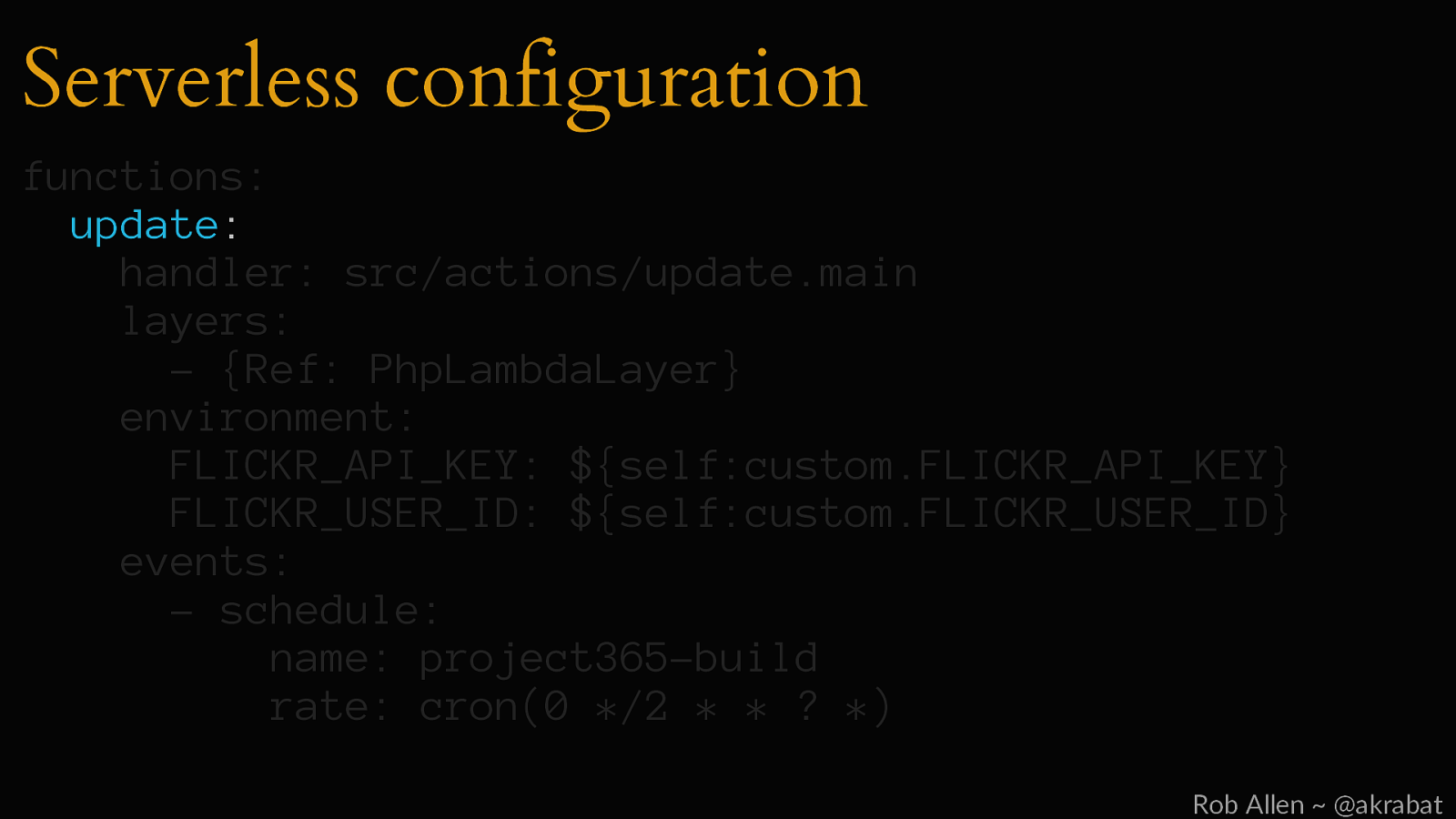
Serverless configuration functions: update: handler: src/actions/update.main layers: - {Ref: PhpLambdaLayer} environment: FLICKR_API_KEY: ${self:custom.FLICKR_API_KEY} FLICKR_USER_ID: ${self:custom.FLICKR_USER_ID} events: - schedule: name: project365-build rate: cron(0 */2 * * ? *) Rob Allen ~ @akrabat
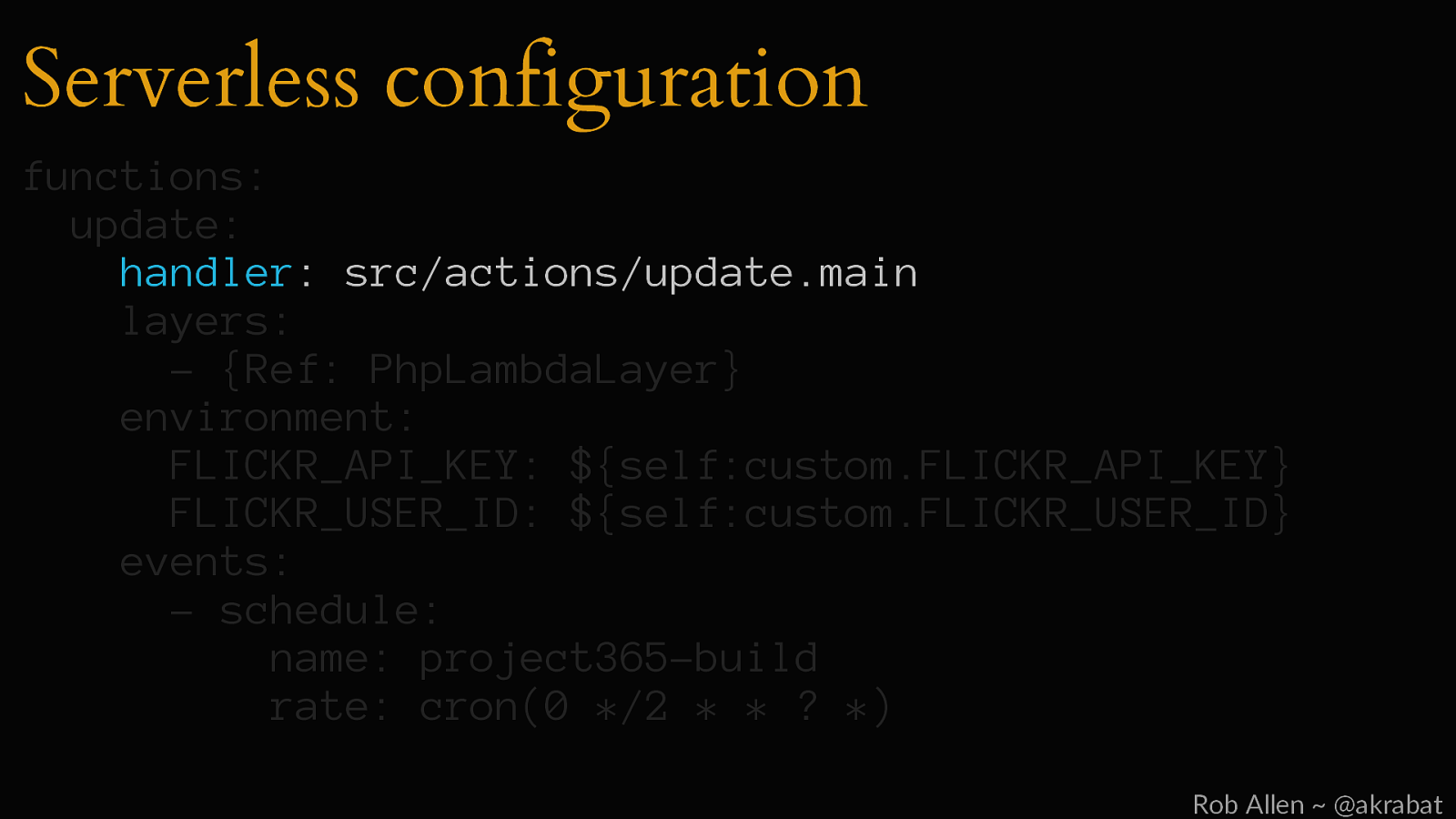
Serverless configuration functions: update: handler: src/actions/update.main layers: - {Ref: PhpLambdaLayer} environment: FLICKR_API_KEY: ${self:custom.FLICKR_API_KEY} FLICKR_USER_ID: ${self:custom.FLICKR_USER_ID} events: - schedule: name: project365-build rate: cron(0 */2 * * ? *) Rob Allen ~ @akrabat
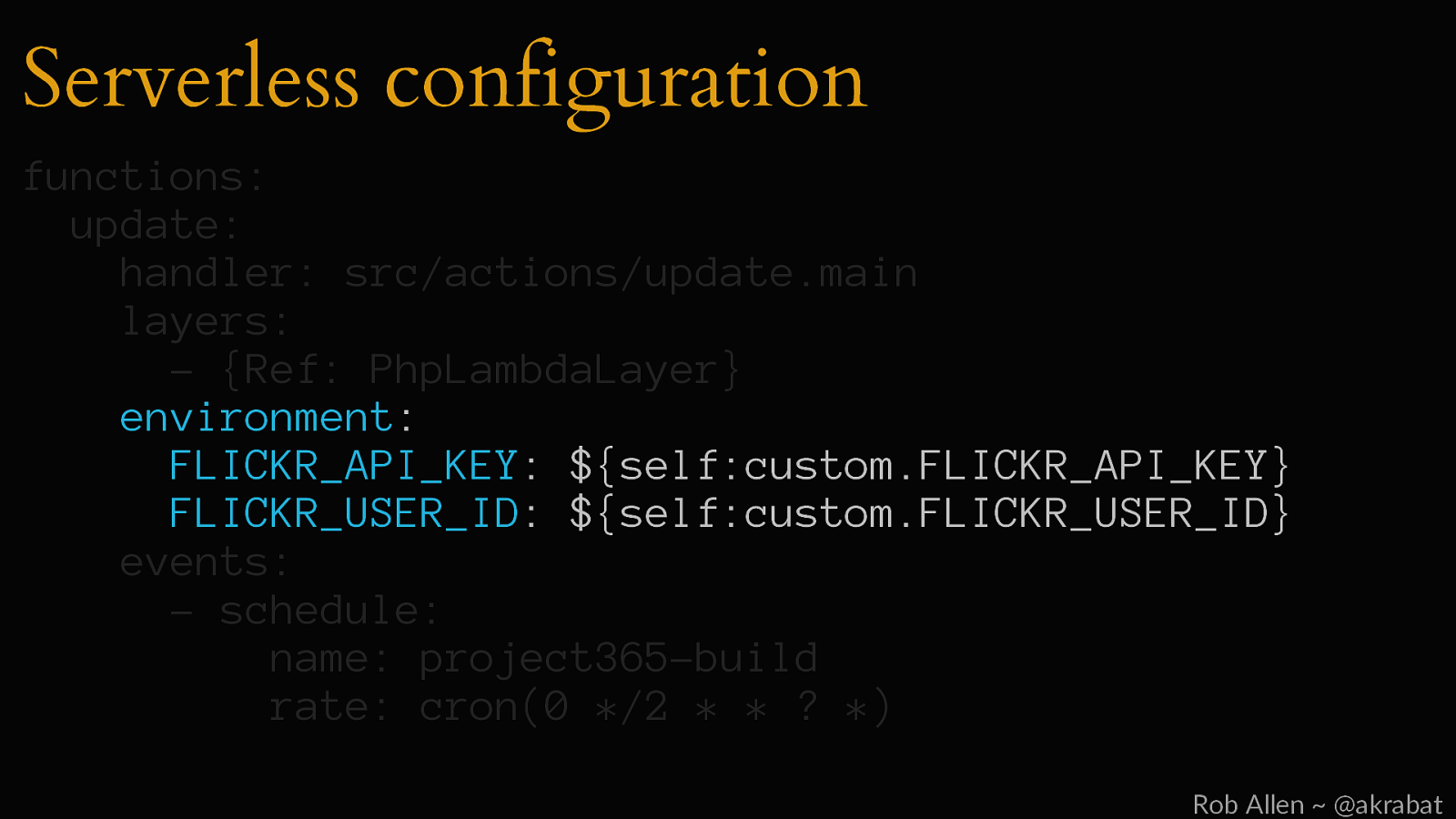
Serverless configuration functions: update: handler: src/actions/update.main layers: - {Ref: PhpLambdaLayer} environment: FLICKR_API_KEY: ${self:custom.FLICKR_API_KEY} FLICKR_USER_ID: ${self:custom.FLICKR_USER_ID} events: - schedule: name: project365-build rate: cron(0 */2 * * ? *) Rob Allen ~ @akrabat
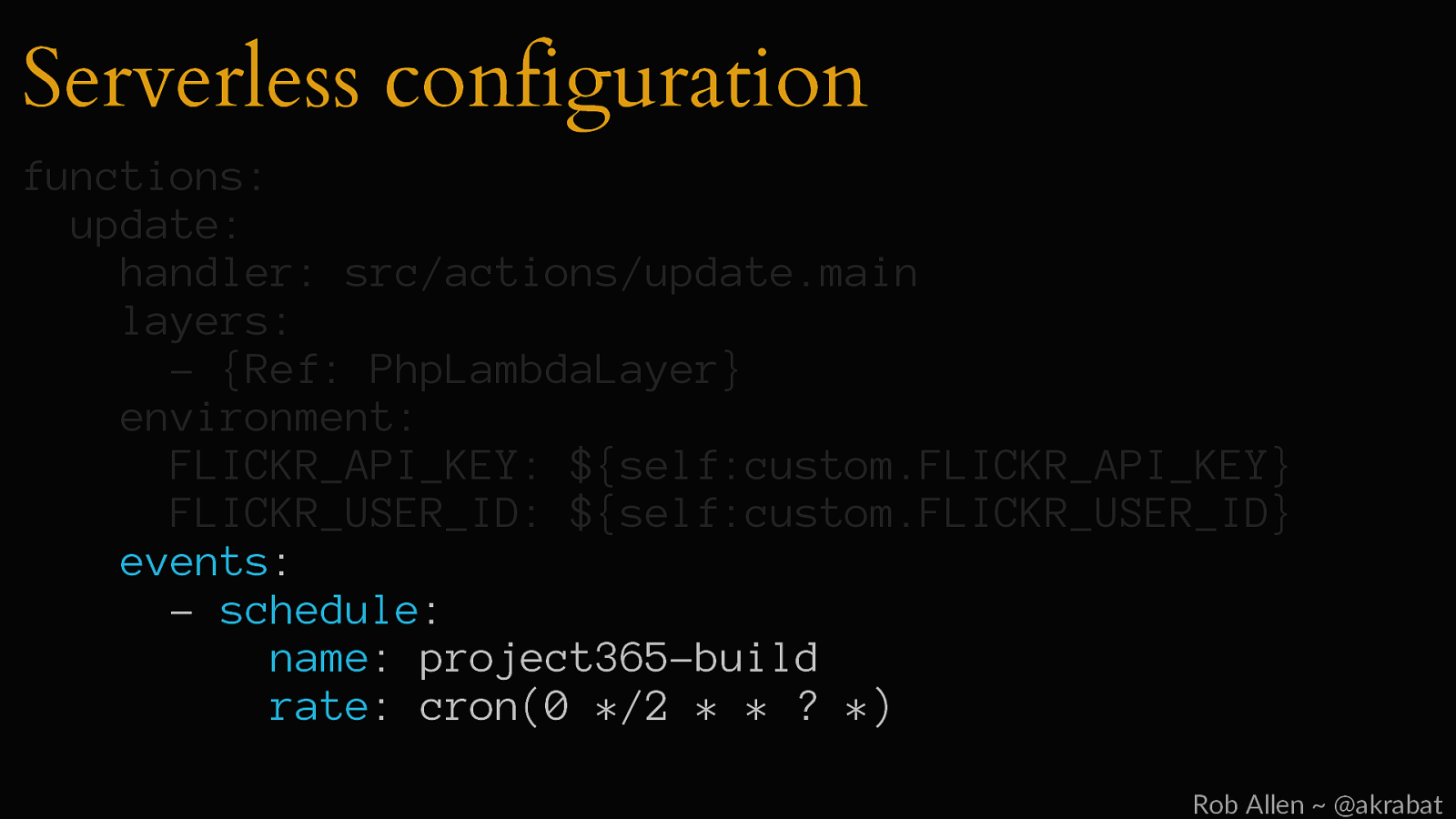
Serverless configuration functions: update: handler: src/actions/update.main layers: - {Ref: PhpLambdaLayer} environment: FLICKR_API_KEY: ${self:custom.FLICKR_API_KEY} FLICKR_USER_ID: ${self:custom.FLICKR_USER_ID} events: - schedule: name: project365-build rate: cron(0 */2 * * ? *) Rob Allen ~ @akrabat
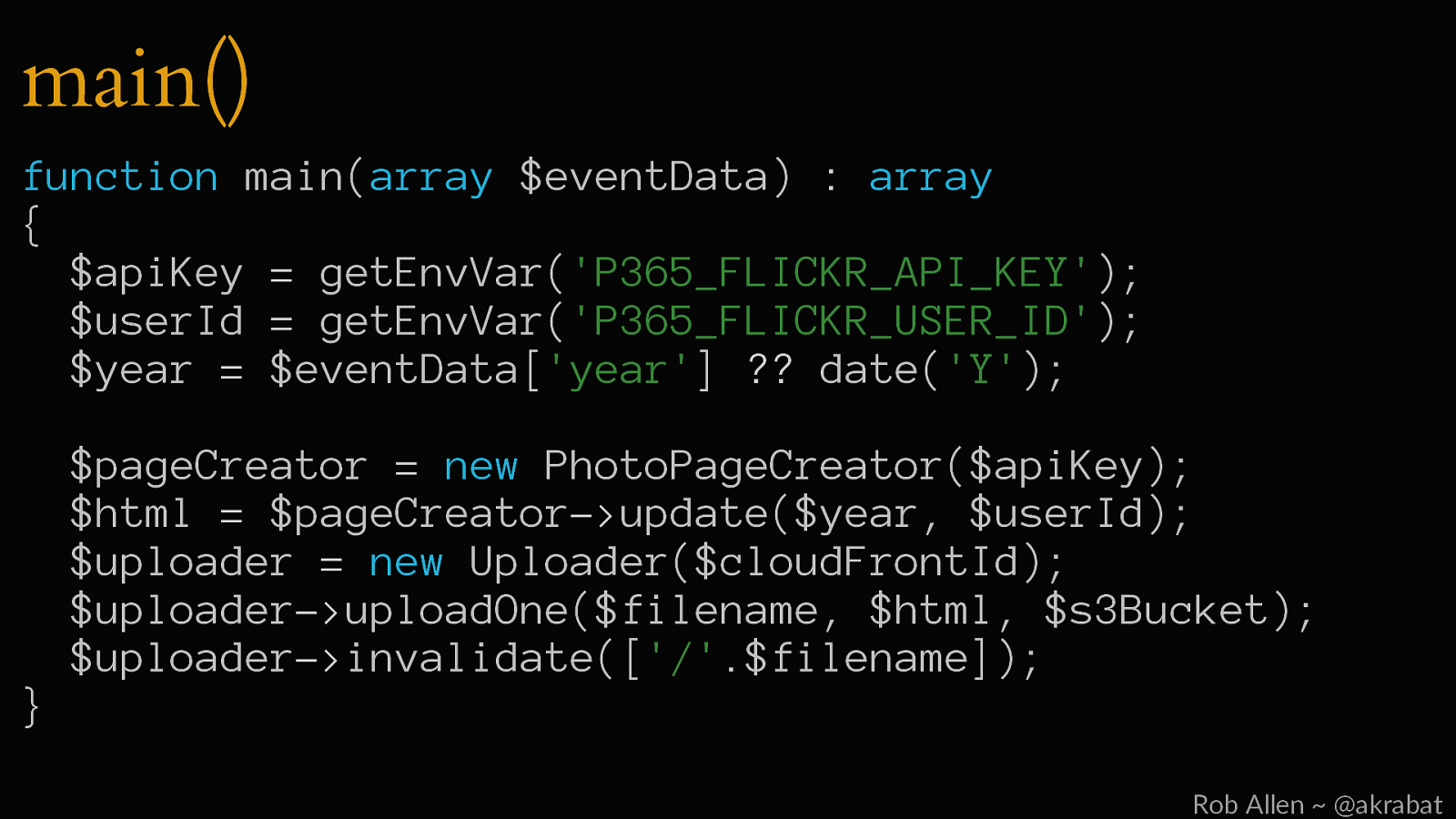
main() function main(array $eventData) : array { $apiKey = getEnvVar(‘P365_FLICKR_API_KEY’); $userId = getEnvVar(‘P365_FLICKR_USER_ID’); $year = $eventData[‘year’] ?? date(‘Y’); $pageCreator = new PhotoPageCreator($apiKey); $html = $pageCreator->update($year, $userId); $uploader = new Uploader($cloudFrontId); $uploader->uploadOne($filename, $html, $s3Bucket); $uploader->invalidate([‘/’.$filename]); } Rob Allen ~ @akrabat
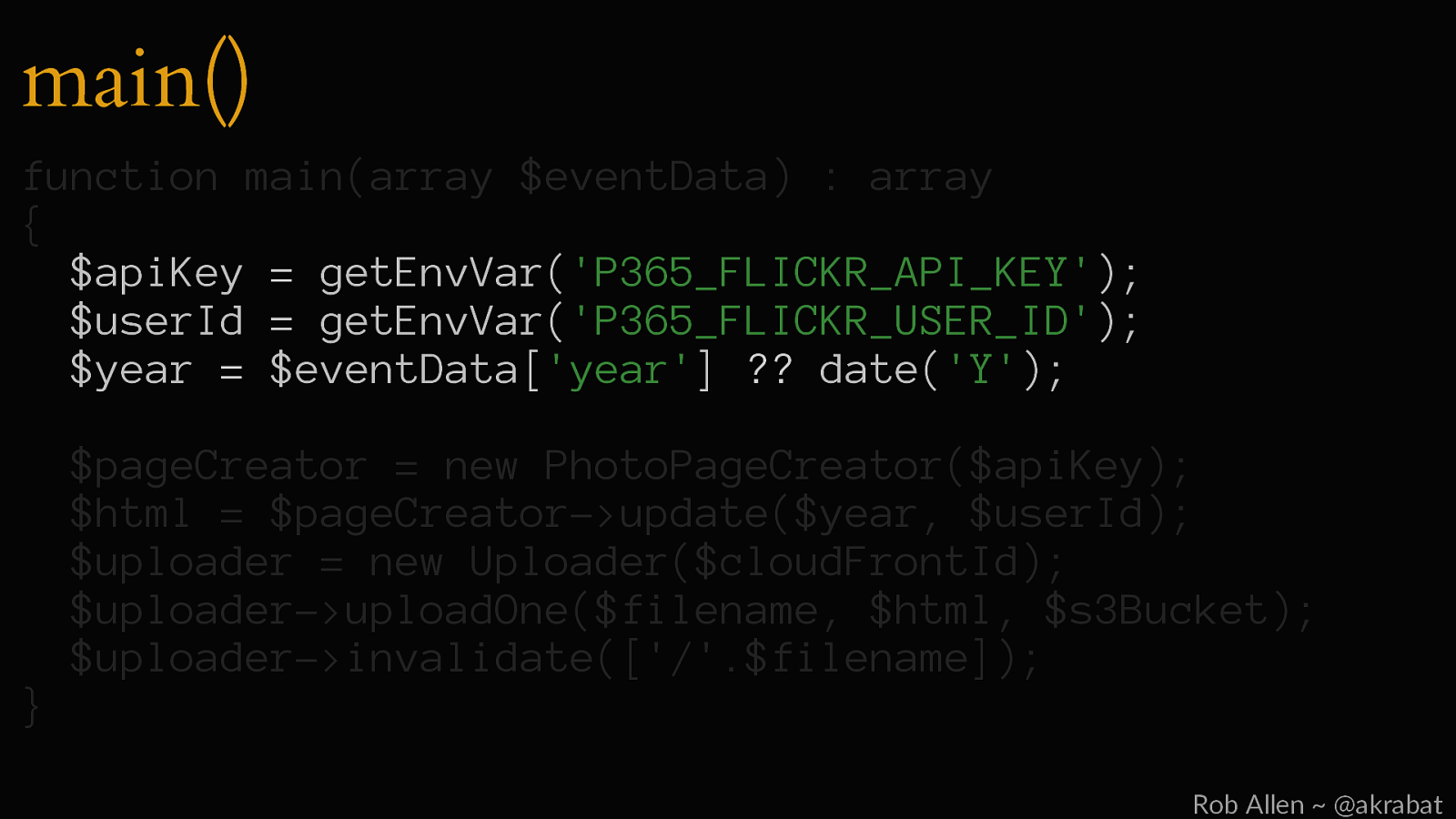
main() function main(array $eventData) : array { $apiKey = getEnvVar(‘P365_FLICKR_API_KEY’); $userId = getEnvVar(‘P365_FLICKR_USER_ID’); $year = $eventData[‘year’] ?? date(‘Y’); $pageCreator = new PhotoPageCreator($apiKey); $html = $pageCreator->update($year, $userId); $uploader = new Uploader($cloudFrontId); $uploader->uploadOne($filename, $html, $s3Bucket); $uploader->invalidate([‘/’.$filename]); } Rob Allen ~ @akrabat
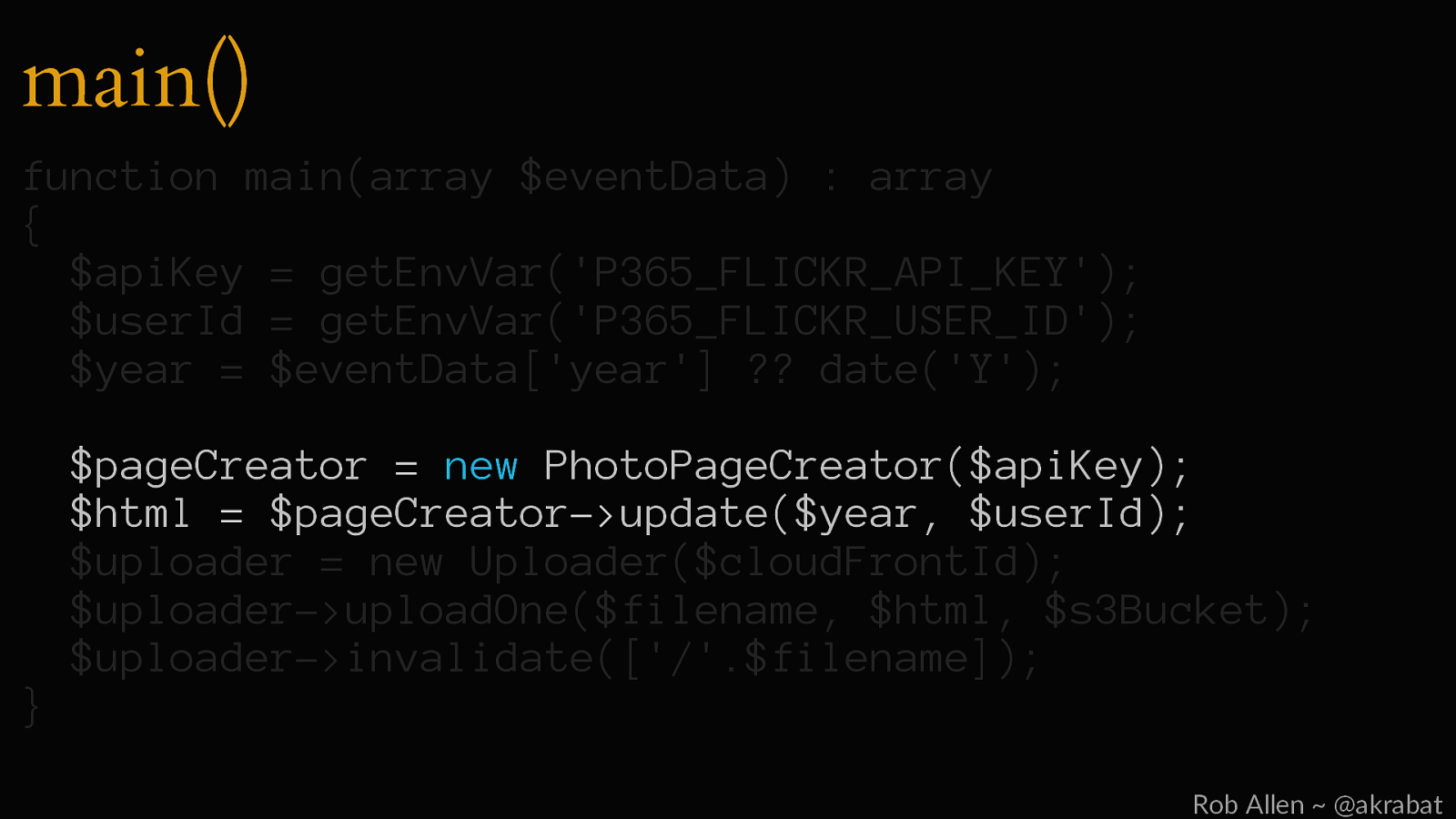
main() function main(array $eventData) : array { $apiKey = getEnvVar(‘P365_FLICKR_API_KEY’); $userId = getEnvVar(‘P365_FLICKR_USER_ID’); $year = $eventData[‘year’] ?? date(‘Y’); $pageCreator = new PhotoPageCreator($apiKey); $html = $pageCreator->update($year, $userId); $uploader = new Uploader($cloudFrontId); $uploader->uploadOne($filename, $html, $s3Bucket); $uploader->invalidate([‘/’.$filename]); } Rob Allen ~ @akrabat
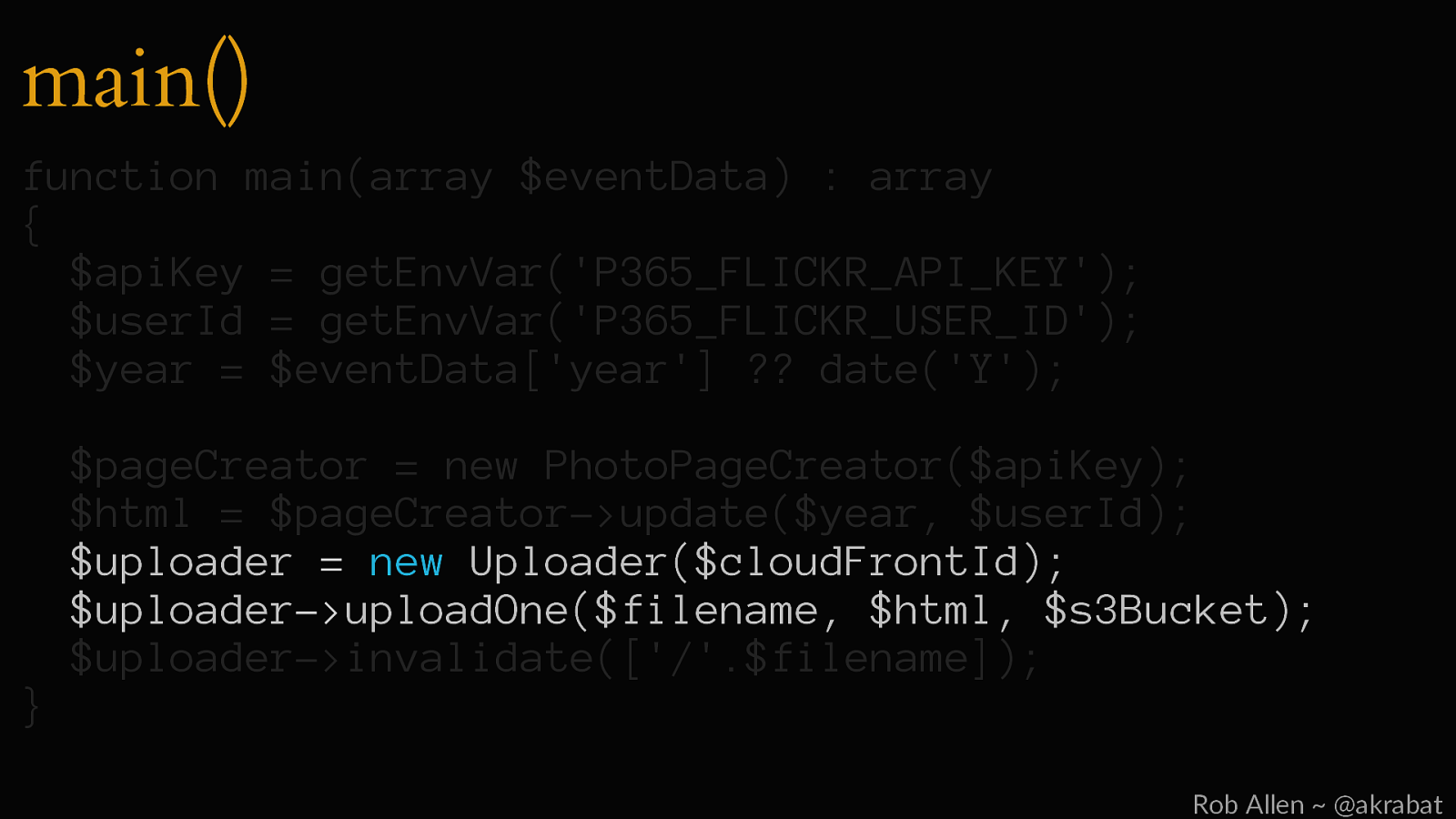
main() function main(array $eventData) : array { $apiKey = getEnvVar(‘P365_FLICKR_API_KEY’); $userId = getEnvVar(‘P365_FLICKR_USER_ID’); $year = $eventData[‘year’] ?? date(‘Y’); $pageCreator = new PhotoPageCreator($apiKey); $html = $pageCreator->update($year, $userId); $uploader = new Uploader($cloudFrontId); $uploader->uploadOne($filename, $html, $s3Bucket); $uploader->invalidate([‘/’.$filename]); } Rob Allen ~ @akrabat
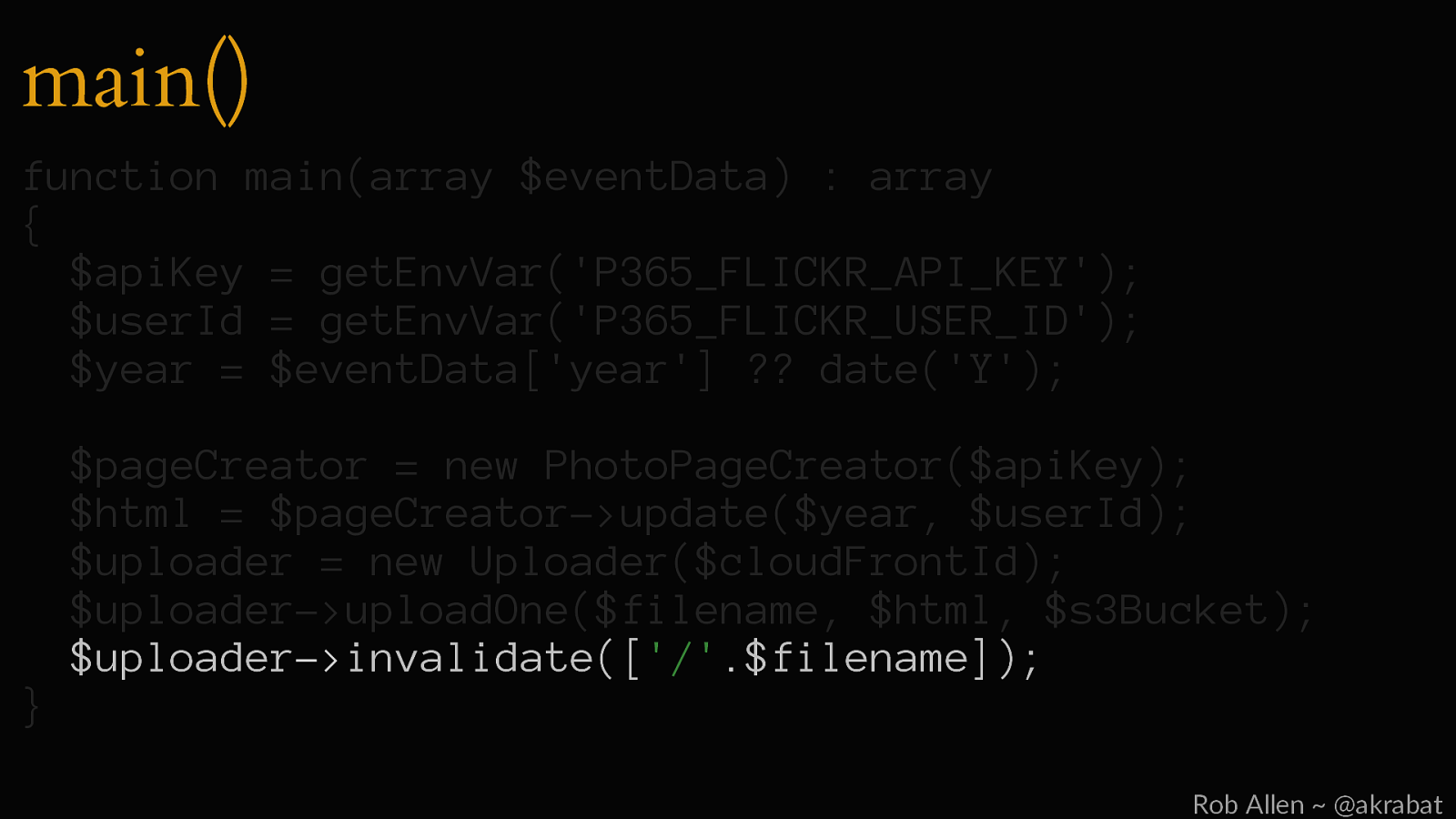
main() function main(array $eventData) : array { $apiKey = getEnvVar(‘P365_FLICKR_API_KEY’); $userId = getEnvVar(‘P365_FLICKR_USER_ID’); $year = $eventData[‘year’] ?? date(‘Y’); $pageCreator = new PhotoPageCreator($apiKey); $html = $pageCreator->update($year, $userId); $uploader = new Uploader($cloudFrontId); $uploader->uploadOne($filename, $html, $s3Bucket); $uploader->invalidate([‘/’.$filename]); } Rob Allen ~ @akrabat
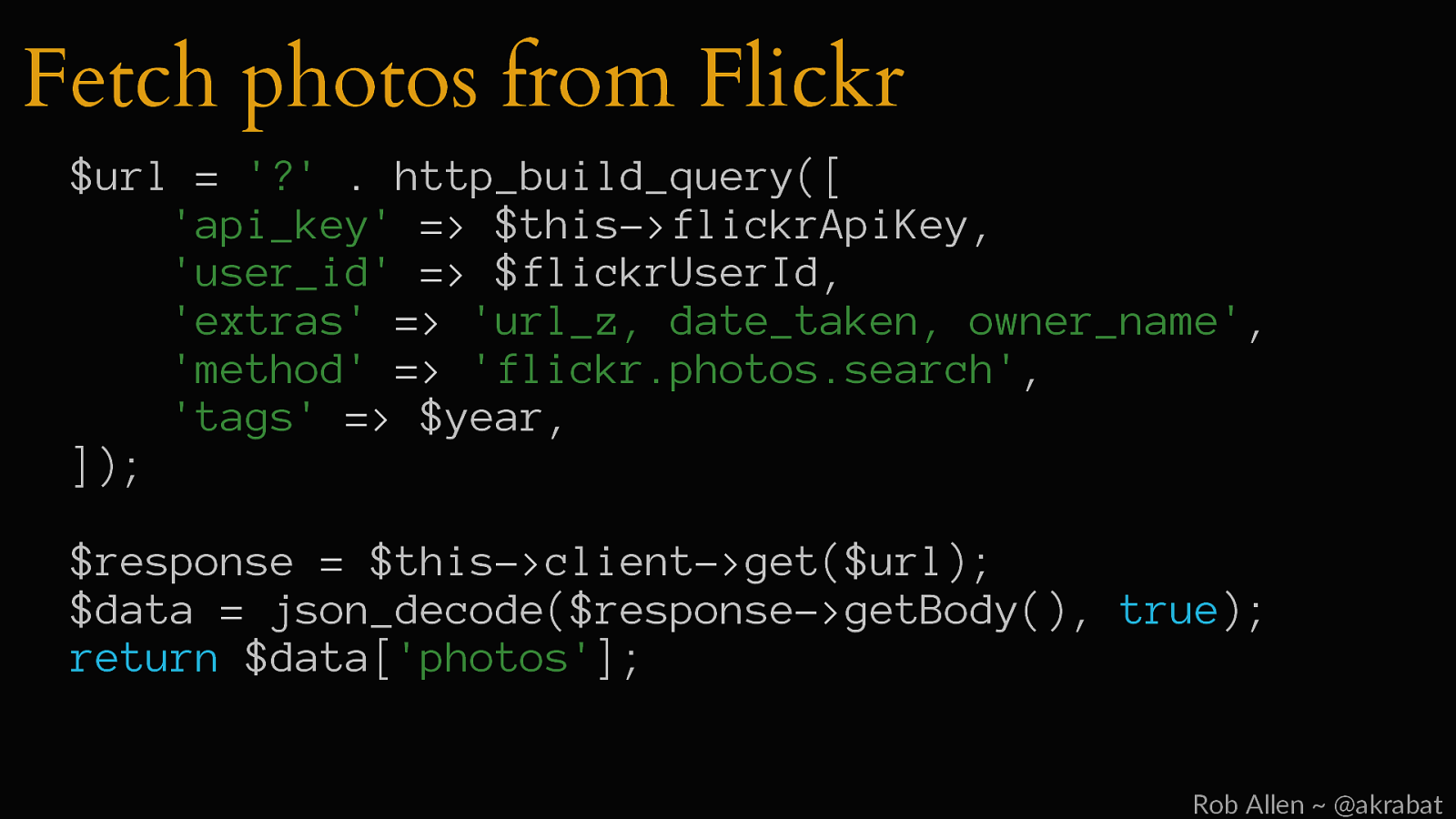
Fetch photos from Flickr $url = ‘?’ . http_build_query([ ‘api_key’ => $this->flickrApiKey, ‘user_id’ => $flickrUserId, ‘extras’ => ‘url_z, date_taken, owner_name’, ‘method’ => ‘flickr.photos.search’, ‘tags’ => $year, ]); $response = $this->client->get($url); $data = json_decode($response->getBody(), true); return $data[‘photos’]; Rob Allen ~ @akrabat
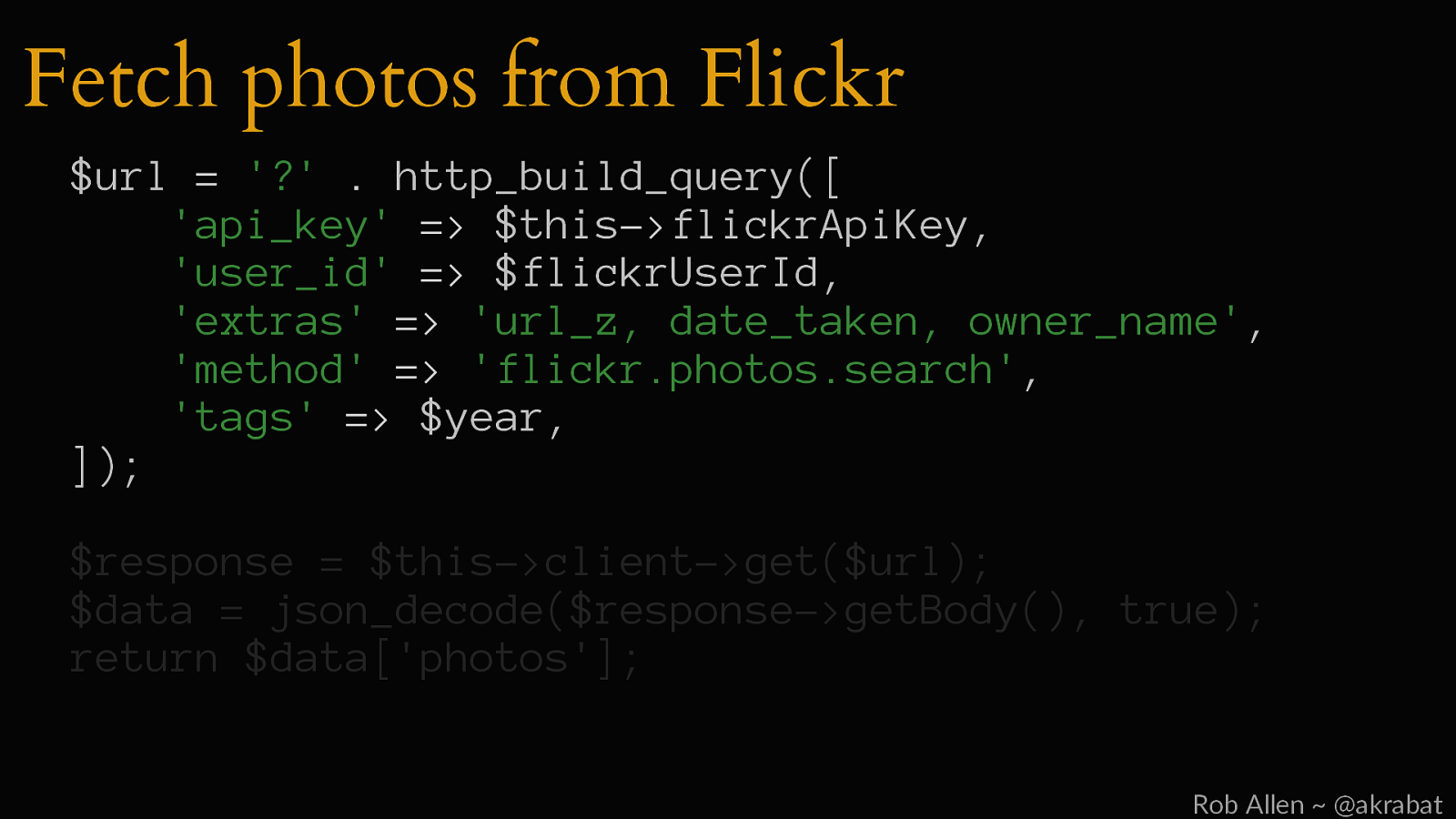
Fetch photos from Flickr $url = ‘?’ . http_build_query([ ‘api_key’ => $this->flickrApiKey, ‘user_id’ => $flickrUserId, ‘extras’ => ‘url_z, date_taken, owner_name’, ‘method’ => ‘flickr.photos.search’, ‘tags’ => $year, ]); $response = $this->client->get($url); $data = json_decode($response->getBody(), true); return $data[‘photos’]; Rob Allen ~ @akrabat
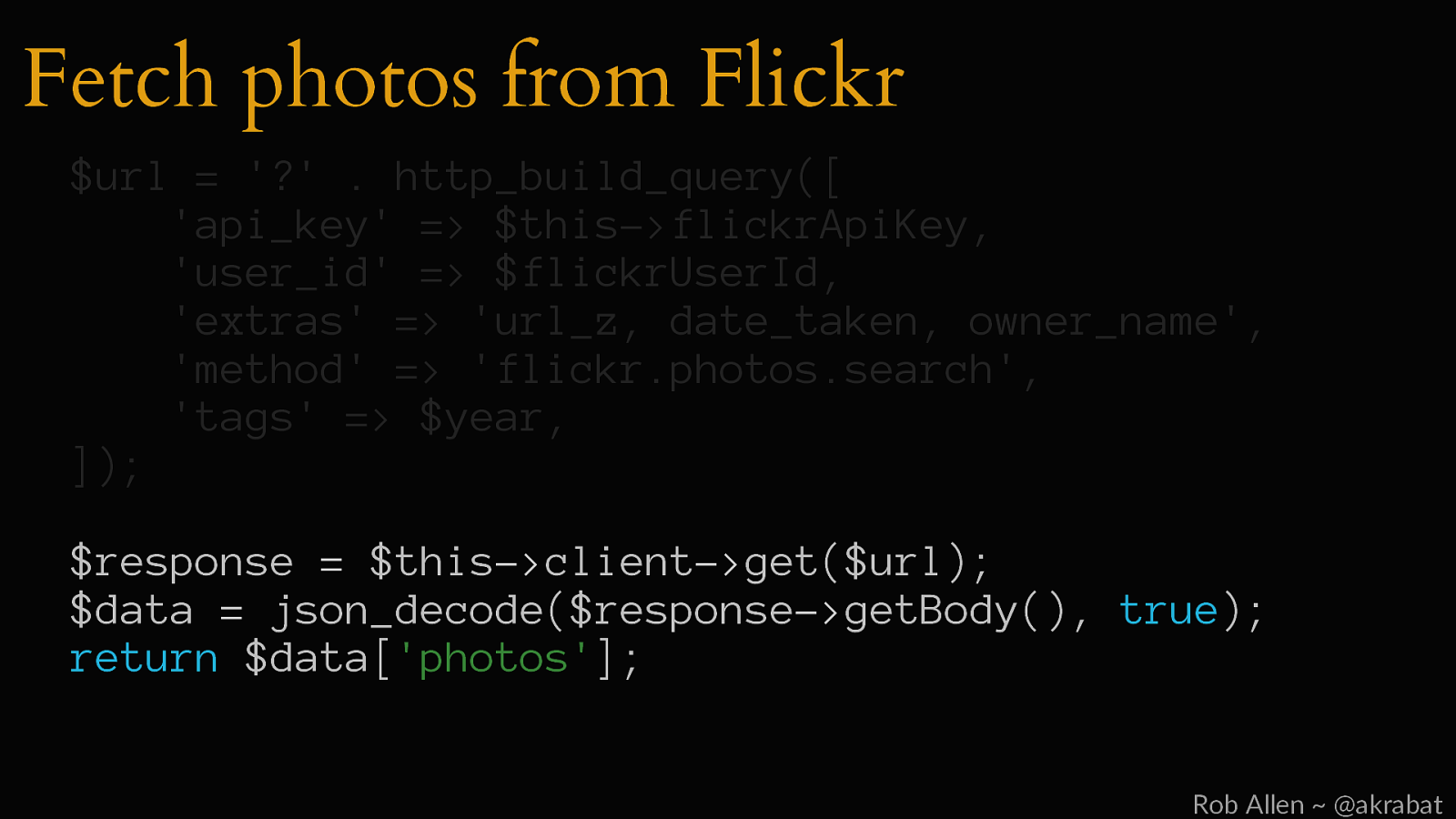
Fetch photos from Flickr $url = ‘?’ . http_build_query([ ‘api_key’ => $this->flickrApiKey, ‘user_id’ => $flickrUserId, ‘extras’ => ‘url_z, date_taken, owner_name’, ‘method’ => ‘flickr.photos.search’, ‘tags’ => $year, ]); $response = $this->client->get($url); $data = json_decode($response->getBody(), true); return $data[‘photos’]; Rob Allen ~ @akrabat
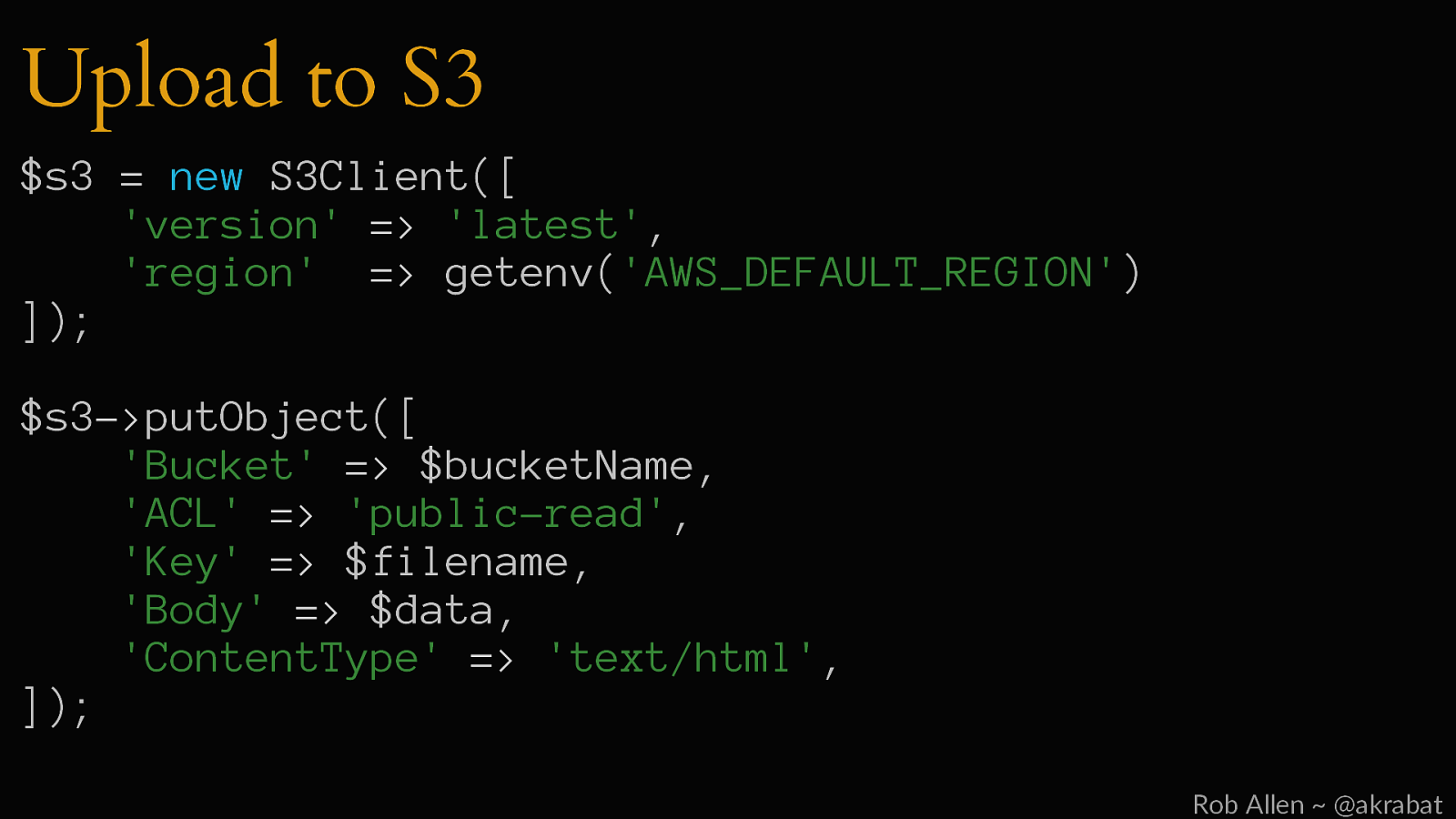
Upload to S3 $s3 = new S3Client([ ‘version’ => ‘latest’, ‘region’ => getenv(‘AWS_DEFAULT_REGION’) ]); $s3->putObject([ ‘Bucket’ => $bucketName, ‘ACL’ => ‘public-read’, ‘Key’ => $filename, ‘Body’ => $data, ‘ContentType’ => ‘text/html’, ]); Rob Allen ~ @akrabat
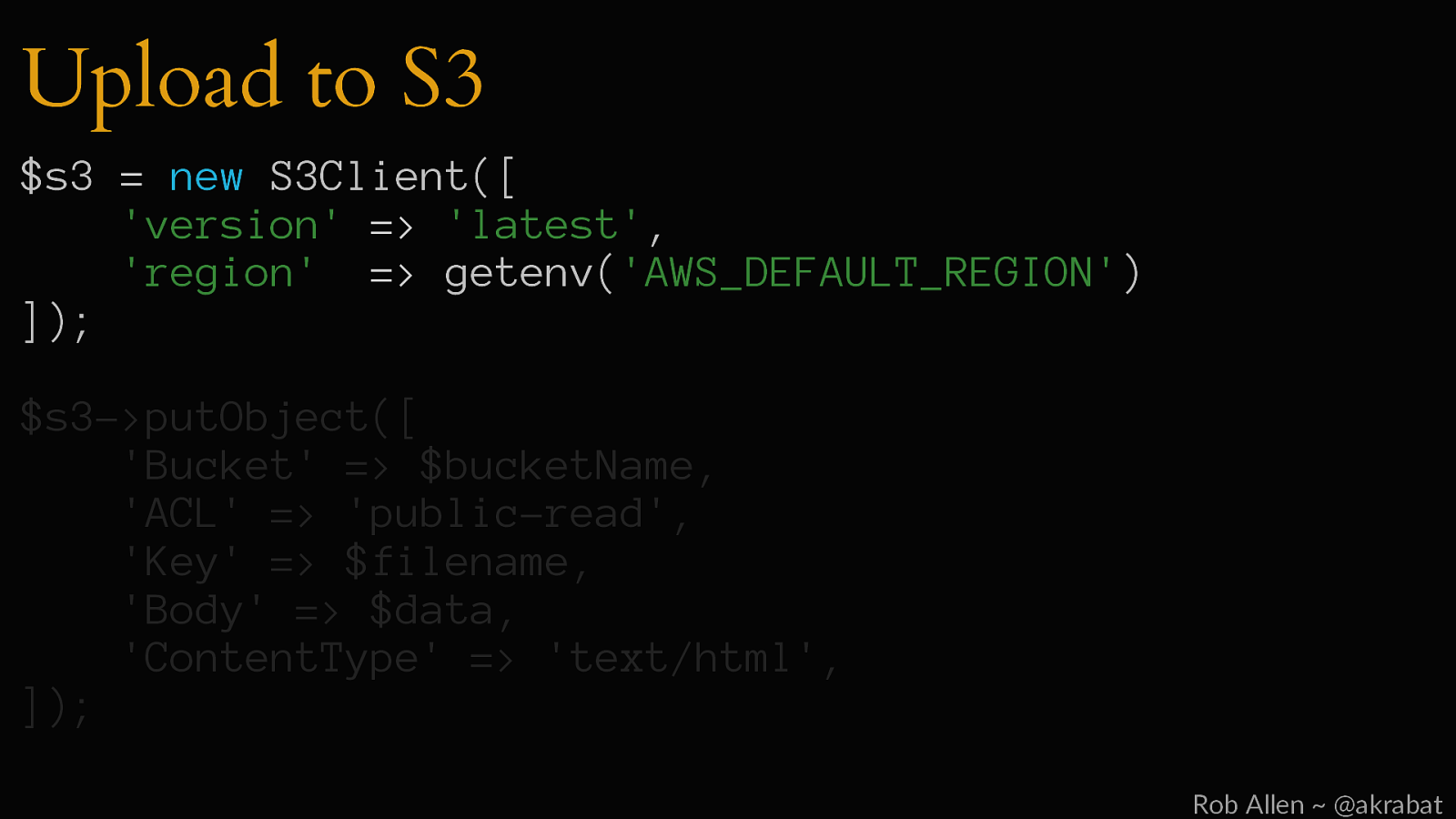
Upload to S3 $s3 = new S3Client([ ‘version’ => ‘latest’, ‘region’ => getenv(‘AWS_DEFAULT_REGION’) ]); $s3->putObject([ ‘Bucket’ => $bucketName, ‘ACL’ => ‘public-read’, ‘Key’ => $filename, ‘Body’ => $data, ‘ContentType’ => ‘text/html’, ]); Rob Allen ~ @akrabat
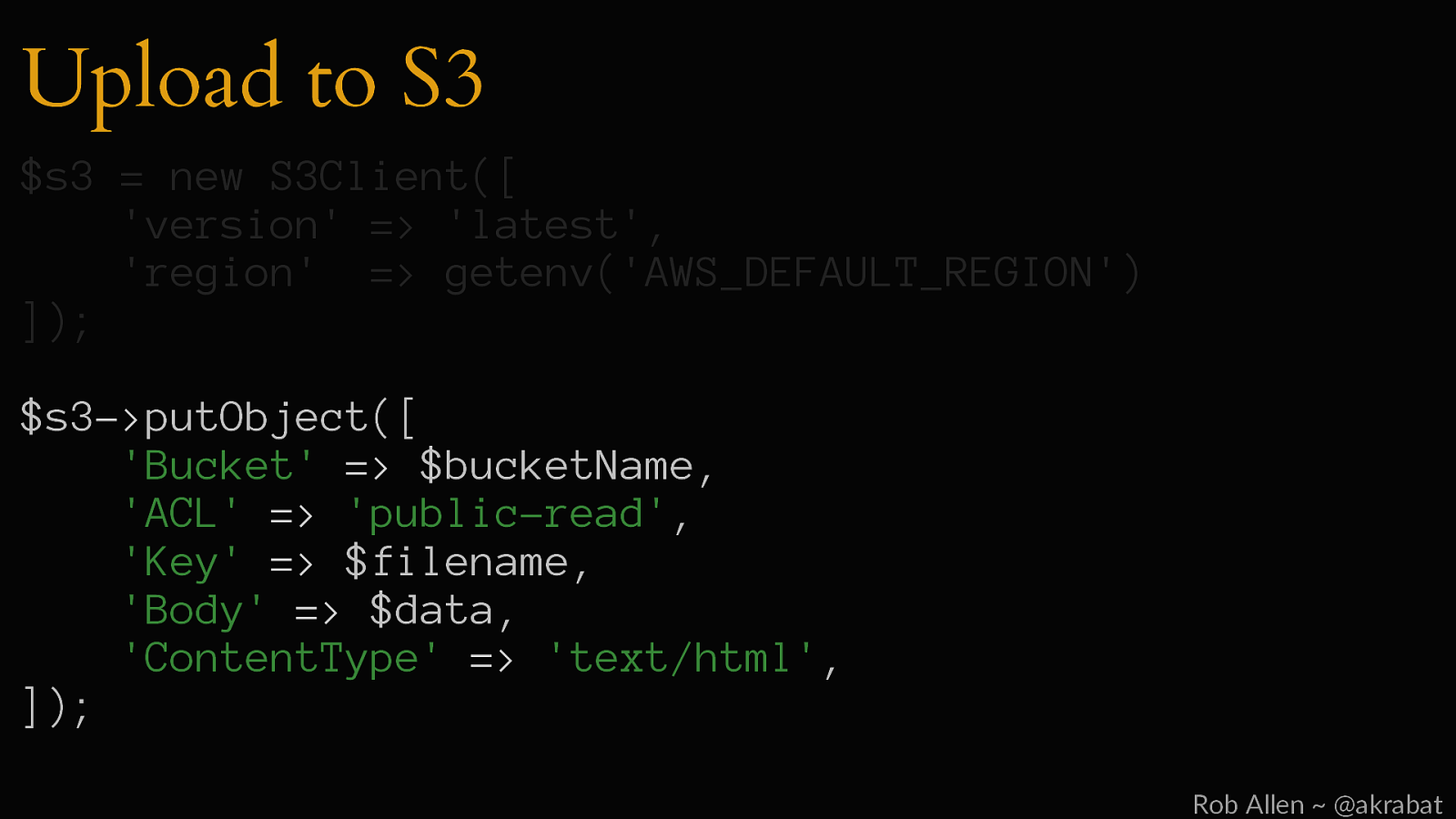
Upload to S3 $s3 = new S3Client([ ‘version’ => ‘latest’, ‘region’ => getenv(‘AWS_DEFAULT_REGION’) ]); $s3->putObject([ ‘Bucket’ => $bucketName, ‘ACL’ => ‘public-read’, ‘Key’ => $filename, ‘Body’ => $data, ‘ContentType’ => ‘text/html’, ]); Rob Allen ~ @akrabat
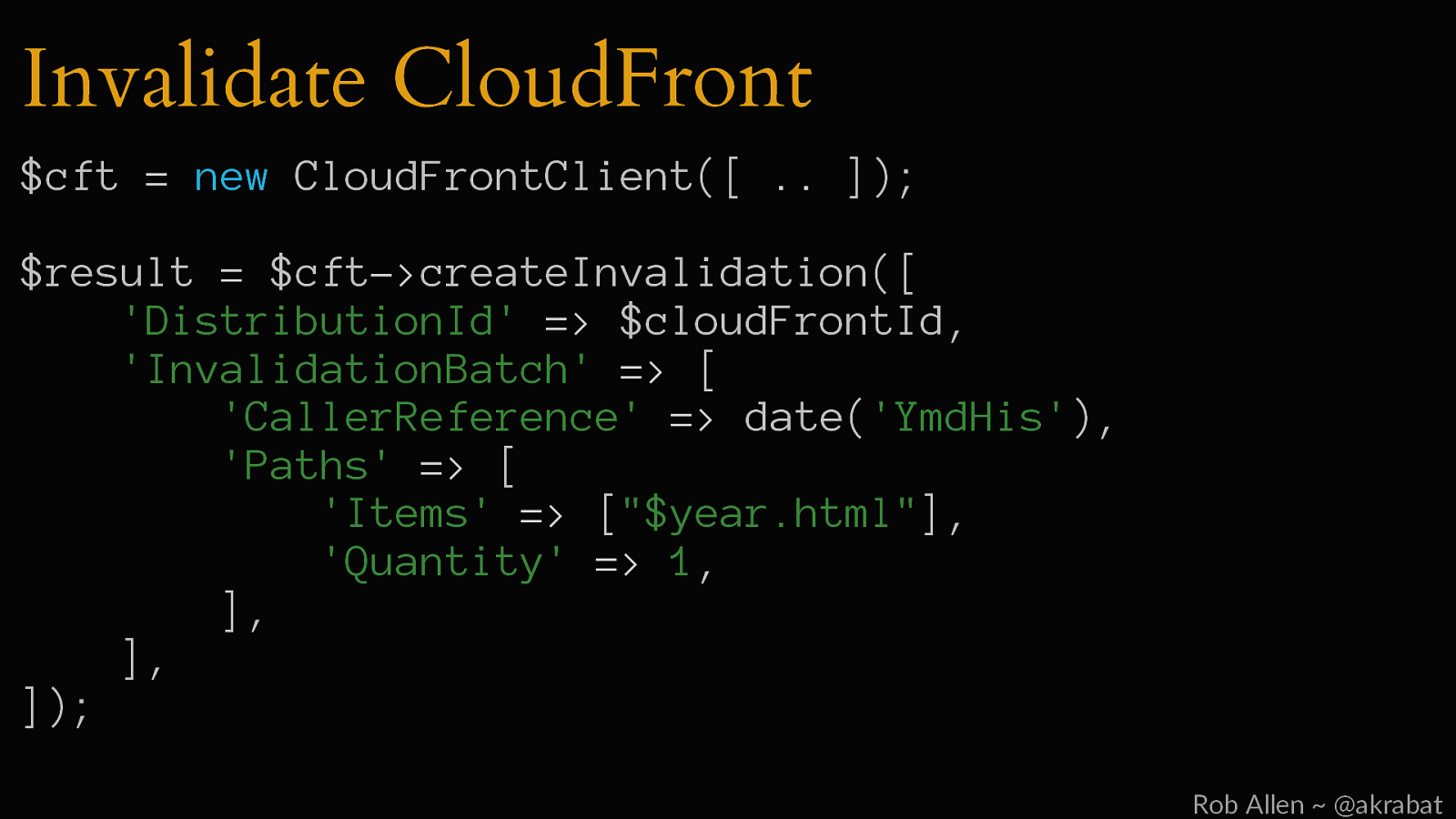
Invalidate CloudFront $cft = new CloudFrontClient([ .. ]); $result = $cft->createInvalidation([ ‘DistributionId’ => $cloudFrontId, ‘InvalidationBatch’ => [ ‘CallerReference’ => date(‘YmdHis’), ‘Paths’ => [ ‘Items’ => [“$year.html”], ‘Quantity’ => 1, ], ], ]); Rob Allen ~ @akrabat
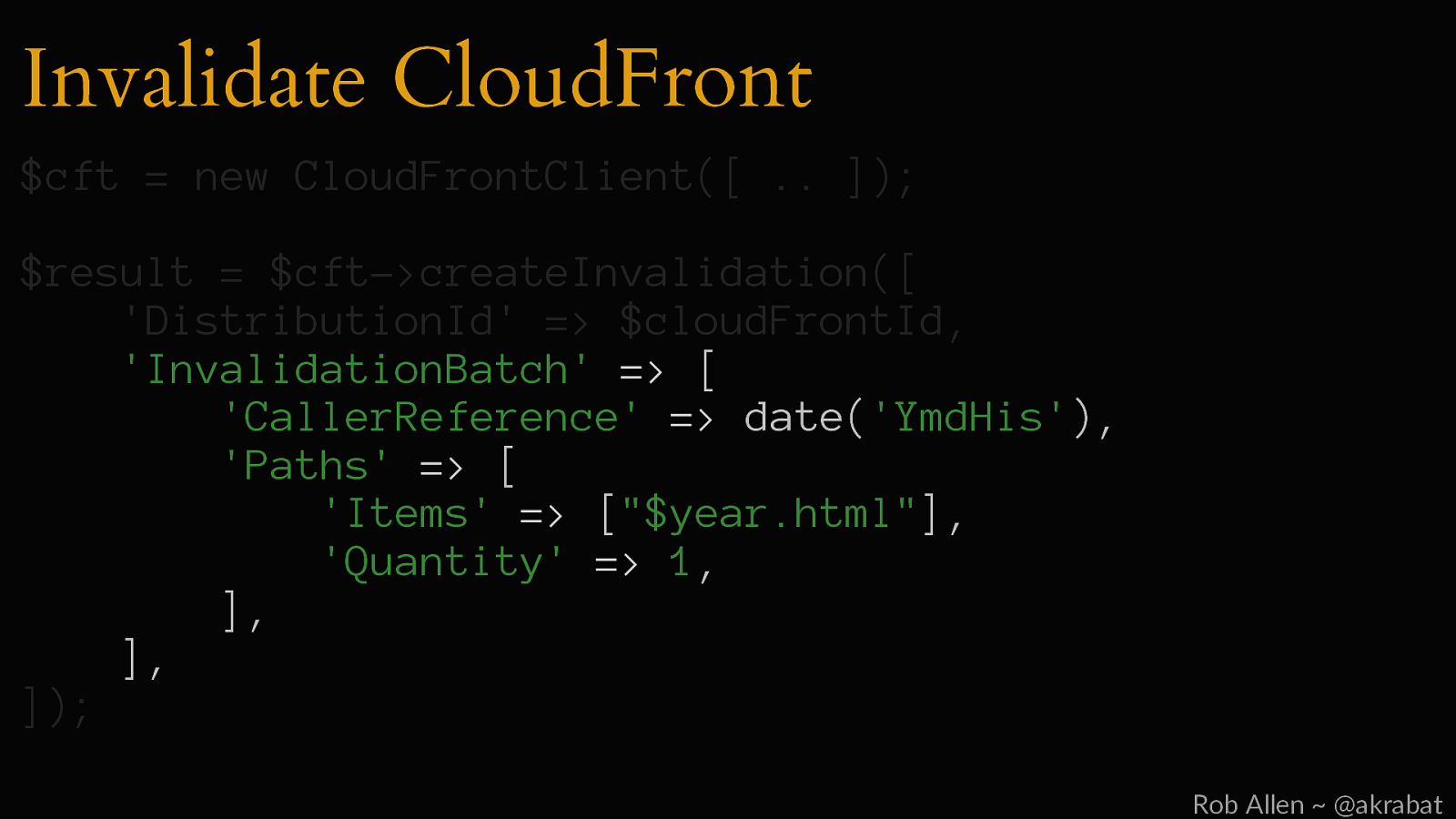
Invalidate CloudFront $cft = new CloudFrontClient([ .. ]); $result = $cft->createInvalidation([ ‘DistributionId’ => $cloudFrontId, ‘InvalidationBatch’ => [ ‘CallerReference’ => date(‘YmdHis’), ‘Paths’ => [ ‘Items’ => [“$year.html”], ‘Quantity’ => 1, ], ], ]); Rob Allen ~ @akrabat
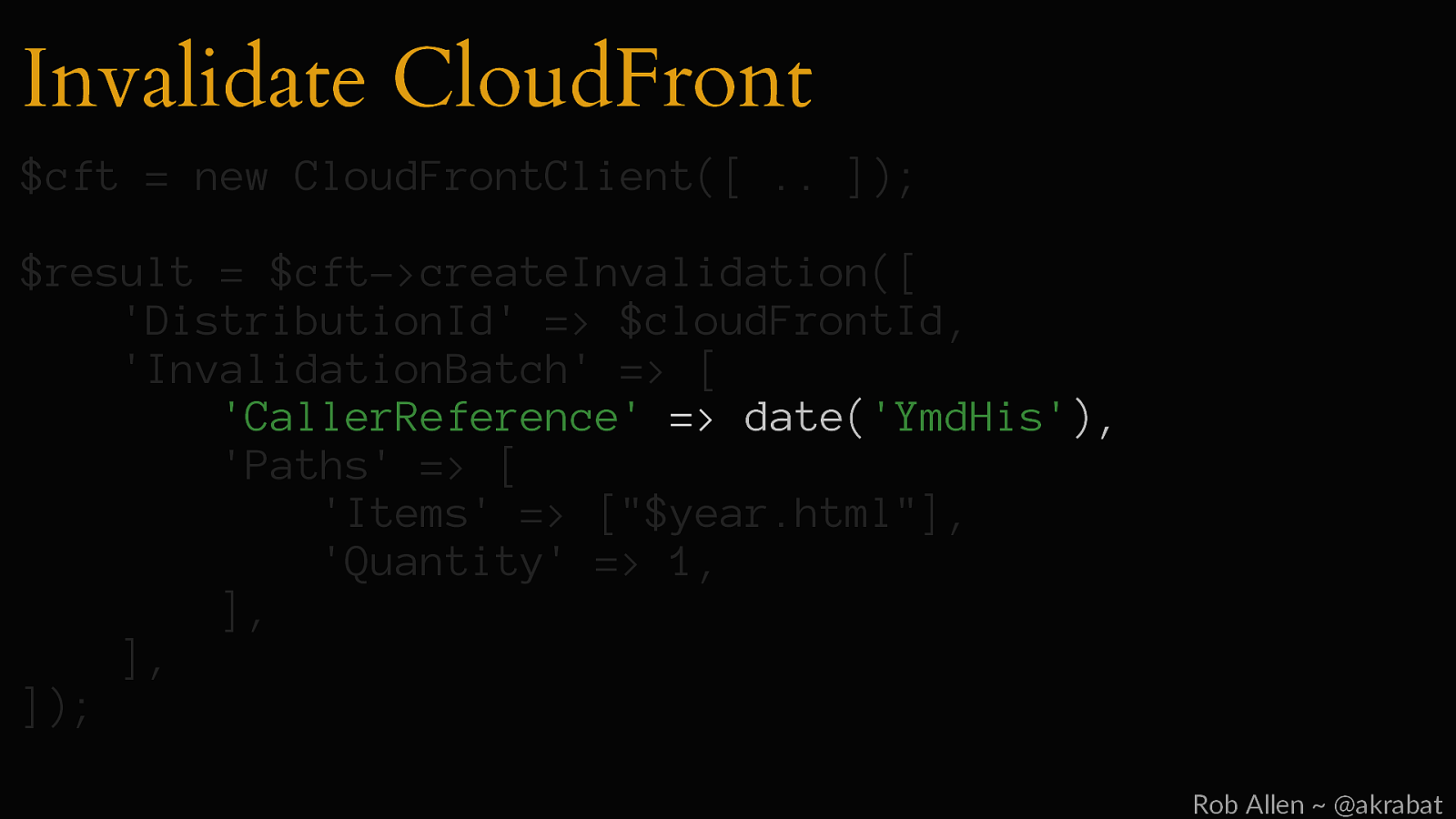
Invalidate CloudFront $cft = new CloudFrontClient([ .. ]); $result = $cft->createInvalidation([ ‘DistributionId’ => $cloudFrontId, ‘InvalidationBatch’ => [ ‘CallerReference’ => date(‘YmdHis’), ‘Paths’ => [ ‘Items’ => [“$year.html”], ‘Quantity’ => 1, ], ], ]); Rob Allen ~ @akrabat
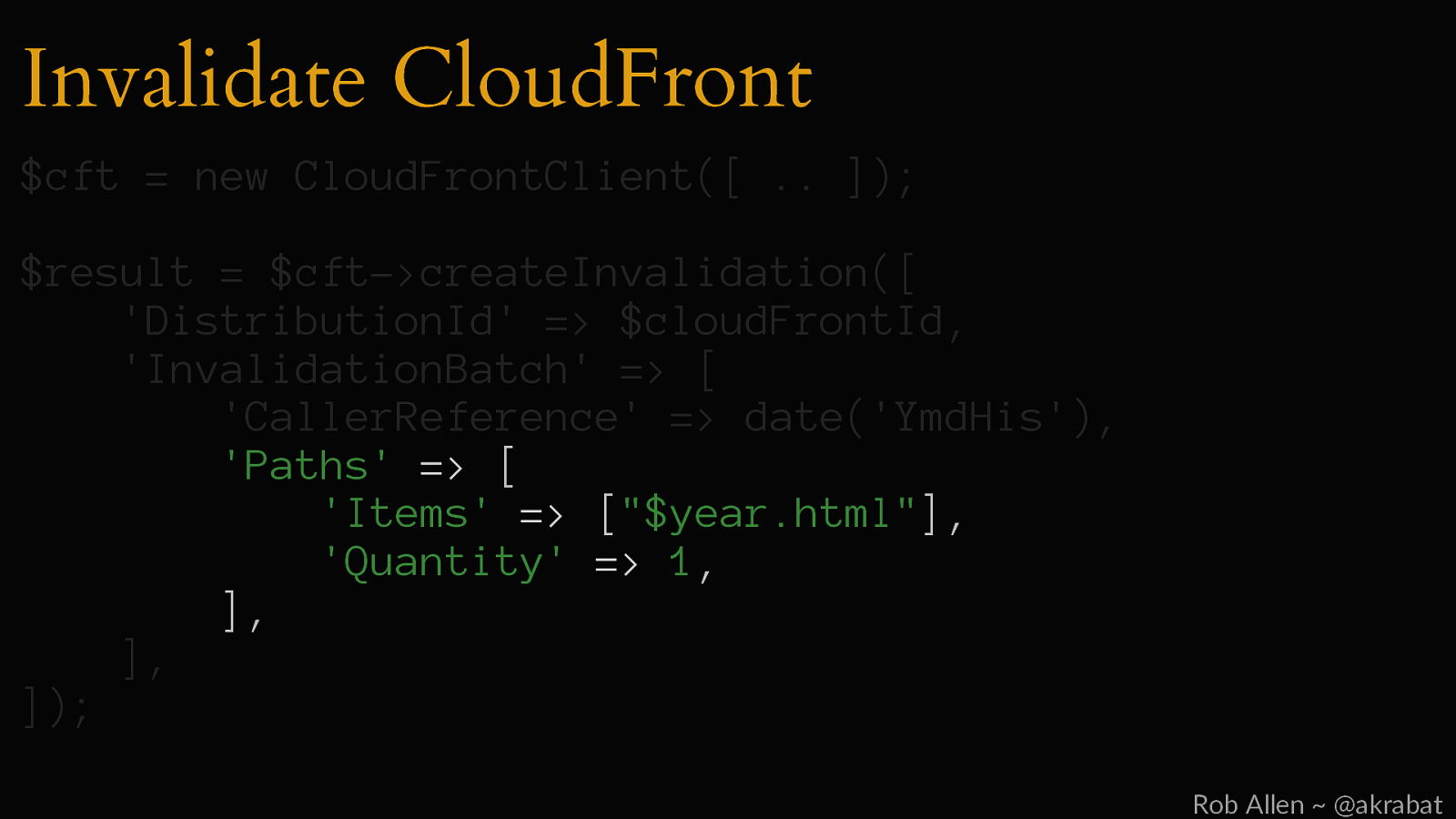
Invalidate CloudFront $cft = new CloudFrontClient([ .. ]); $result = $cft->createInvalidation([ ‘DistributionId’ => $cloudFrontId, ‘InvalidationBatch’ => [ ‘CallerReference’ => date(‘YmdHis’), ‘Paths’ => [ ‘Items’ => [“$year.html”], ‘Quantity’ => 1, ], ], ]); Rob Allen ~ @akrabat
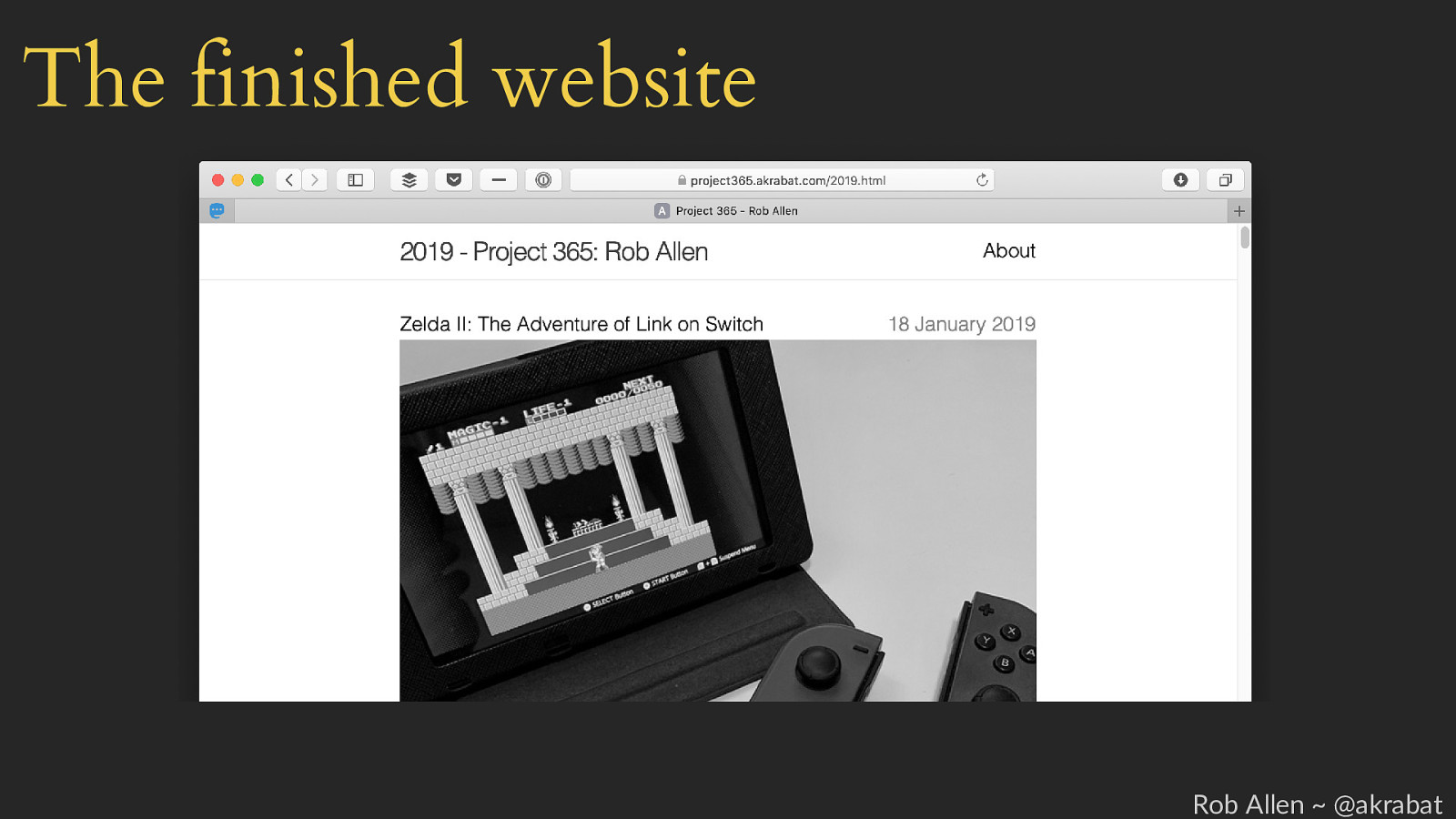
The finished website Rob Allen ~ @akrabat
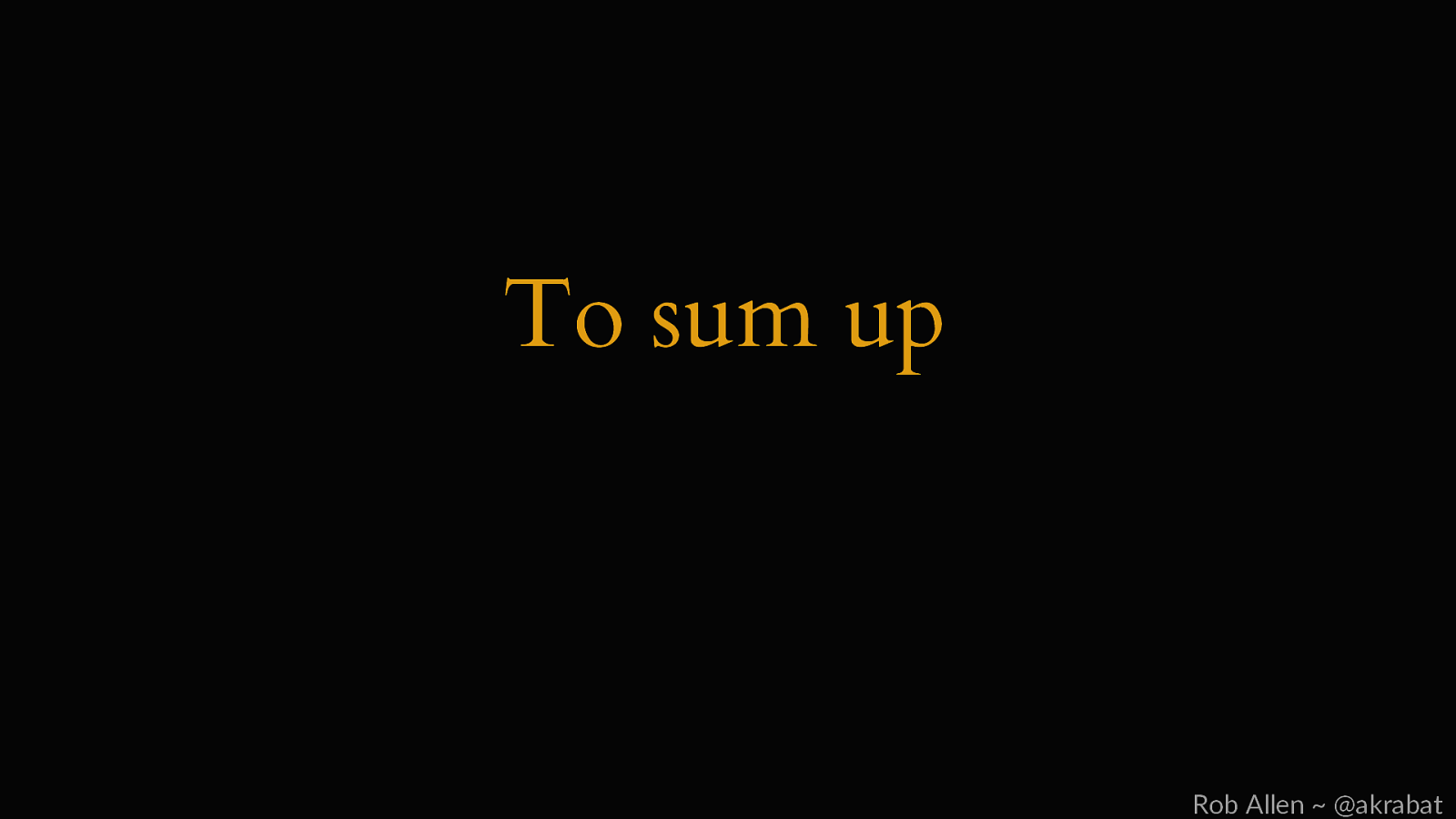
To sum up Rob Allen ~ @akrabat
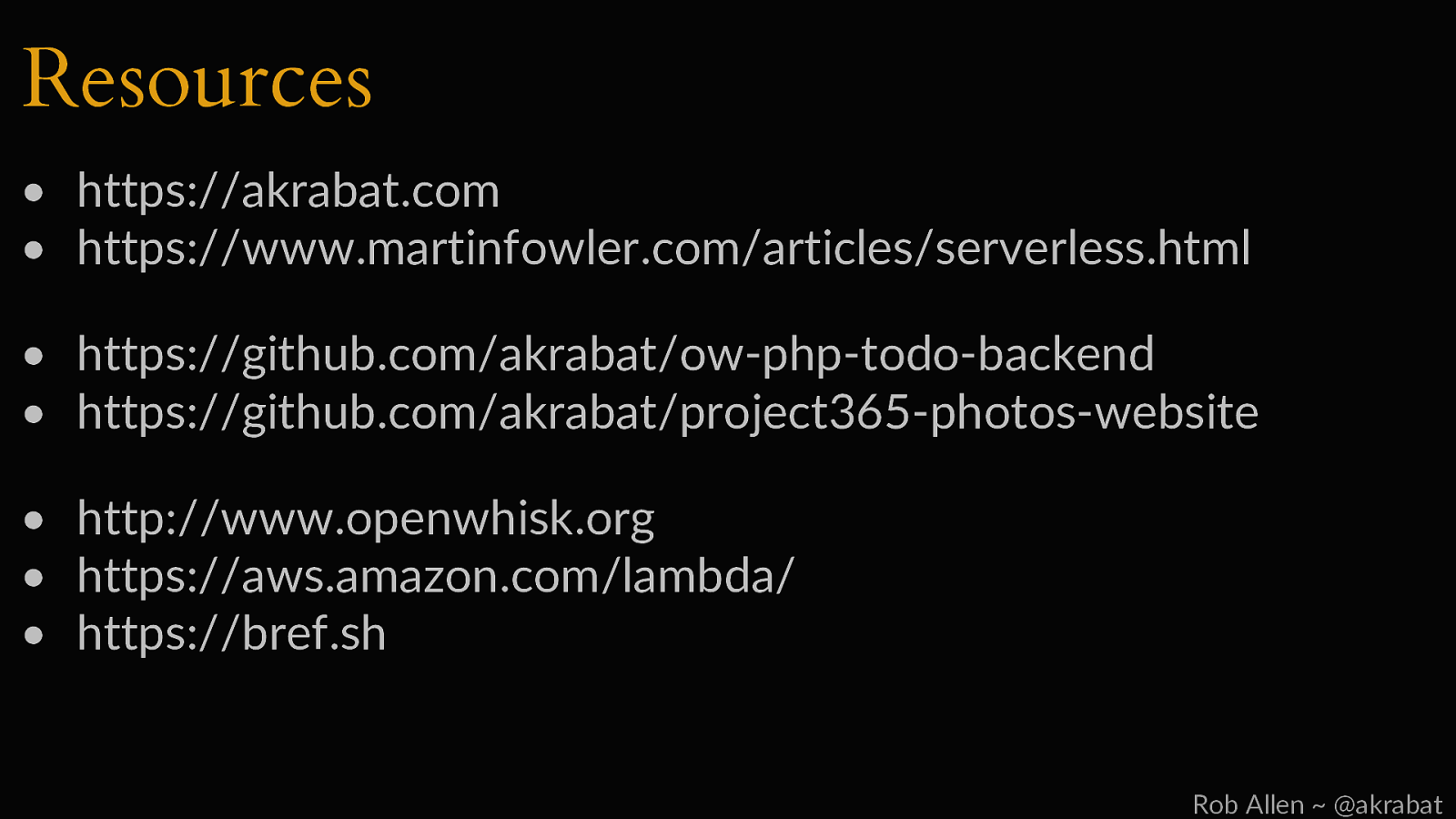
Resources • https://akrabat.com • https://www.martinfowler.com/articles/serverless.html • https://github.com/akrabat/ow-php-todo-backend • https://github.com/akrabat/project365-photos-website • http://www.openwhisk.org • https://aws.amazon.com/lambda/ • https://bref.sh Rob Allen ~ @akrabat
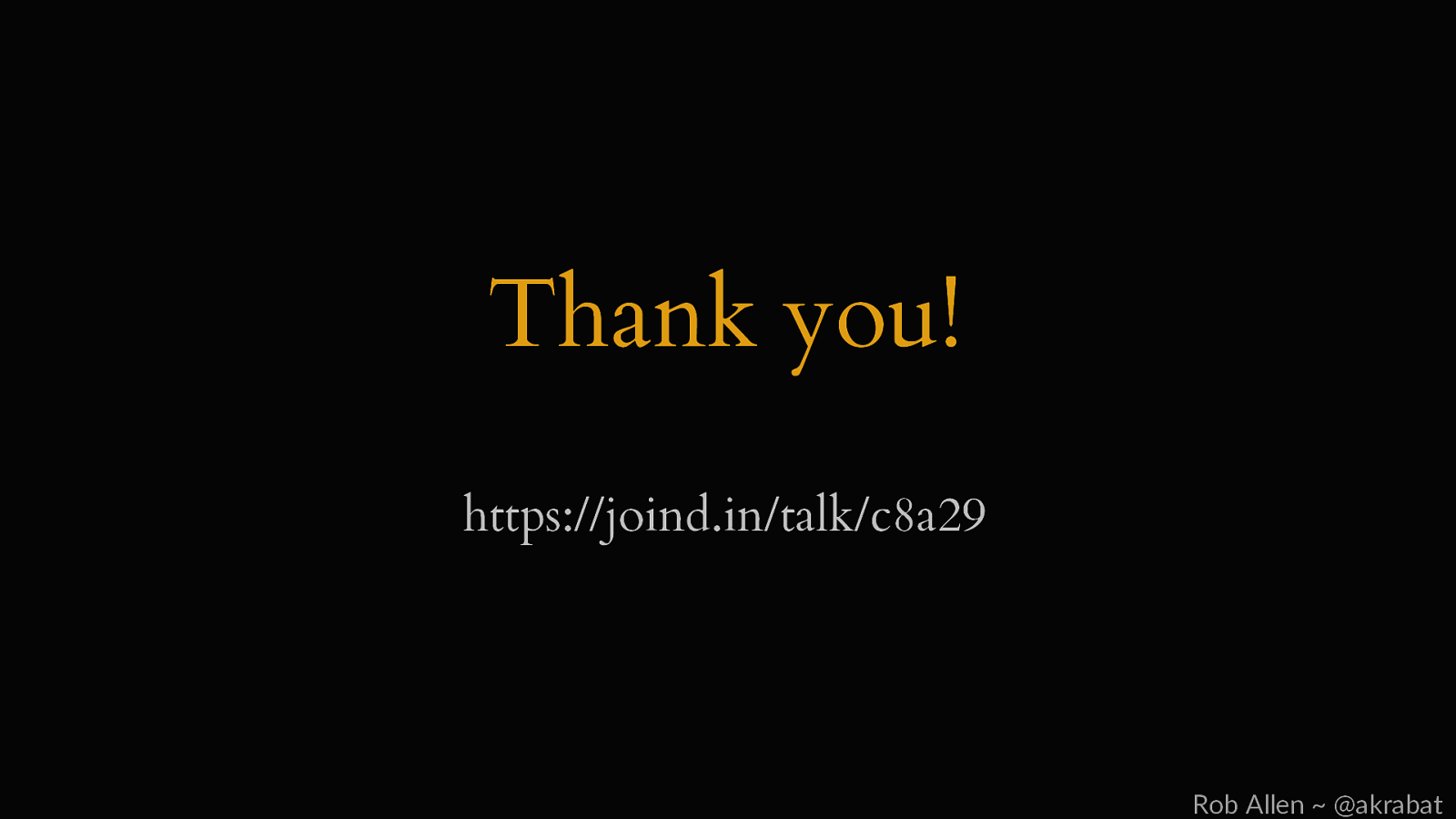
Thank you! https://joind.in/talk/c8a29 Rob Allen ~ @akrabat